#it’s just been so different from the first book rollout
Text

#working girls!#book 2 hype#okay this is everything I could find#the paper dolls are so cute I would buy those#you can tell the PR went out this week all their friends have been posting about it#picture thanks to Darien Darling#can’t wait to finally see the drippin outfit it’s been a year since she teased it#I’m going to say something controversial yet brave in these hashtags…#does anyone else feel like they’re doing the bare minimum promo for this?#it’s all been official posts and not as personal feeling?#maybe the pre sales are so good they don’t have to#just crazy it comes out so soon and we don’t know much lol#it’s just been so different from the first book rollout#idk I just know they’re burned out from writing and it makes me sad they don’t seem as enthusiastic#this might be the last chance to read K’s writing for awhile
14 notes
·
View notes
Text
So my dad is somewhat of a computer wiz and I asked him about some of the tech stuff in the magnus protocol
my dads says..
"I was involved in a rollout of about 1,000 NT4 workstations over four campuses back in the day (mid to late 90s)
Our machines started at Pentium 120 with 32Meg of RAM and 1.2G hard drive in a mini tower case. Apart from the drive bays in the case front for 3 1/2 floppy disk drives and CD ROM drives they don't look all that different to a small gaming pc today.
The mice still have balls though, the keyboard have big 5 pin DIN plugs but otherwise are just as dishwasher safe as modern ones.
If connected to a network you are very likely to find its Novel Netware 4.1. The networking will look like a thin black cable strung from machine to machine with a little silver T shaped connector on the back of each one, apart from the first and the last they have 'terminators'.
You probably won't be connected to the internet yet, there is probably no TCP/IP on your LAN at all, only Novel IPX. The ZenWorks NT4 workstation management tools from Novel are sublime, it take Microsoft quite a while to copy them.
If you are in our publishing class we will be teaching you Photoshop, Illustrator and Quark Express. If you are in our business course we will be teaching you Office 97 with that bloody paperclip. We will also be teaching you Groupwise, Microsoft haven't copied that off Novel yet so there isn't any Exchange.
If you have email its probably Pegasus, maybe early Eudora. Its unlikely you can email out of the organisation you are in. Internet connected mail is still to come, mind you so is any interoperability between mail systems. You expect attachments to work?
We still taught some things on Windows 3.1 so our machines all boot from the Lan initially to fetch the boot menu. You can choose Windows 3.1, NT4, in some classrooms Win98, or you can re-image you machine if its broken. Thats all done in assembler in the boot sector on the network boot disk image, theres no PXE yet.
Internet arrives one day in the form of a product called "Instant internet", it will share its single built in 36Kb dial up modem with a whole classroom of only IPX connected NT4 workstations if you install the Winsock32.dll file that it comes with.
You are probably looking for Mosaic or early Netscape if you want a web browser, Altavista is likely your search engine.
Better things are coming though soon we have a whole 128K ISDN service to share with about 10 classrooms, we have TCP/IP on the LAN now. Your classroom is still going to have to book when it wants internet access though, as that's still woefully inadequate.
I think the Macs are System 8 or 9 they have not made the jump to the unix kernel of OS X yet, they keep my colleague busy, she seems to be reinstalling the System folders on them on a daily basis.
One day you find I have changed the default home page for all the machines to Google Beta.
My job is done, the world as we know it has been ushered in."
Dad worked In TAFE (only Australians will get that lol) for a few years as well as other tertiary education providers.
This is probably not going to be very relevant for anyone but I figured having some sort of info available could be helpful for other people's writing, fanfic or whatever.
Feel free to send asks for any clarification or further info
29 notes
·
View notes
Text
My Review of Tales of Little Women
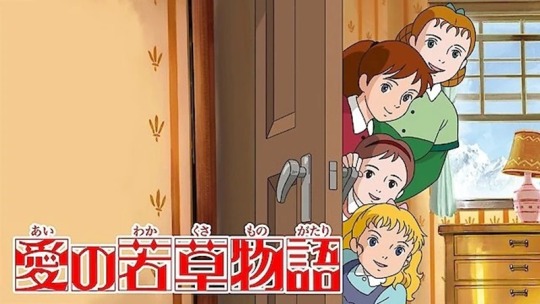
Do I want more World Masterpiece Theater? Yes, please. Okay, let’s watch the one story that is a world-renown novel that’s been adapted over and over for the past 100 years.
Even if you have never read the Louisa May Alcott novel, there’s a good chance you have at least heard about the story. It has been adapted many times with stage productions, TV mini-series, musicals, and yes, the movie adaptations. There are four prominent movie adaptations that are well-known and three of those were either nominated or won an Academy Award. One with Katherine Hepburn, one with Elizabeth Taylor, one with Winona Ryder, and a more recent one with Emma Watson. Everyone has their go-to version or they just stick to the novel and fuck off with them movies.
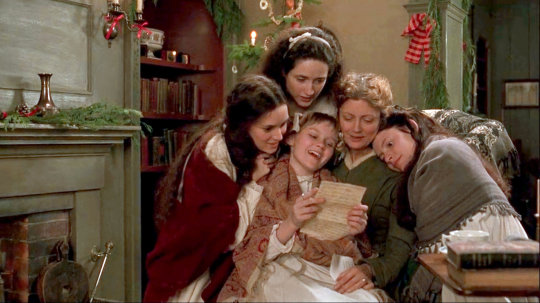
Asking my mother, she told me that she prefers the novel, but thought the 1994 version was fine by her book. Me, I have never been able to get my hands on any film version prior to watching this anime. I didn’t go see the 1994 version with my mother. I was 8 and my attention was squarely on The Lion King and Clueless. And as for reading the novel. Um, mumble, mumble, insert something about my Autism as an excuse why I never read this…You know, some shit like that. But I digress.
There were a few anime adaptations of Little Women. There’s the first one from 1981 animated by Toei. Then, there’s the 1987 adaptation done by Nippon animation. And finally, the sequel to the Nippon version in 1993. For this review, I will start with Nippon Animation’s version due to availability’s sake. Yeah, I said the word “availability”. This series made it to the U.S. If I’m able to get my paws on the Toei version of Little Women, I might review it one day. That version is unrelated to the Nippon version. Same story, different rollout. Okay, let’s get started!
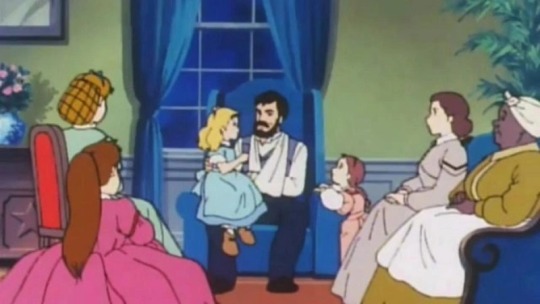
This story follows the March sisters in their daily lives living in the time of the Civil War. These little women live at home with their mother, Mary March while their father is off fighting for the Union in the war. First, there’s the eldest daughter Meg. She is coming of age where she’s close to making important decisions for her life. Next is Jo, she’s spunky and a tomboy who has ambitions of becoming a great novelist one day. After that is Beth, who is shy and timid but won’t hesitate helping anyone or anything in need. And then, the baby of the family Amy. I know in most versions, Amy is more fleshed-out with a love for art. Here, she loves art…she’s just a very precocious brat.
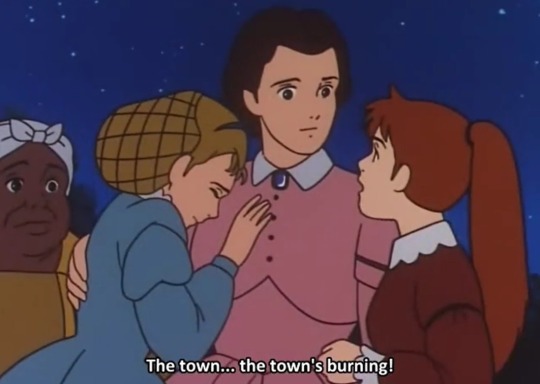
Trouble arises fast as the battle between the union and the confederacy was getting closer to where the March family lives. Before they knew it, they left everything they knew behind to go north to Newcord. Not before the confederates set the town of York on fire! After leaving their old life behind, the March family made their way to the new town up north where they meet new friends and connections. The March sisters are doing the best they can in their day-to-day lives and shooting for their own personal goals.
BETWEEN THE SUB AND THE DUB: I never thought that I would ever see a legitimate dub for a World Masterpiece Theater anime. But here we are! This anime was licensed and dubbed by Saban Entertainment back in the day. Does that name ring a bell? Think of Digimon Adventures, Samurai Pizza Cats, and so many Power Rangers. This even landed a spot on HBO in the late 80s and early 90s. And yet somehow, I never ran into this series growing up and we had HBO. I only remember watching Little Lulu and Lifestories: Families in Crisis. Yeah, I’m a complicated batch of a person. Today, it is available to watch on Amazon’s Freevee. However, and I cannot believe this has to be said about something not Pokemon related, only the English dub is available for streaming. Keep in mind that this only applies to the 48-episode series. The 1993 sequel was never licensed or dubbed.
As usual, the Japanese cast had many veterans from other World Masterpiece Theater classics like Eiko Yamada. As for the English dub…ooh boy, you can tell that this is early, early, back in the day, cringe AF, stiff as a board English dubbed. Add to that, they redubbed the opening and ending themes.
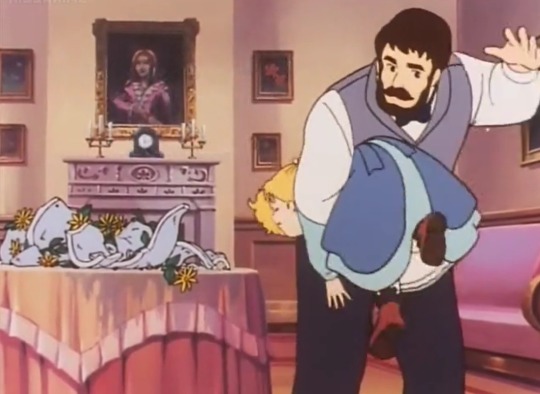
Yeah, I don’t think the west was willing to have the original opening theme as 10 seconds of it had Amy getting spanked by her father.
Instead, you get an English dub 45 second song of the synopsis. While it was easy for me to watch this dubbed, it was difficult to find who voiced who. Even the credits at the end of the episode show me nothing. Granted, there are a lot of familiar anime voice actors like Wendee Lee, Richard Epcar, Dave Mallow, Barbara Goodson, and Rebecca Forstadt.
If you’re anything like me, you can recognize Forstadt’s voice in nearly everything she’s in. She’s usually found playing little girl characters. And she continued doing that for the next 30 years after playing Amy here. I’m not joking, she did that up until her retirement. Seriously, all her characters sound the same! Amy March is just Suiseiseki, who is just Mihoshi, who is just Rika Furude. That’s not something I want to say in a review. I wish I could list out the English cast here, but only Jo and Amy’s voice actors are known and the others are a mystery. Instead…can I go off on Hannah’s voice for a quick sec? I love Barbara Goodson so much. This role…NOOOO.
JAPANESE CAST:
*Meg is played by Keiko Han (known for Prof. Ivy on Pokemon, Luna/Queen Beryl on Sailor Moon, and Mito on Hunter x Hunter)
*Jo is played by Eiko Yamada (known for Mai on DBZ, Anne from Anne of Green Gables, Tsubasa on Ranma ½, Lavinia on Princess Sara, and Yvonne on Trapp Family Story)
*Beth is played by Mayumi Shou (known for Young Chi-Chi on Dragon Ball)
*Amy is played by Rei Sakuma (known for Daisy on Pokemon, Jiji on Kiki’s Delivery Service, Shampoo on Ranma ½, Funaho on Tenchi Muyo, and Peorth on Ah My Goddess)
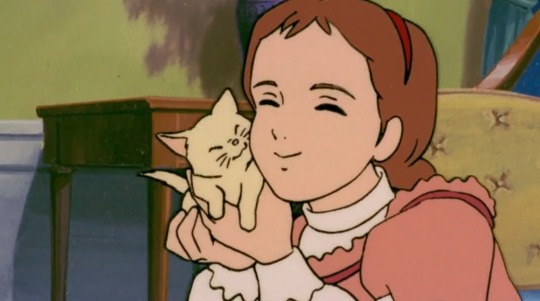
FAVORITE CHARACTER: Hands down, Beth wins me over from episode 2 when she saves Milky Ann. She gets an automatic pearl point.
DISLIKED CHARACTER: You know what? It would be so easy to put up the easy answer here like Aunt March’s weaselly nephew David. I agree, he is detestable. And there are several instances where I wish Jo would have just slugged him in the face. But one, nagging, pesty, sneaky little brat kept creeping up on my annoyance meter.
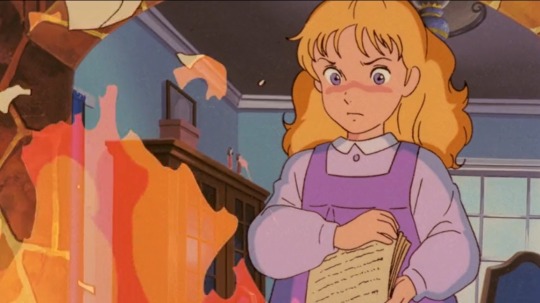
Amy March, the youngest of the March sisters. When I saw that an episode was going to be titled “Amy’s Revenge”, I thought that she was going to take revenge on that snot-nosed classmate of hers that tattled and got Amy in trouble. This happened the episode before this one and I was ever-so curious to see what was going to happen. Much to my dismay, it was not that. This revenge came at the end of the particular episode and it wasn’t to someone who deserved it, it was to her own sister.
Because Amy was getting over a sickness, her sisters Meg and Jo forbad Amy from going to a play they were invited to. It was absolutely reasonable. Amy wasn’t over her sickness and they only had the two tickets for the elder siblings. I know I shouldn’t hate on Amy because she’s a little kid. But speaking as a late-30’s, single lady with no babies, fuck them kids and that brat needs a spankin’! Because Amy was told to stay home and wait another day, Amy gets angry at her sister Jo. So much that she goes up to her room and burns her entire story that Jo wrote in the fireplace.
This here is the moment where all my sense and reason for Amy went right the fuck out the window. I know I’ve been mean to little children in shows of the past and should rethink my logic because they’re kids and don’t know any better. I know that Jo and Amy were able to mend their relationship after Amy almost drowned, but that was just wrong of Amy. That action alone sky-rocketed Amy to the top of the “I fucking hate you” mountain. Before, I was just annoyed by her because Amy’s a little kid. This, did not help her win any points with me.
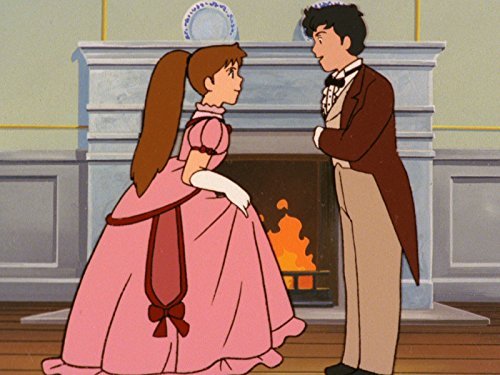
SHIPPING: Going into this, I’m curious to see if Jo winds up with Anthony of the newspaper or the boy next door Laurie. I’m leaning on Laurie heavily since I think Anthony is an anime-only character. So, I hope nothing changes…
Medea reads what really happens with Jo x Laurie
I really should start the original source material before jumping into the anime. Silly Medea, when will you ever learn your lesson? Never. I never learn. At least I was right about who Meg was going to end up with. I actually saw that coming a mile away. But the Jo x Laurie thing…I’m not going to be over this for a while. Jesus “Tap Dancing” Christ, they better not show…Laurie marrying HER. I know it works in the novel, just not in the anime. As it turns out, readers were also not digging Jo’s decision of turning down Laurie and then marrying this new guy. I guess Alcott saw Jo and Laurie as nothing more than friends.

Let’s talk about Meg now. Meg has been constantly reminded from several people throughout the series to marry a rich man. Mr. Brook is a kind man, but not one of wealth. And suddenly, I’m reminded of the daughters from Fiddler on the Roof in this instance. Tevye wants his eldest to marry the butcher, but she listens to her heart and marries Motel the tailor. But I digress.
Remind me if I ever talk about Fiddler again to make sure I have a shot of hard liquor in my system.
Well, time to drop the 150-year-old spoiler here. Jo meets and marries a fella while in New York. Fritz doesn’t even appear in the first series. Despite many objections and everyone’s opinion on the matter, Meg and Mr. Brook are engaged at the end of the first series and eventually married. Laurie is turned down by Jo, but still winds up with one of the March sisters. He marries Amy. And as for Beth…she’s in the loving comfort of Sem E. Terry.
Medea, that’s morbid even for you.
ACCURATE OR NOT: Ooh boy, let’s see if I can keep my uncomfortable faces and collar tugs out of this conversation.
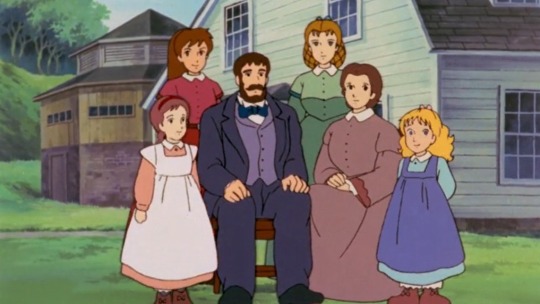
*The ages. I can’t recall how old Meg and Jo are in the anime, but I figure they are around the age of 16 and 15 like in the book. Can’t say the same for Beth and Amy. There’s no way that their anime counterparts are 13 and 12. Beth, maybe! Amy in the anime is definitely elementary school-aged. And this here is the reason why I will never accept Laurie hooking up with HER in this anime. I’ll accept it in nearly every other media. Just not in this adaptation.
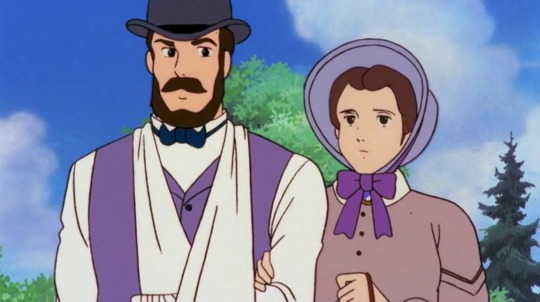
*There were several name changes between here and the novel. Most notably are the March parents, Richard and Margaret. In the anime, they are renamed to Frederic and Mary. But only people outside the family call her Mary March. She’s still called Marmee by the girls. While I’m still on the subject of name changes, John Brook’s name was different in the Japanese version. They changed his name to Carl Brook. But then, his name turns back to John in the sequel. Okay, give a point to the Americans here.
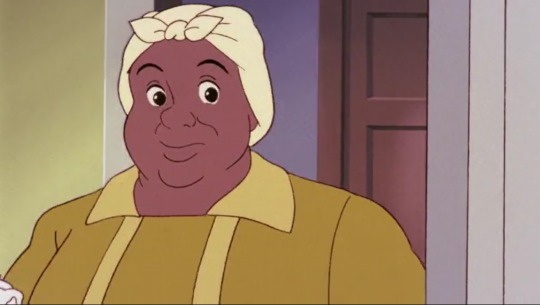
*Hannah the maid…I knew something was going to make me tug on my collar. Okay, let’s rip off this bandaid. In the novel Hannah was really Irish and Caucasian. I’m raising my eyebrow at this fact here. I know sites say the change could have been made to show the audience the plight of African Americans during the time. So, I’ll calm down for now. But then I see Asia the cook in the sequel…I got nothing. Really couldn’t find anything on her. I’ll still stay calm, but my eyebrow is going to stay up for a while.
*There of course is no town named Newcord. That was for some reason changed from the novel. It’s Concord! The name of the town is Concord! Don’t ask me why they changed it to Newcord in the anime. And don’t ask me why it suddenly changed back to the name of Concord in the sequel.
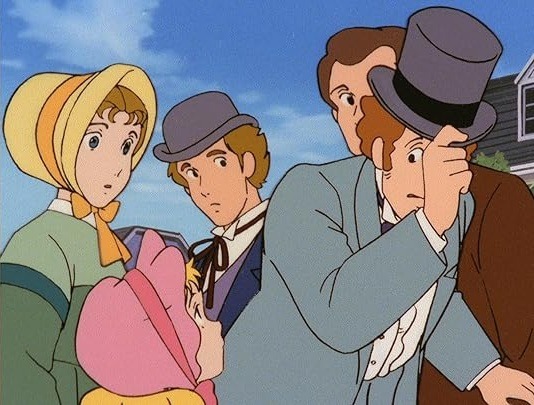
*There are several characters not in the novel. Yes, that includes Milky Ann. It’s always the animals. To be fair, several adaptations did have cats. There were several anime-only characters like John, the runaway slave and several people in Newcord like Anthony and Mr. Murdoch. Most notably would have to be Aunt March’s nephew, David. Thank God, because I don’t think I can go through watching all four movie adaptations knowing this chizzler is in it.
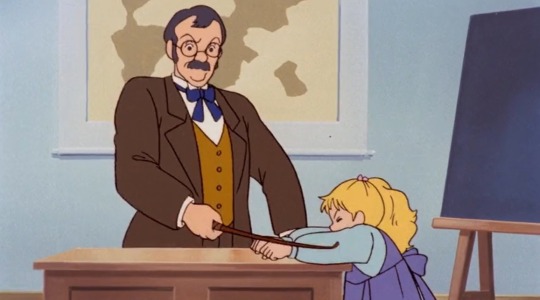
*Amy was not yanked out of school after her teacher punished her. In the novel, after that incident with the treats and the scolding, Marmee took her daughter out of school to be home-schooled. Here, it seems that Amy stayed in school.
ENDING TO THE FIRST SERIES: If you watch the series on Amazon’s Freevee, you’ll notice that they split the series into four parts. Each part has 12 episodes. I know this isn’t Amazon’s doing, but each part starts and ends with something big happening that I just find that fascinating. Anyways, the start of the final 12 episodes came with some unfortunate news. The patriarch of the March family has fallen ill. Since the beginning, it’s been well-established that Frederic March was fighting in the Civil War. At this point in the story, he was injured and developed an illness on top of that. Marmee ends up going to Washington D.C. to be by her husband’s side, leaving the girls on their own. During this time an unfortunate incident occurred.
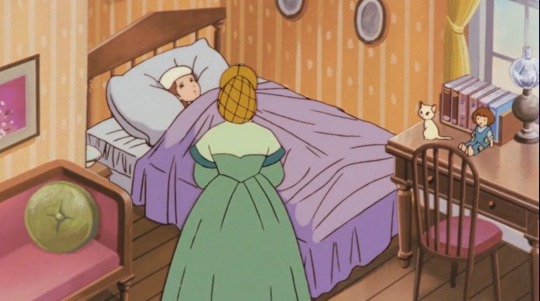
The girls took over the responsibilities their mother usually does. One of those tasks was looking after a poor family known as the Hummels. The quiet child Beth took on that job. As a result, she witnessed the death of a child due to Scarlet Fever. And then, Beth contracts it. This illness really took its toll here. Amy was sent away to stay with Aunt March since she’s young and never had the virus before. In a week’s time, Beth was severely ill. Marmee braved a snow storm to take the train to go back home. Even the doctor was pessimistic about Beth surviving. Luckily, Beth’s fever broke. Beth gets to live and none of her belongings were thrown in the fireplace because she infected the entire house.
And I thought the “Sem E. Terry” joke was too much. Medea, it is never okay to bring up Time’s Arrow from Bojack Horseman.
I apologize for nothing.
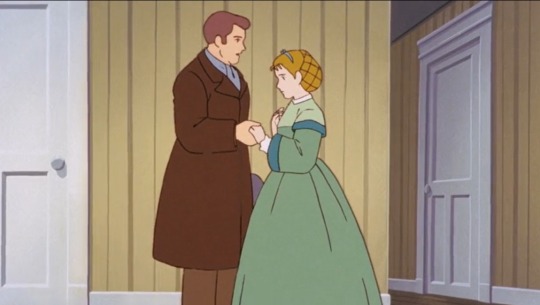
Meanwhile, there’s a lot of talk surrounding Mr. Brook and Meg. It was clear from the halfway point of the series that Mr. Brook had his eye on Meg. While Mr. Brook escorted Marmee to Washington to be with her husband, he would send notes back to the family and also special notes just for Meg. Unfortunately, Laurie decided to speed up the process as he’s in favor of them getting together. This did not go well. Meg could tell that Mr. Brook didn’t write a certain letter and got horribly upset by the ordeal. Jo and Marmee were also agitated by what had happened. Let the two love-birds figure out what to do. And that’s what they did! When Mr. Brook returned to Newcord, he told Meg he loved her and they end up engaged.
Meanwhile, Jo was asked by Anthony from the newspaper to go to New York with him. Keep in mind, Jo does go to New York later on, just not with Anthony because Anthony doesn’t exist in any other media. By the end of the final episode, Jo does go off to New York. Through some connections, she’s able to stay with a family friend and earn money by looking after their kids. This news seemed to go over well with the family. The only objectors were Aunt March and Laurie. Aunt March because she’s always going to find fault with everything. She highly objected to Meg marrying Mr. Brook. But Laurie, we know how he felt. It’s just that this series never had neither Laurie or Jo say anything romantic wise to the other.
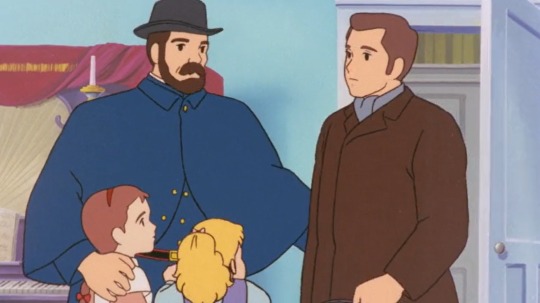
So, we’ve got Meg engaged to Mr. Brook and Jo going to New York. Anything else? Beth is getting stronger every day after her bout with Scarlet Fever. Frederic March returns from war. Frederic also makes amends with Aunt March after many decades. And the Civil War is finally over. Merry 1865 everybody!
Okay, so this first series gave us a happy ending. Let’s see how the sequel shits on that!
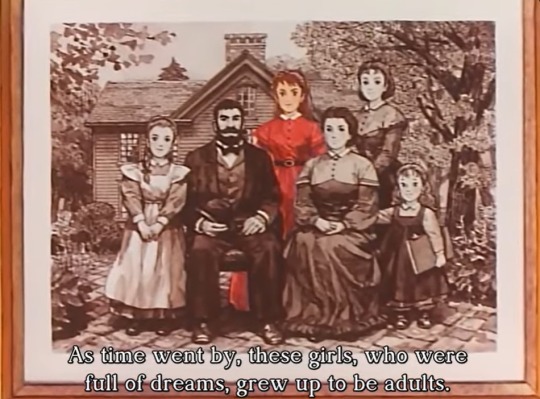
JO’S BOYS: Several years after the release of the first series, Nippon does a sequel to Little Women. For the literary buffs, it’s not what you’re thinking. The original 48-episode series mostly covered everything from Alcott’s first book to Little Women. Yeah, there’s a second book to Little Women that covers what happens to Meg, Jo, Beth, and Amy after the end of the Civil War. Jo’s Boys is more of Alcott’s book that came after that, “Little Men”. If you start this series immediately after watching the original series, you might get whiplash.
You turn on the first episode and you see a bunch of kids that don’t look familiar to you. Except for maybe one. One of the kids is definitely Meg’s child. There’s this guy who is definitely not Laure Lawrence with Jo. The town all of a sudden has the right name of Concord. And you’re wondering where Laurie, Marmee, Meg, Amy, and Beth are the whole time. Again, second novel! Why is Japan skipping over some major plot points from the second book?
Okay, time to drop some 150-year-old spoilers again. If this series isn’t going to cover it, then I will.
*Jo and Laurie never hook up. Jo meets a gentleman by the name of Fritz Bhaer while in New York. There was some back and forth if Jo and Fritz actually wind up together. They do. They marry and have two sons.
*Meg and Mr. Brook do marry each other and have twins, Demi and Daisy, as well as a baby named Josie.
*Laurie was of course friend-zoned by Jo. But he does end up getting together with Amy. They marry and have a child as well. Laurie for some reason his complexion seems lighter in his series compared to the first one. Also, don’t expect to see Amy nor this child of theirs in this series.
*Despite the sunny optimism we’re filled with near the end of the first series about Beth, that bout with Scarlet Fever really took a toll on her body. She dies a few years later.
*When Aunt March passed away, she left Jo her old home (which is known as Plumfield). This is when Jo and her husband Fritz turned Plumfield into a school and become the teachers. Plumfield is the main setting to this story.
THERE! Was that so hard to put these stories to ink and paper? If you are wondering if there are other adaptations to Little Men, there seem to be a couple of them. They’re just not as popular as the Little Women movies.
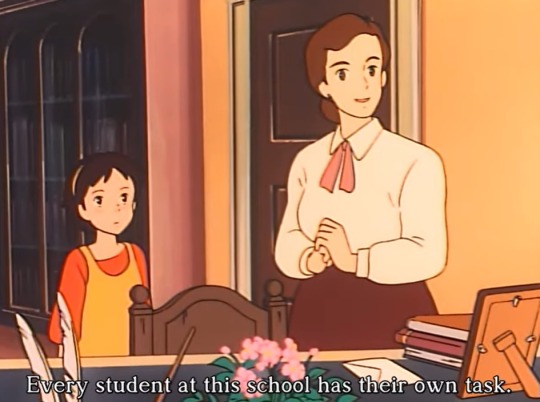
Jo March is now a teacher to a special school known as Plumfield along with her husband Fritz. Most of her students are either family members (like her sons, niece, and nephew), orphans, or special recommendations. One of those special students is a girl named Annie (Nan) Harding. Nan is a tomboy, possibly even more so than Jo was back in her younger days. Jo’s lessons are a little unorthodox when compared to other schools, but gives the students important life lessons and special responsibilities.
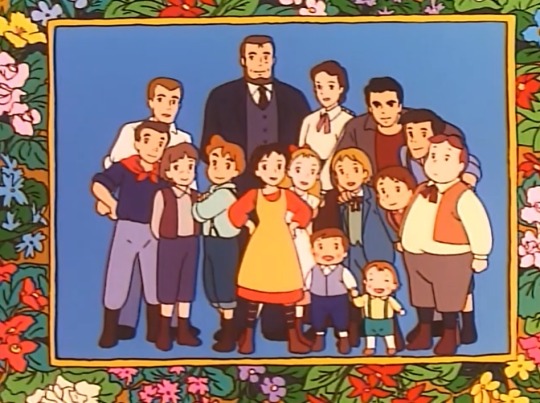
Aside from Nan, there are of course Jo’s two sons, Robb and Teddy. There’s also Jo’s niece and nephew, Daisy and Demi (Meg’s children). Fritz also has two of his own nephews there, Franz and Emil. There’s a kid named Tommy who’s a bit of a shit-starter and has a crush on Nan. A fat kid with some kind of stupid name like Georgie-Porgie or Double-Stuff Oreo. Ah well, it don’t matter. Some other boys that if you blink, you’ll forget them like Ned and Jack. Later in this series, we are introduced to two orphaned children, Nat and Dan. Nat was a meek boy with an ear for music. And as for Dan, he’s more of what you would call a “Prodigal Son”.
For accuracy notes, I only have one. It looks as though Nat and Dan came to Plumfield before Nan in the novel. In the anime, Nan is introduced first as she arrives to Plumfield in the first episode. Nat comes a few episodes later and Dan doesn’t get introduced until about 10 episodes in.
DO WE SEE THE ORIGINAL CAST HERE: Short answer, kinda. Obviously, any elders in the original series are dead and gone by now. Aunt March is definitely gone by this point. Laurie’s grandfather should be, but then I saw someone who looked like him at a funeral scene. I’ll leave it at that. At the beginning of this sequel series, we get an introduction kinda reminding us of the March family where we see Jo, her sisters, and her parents. In an early episode, Jo talks to Nan about her youth and mentions a moment when she worried Marmee. That’s all we get of Marmee. Every so often, there’s a visit from Laurie. He continues to be helpful to Jo as well as to the children at Plumfield.
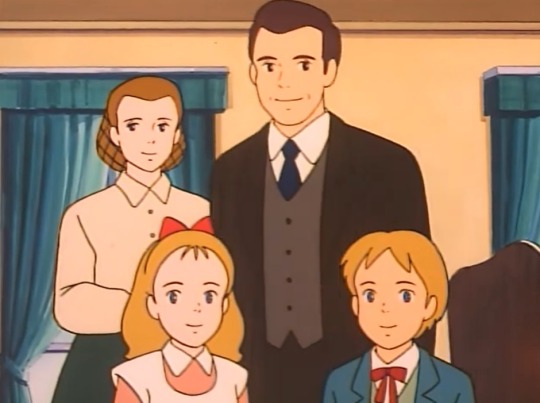
Now for the March sisters. We do not see a single sister until 33 episodes in (of a 40-episode series). Meg and John Brook finally appear to see their kids, Demi and Daisy. Beth gets no mention except for one sentence spoken by Jo near the end of the series. And as for Amy, one shot of her at a funeral and that’s that. After all the narrating she did in the first series and it amounts to just one second of screen time at a damn funeral. I know, I hated her in the first series, but give us a chance to see if she’s still a pain in the ass.

ENDING: Future choices. Jo has been giving these children every opportunity in the world to persue nearly any dream they chose to follow. These kids have learned and done so much. Nan decides she wants to become a doctor when she grows up. Although, throughout the series, she’s seen wanting to become different things. Just a few episodes prior, she wanted to be an engineer for a train. Let’s pause this dream for a second and see some familiar faces.
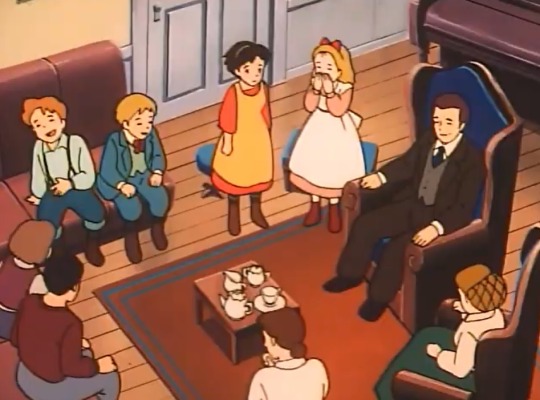
As it is Daisy and Demi’s birthday, Jo takes some of the kids over to her sister Meg’s home for a birthday party. Normally, it would be a big blowout with all of the kids from Plumfield. But due to Meg’s husband’s health, it’s best to keep it small. While watching this cutesy party, I can’t help but think during this episode that John Brook is going to die soon. By that episode’s end, he has a heart attack and during the following episode he passes away. Of course, everyone has taken the news differently. It’s just that it seemed to affect Nan more than one would think. As it turns out, John Brook had the same heart condition that took away Nan’s mother. With this, Nan came to kind of detest doctors overall and souring her outlook on becoming a doctor now.
Also, after John Brook’s death, Jo reveals what novel readers have known all along, that Beth died, Amy married Laurie, and Meg happily married John Brook despite him not being a well-off man. Yeah, thanks for just dropping those facts like they were nothing. But because of this sad moment, some of the kids are preparing for their own future. Daisy and Demi are ready to take on more responsibilities in the family now that their father passed away. One of Fritz’s nephews is ready to leave and go off to college. Tommy’s father has made plans to have his son study in Boston. And Dan is getting the opportunity to travel to Brazil. All of these sudden and upcoming changes really put Nan in a real depressive mood. But, she was able to shake it off after hearing everyone’s dreams for their future. Despite being sour about doctors after John Brook’s death, she decided to stick with that future plan. But there is a pretty big roadblock in the way of that dream.
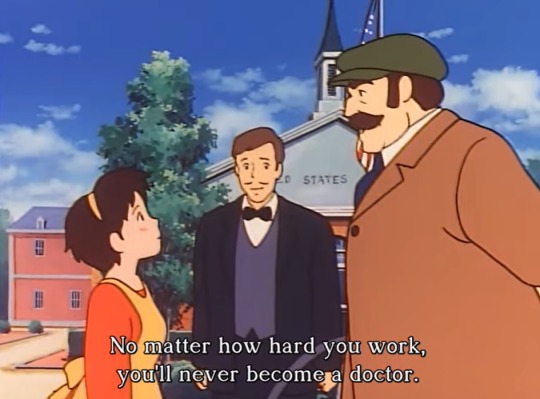
Keep in mind that this is the late 1800s. The idea of there being a girl as a doctor is considered absurd and unheard of. A scholarship was put up with thanks to the late John Brook to help aspiring young students wanting to become a doctor. Unfortunately for Nan, she’s far too young and even if she was of age, her gender comes into question. She even confronted the mayor of the town about this and was laughed off. Jo knows first hand about this kind of unfair treatment of young women, especially in the first series when she was putting out the short stories in the paper. What do they do?
Jo learns to ride a bike.
Mmkay…I guess that’s sticking it to the mayor because he made a crack about girls riding bikes too. I don’t expect much to change in the gender gap situation as there’s only one episode left and we’re a good couple of decades before women could even vote. Hell, it’s 2024 and there’s still no equal pay and old white men have more say about my cooch than I do. But I digress! The final episode was focused on the final day of Dan being at Plumfield. Besides Ann, Dan was a really big character due to his rough debut, all the bad vices he came to the school with, his fall from grace, his redemption, and now he’s going to travel around the world. I know this series showed so much of Tommy liking Nan, but I’m seeing more Nan x Dan.
Spoiler alert, I think the only ship that came to be in this series was Nat and Daisy.
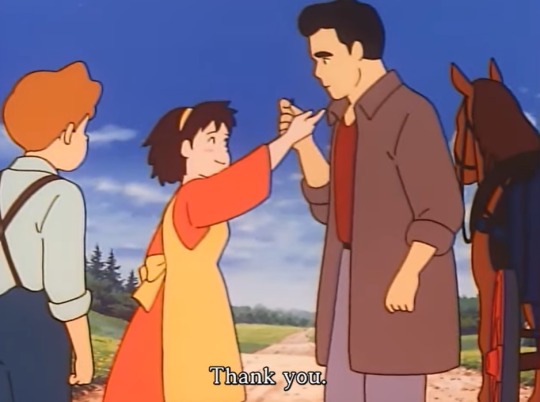
But Nan chasing down Dan to give him a ring before shouting goodbyes to him was a notable moment. In the final moment, we get to see all of these children grown up and doing what they want to do. Happily enough, Nan was able to become a doctor. I only say that because she’s wearing the lab coat to prove it. She stops by Plumfield after several years and meets with Jo. Also, we see adult Nan in the first episode too and…oh, that’s the end!
Okay, I was fine with both series by themselves. Yeah, it’s weird. After a while, I just came to accept Jo’s Boys to be its own separate story. And I guess that’s how the author and even the World Masterpiece Theater people wanted it. First, I’ll discuss the first series. I was curious to see what was going to happen next. It was a cute story that I just couldn’t stop watching it. Despite some of the lows the March family dealt with throughout the story, I’m satisfied that they ended things on a happy note. I know most of the film adaptations go further past where the anime left off, but I have a theory. Most of the World Masterpiece Theater animes try to end their animes on a happy note. We end with Jo starting a new life in New York, Meg engaged, Beth survived her bout with scarlet fever, and the patriarch to the March family home from war. I know, I constantly complain about so much being left out of Jo’s Boys, but I saw the first series ending fine the way it did. And now for the sequel…
I’m a little upset by the lack of time spent on certain characters. There were some children that really weren’t focused on as much. But the biggest disappointment would be Jo’s husband Fritz. We see him in nearly every episode and I just feel like there’s not much we know about him. I just saw this man as nothing more than a man with a bible in his hand and a beard on his chin.
If you understood this last sentence, you’re awesome.
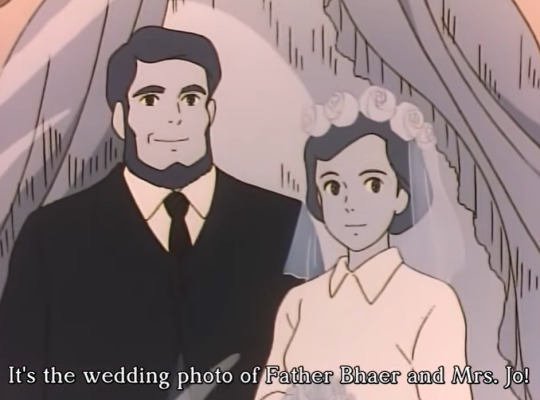
They could have at least had one episode dedicated to learning about how Jo met Fritz. A love story episode would have been perfect for Daisy as she’s the one who’s more domesticated and romantic than all the other students. There was an episode where the kids saw a picture of Jo and Fritz on their wedding day. How disappointed was I when I realized that this episode wasn’t going to consist a flashback of that? VERY! In that process, we could have learned more about Fritz’s two nephews who also have less done with them than Fritz. Be honest, does anyone even remember Fritz’s two nephews? The answer is no.
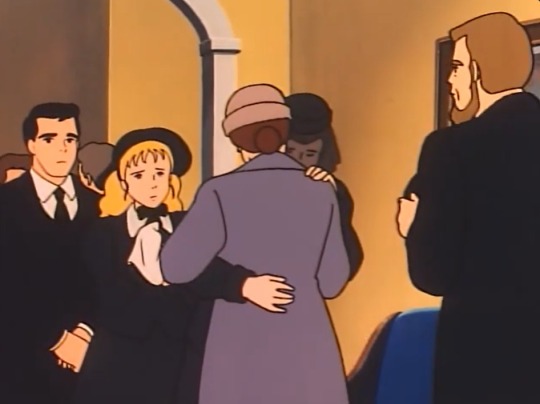
And yes, I was kinda annoyed at the fact that there was a major brush-off of all the characters from the original series. Amy only got one scene where we see her for one second at a funeral. Barely any mention about her being married to Laurie (whom we see every now and then). Meg has a happy ending in the first series only for shit to get real in the second series where we only see her worried for her ailing husband and becoming a widow seconds later. Only one mention of Beth is just unacceptable. Beth is best girl and I will fight anyone about that. And now, let me lay on Jo for a bit. There’s a giant leap in her character between 16-year-old Jo and 30’s Jo. Mainly, the sequel didn’t discuss Jo’s writings and we just leap into Jo being a teacher at Plumfield.
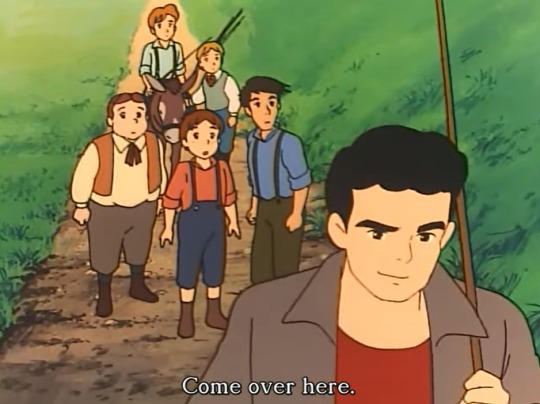
Okay, how about something nice? I really enjoyed all of the development of Dan. Don’t get me wrong, a lot of the kids did a lot to make me forget my unresolved gripes. It’s just that Dan pretty much carried this show. Dan was a bit of a jerk when entering Plumfield. He was living on the streets of Boston prior to this and had to steal in order to survive. Unfortunately, he didn’t soften up until doing some terrible things like give the other boys booze, cigars, and a hook for gambling. Oh, and almost setting the house on fire. After being sent away for a time, he does turn around for the better.
My advice is to treat both Little Women and Jo’s Boys as two separate shows, if possible. And if you want to watch the first Little Women series, Freevee through Amazon Prime has all 48 episodes available for streaming. You might have to do some digging around for Jo’s Boys.
Next anime…will NOT be chosen by me. This time, I went to a higher authority. I asked my mom which story should I choose, Heidi or Ann of Green Gables. Didn’t even need to think about it, she said Ann of Green Gables. This is the first time I ever asked my mom’s input in an anime. So, I hope she steers me right.
FINAL THOUGHT: My favorite of the four live-action films? Well, I was only able to get my hands on one of them. So, the 1994 version it is! It gets an extra point with me for having Mary Wickes.
#anime review#little women#tales of little women#josephine march#jo march#meg march#amy march#beth march#theodore laurence#laurie laurence#ai no wakakusa monogatari#fritz bhaer#little women jo's boys#nan harding
5 notes
·
View notes
Text
We are three years into Choices VIP and honestly, it is an impressive roll-out. Obviously there has been lots of conflicting feelings and pushback about it (and there are aspects I hate) but looking at the business element, they have done a great job with it.
First, they did a seven month roll-out, a limited testing phase. I remember how salty this made me, because I wasn’t chosen, but it obviously accomplished what it was supposed to. It let them test the VIP books and try out different price points, it also generated interest amongst the fandom. I was just about desperate to give them money by the time it went wide release.
And then in July 2020, it went wide release. They settled on a price point and released it. At the time of release, VIP came with 3 completed books and one weekly book. Over the course of the next year, there would be a total of 4 weekly VIP books and the completed books were very, very slowly released to the general fandom.
While this had the side effect of killing the fandom, I think PB was using this period to gauge interest and see how many of their big spenders would switch over to VIP. In mobile app games, the majority of the money comes from a small amount of players and PB’s main goal was likely to try and keep these players and move them over to VIP.
That first year saw a VIP book (Wolf Bride) make the list of the top ten grossing* books. This meant that VIP books could perform well, even when limited to a small section of the fandom. I think this was a critical step for what came next.
Early Access. Instead of having VIP exclusive books that are withheld from the general fandom for a year or so and are pretty much impossible to make sequels for, release every book as VIP for a short period of time. It means books aren’t in limbo for a year, making it easier to produce sequels, it also gives VIPs more content at once. Instead of one exclusive VIP book updating for a few months there are usually 2 or 3 updating at any given time.
It also lets PB test their market. Early access saw a ton of different genres released, including several that were frequently asked for on various social media platforms such as murder mysteries, vampires, zombies and spy thrillers. Early Access meant they could see once and for all who was playing these books. Was it free players saving their diamonds or the heavy spenders? By releasing the first half of the book to VIPs, they could gauge interest and profit and adjust their decision accordingly.
And then after a year of that, they announced the third and final phase: that all books, including sequels, would be VIP and there would be no general release books. This means they don’t have to balance VIP and wide releases and make sure there are always enough VIP books at any time, but it also means they got the answers that they wanted and they are confident that they will retain their paying base with the move.
I don’t agree with the choice to lock content, but I do think that PB played it pretty smart with how they did the rollout. Which is why I also don’t think they are going to change their minds any time soon.
*PB has never confirmed the criteria of their top 10, but if you look at the list, it seems pretty clear that it is based on revenue.
10 notes
·
View notes
Text
‘We were told the vaccine was safe - but what happened has been life-changing’
Robert Mendick
Wed, November 8, 2023 at 12:00 PM EST·10 min read
Kate Scott was called by the hospital three times to say goodbye to her husband. Three times she dashed to his bedside expecting him to die at any moment. Three times she thought she would be widowed, leaving her to bring up their two young children, the youngest just a baby at the time, on her own and without the “love of her life”.
But her husband Jamie was nothing if not a fighter. He pulled through and survived the “catastrophic” bleed on his brain. He is not, however, the same man. He can no longer hold down the job he had; can no longer follow complex conversations; his sight is impaired and the simplest things – such as reading a book – are no longer quite so simple.
“We are the luckiest of unlucky people,” says Kate. “We have both gratitude and sorrow. We are grieving for what we have lost but I am so grateful that each morning I can wake up next to him.”
Jamie can recall nothing of the four weeks and five days he remained in a coma in intensive care. “I don’t remember any of it. I don’t remember any of that time. The only thing I can remember is waking up and seeing Kate,” said Jamie.
He is now a test case; the first person to lodge a claim for damages against AstraZeneca in a landmark legal action that – should he win – could pave the way for hundreds of claims and damages that will run into the tens, if not hundreds, of millions.
Jamie was 44, fit and healthy and a keen 10km runner, when his life (and by extension Kate’s and their boys’) was turned upside down. A little over two years ago – on April 23 2021 – Jamie did what so many other Britons did. He went to his local GP clinic in the West Midlands, where the family live, for a Covid jab. It was in the relatively early days of the vaccine rollout and the UK was pushing hard the AstraZeneca vaccine developed at Oxford University.
There had been warnings starting to emerge of possible blood clots associated with the vaccine – two weeks before Jamie had the jab, the UK had stopped giving the AstraZeneca vaccine to the under-30s. But Jamie had wanted to do his bit and get vaccinated so he and the children could visit his elderly father. He wasn’t having the jab for himself. For a man his age and in excellent health, Covid-19 posed little threat. The AstraZeneca vaccine proved to be near fatal.
“We weren’t worried about ourselves,” says Kate, “We were fit and healthy. We don’t smoke, we don’t really drink.”
Jamie is sanguine. “I was just doing what the Government was telling us,” he says.
When he went for the first jab, Jamie had asked for Pfizer; he had been aware vaguely of the possible risk of the Oxford-AstraZeneca vaccine. But there was no Pfizer available. The Government had bought millions of doses from AstraZeneca.
For 10 days after the first dose, Jamie was fine. He went home and went about his normal life. Then, on the morning of May 3, his – and the family’s – life fell apart. Kate recalls what happened next. Jamie complained of tiredness and Kate let him sleep in, taking the boys downstairs for breakfast. “An hour later, he vomited,” recalls Kate. The noise of his retching was unlike anything she had ever heard. “It sounded different. I came upstairs to check on him. At this point his speech was impaired. I thought he was having a stroke. He just wasn’t speaking a language and he didn’t know where he was or who I was.”
His condition continued to deteriorate. Despite the Covid restrictions in place at the time, Jamie’s father was summoned to his bedside along with Kate, who was keeping vigil. “By this time he was non-communicative and didn’t know who I was,” says Kate.
The situation was now desperate. Coventry hospital summoned an air ambulance to get Jamie to Birmingham for an emergency operation at the one hospital in the region with the expertise to carry it out. But a storm prevented the helicopter from flying and Jamie was rushed there by road instead. Queen Elizabeth Hospital in Birmingham was the third hospital to treat Jamie in the course of just one day. Doctors there would keep him alive.
Jamie was in surgery for three hours for what was a catastrophic bleed on the brain. An MRI scan showed the damage to an area of the brain 97mm by 47mm, almost four inches by almost two inches. It is equivalent to about the area of a credit card. That now is dead tissue, says Kate.
“The reason this was so complicated to treat and the reason Jamie is lucky to be alive is this had never happened before. It [VITT] didn’t exist.” It is why she knows the vaccine was responsible for Jamie’s near death; why it was the cause of the bleed on the brain. The vaccine had caused both a massive clot at the entrance to the brain and a bleed on the inside. Treating the clot risked worsening the bleed, says Kate.
Jamie underwent a craniotomy, removing part of his skull to reduce the swelling. For the next four weeks and five days he was in a coma on a ventilator and with a tracheotomy put in his throat. Through the whole terrifying time, Kate was largely refused permission to see her husband because of strict Covid regulations inside the intensive care unit. Their children, at the time aged four and eight months, did not see their father for four months. Only the previous month, Downing Street staffers had been enjoying illegal parties inside the seat of power, including one on the eve of the Duke of Edinburgh’s funeral.
Kate saw her husband when the hospital was fairly sure he was dying. “Three times I was called in to say goodbye; three times I was called in because they thought he wasn’t going to make it,” says Kate. “But the boys didn’t see him for 122 days. For them their dad just disappeared. He couldn’t communicate and he couldn’t Facetime. He was just gone. That was so hard.”
Kate was persistent and in the end negotiated with the hospital authorities that she could visit Jamie for an hour each week. “I was luckier than others,” she says with an optimism born out of extreme hardship. “Jamie is a medical miracle. If you see the damage on the MRI scan you can understand that.”
Kate admits it is both “hard” and “sad” to talk about what happened to Jamie. She does a lot of talking for him. “I still get goosebumps. He was my perfect partner, he was the perfect date. The hardest thing for Jamie now is he is not able to be that same dad and husband. We have two boys who are energetic. They love playing football and climbing trees and Jamie can’t do that anymore. He remembers that he could. He has that constant internal battle with himself, knowing what life was like before and knowing his limitations and understanding he can’t do anything about that because of the size of the bleed.”
Jamie had been super-fit, “not an ounce of fat on him”, and to the outside world looks well enough. Kate wonders if it would be better if he needed a stick to walk, something to telegraph to the public at large that her husband is not very well at all. He is on medication, has undergone 240 hours of rehab, and his concentration is shot to pieces. Jamie doesn’t even have the confidence to ride a bike. He has had to stop driving and has given up a lucrative job developing IT software.
He tells his wife he is “inadequate”. He says: “I will never be able to do my old job. I am struggling with the number of people on this call now,” a reference to the Zoom call we are on. “I can hear what people are talking about but it all becomes a blur. I am still not sure I will get better. It’s been two years.”
Kate says: “The high-functioning area of his brain is damaged. He has blindness.”
It has taken two years of therapy for Kate to talk about what has happened to them. But she is angry and has reluctantly stuck her head above the parapet to highlight the terrible toll wreaked on families by the Oxford-AstraZeneca vaccine. They – like other families – have also had to battle the Government’s hopelessly antiquated and inadequate compensation scheme, which currently limits them to a £120,000 payout. This doesn’t even come close to compensating them for lost future earnings, let alone the damage and distress that has ripped the Scotts apart.
The award is paid out in fatal cases and where victims suffer a “severe disablement”, which is assessed as at least 60 per cent disabled. On first acquaintance, Jamie seems fine, but the reality is his life has changed irreparably.
“We are private people but we cannot stand the injustice of it,” explains Kate. “We have been lobbying the Government for 18 months for fair compensation for the injury caused by the vaccine. AstraZeneca have never even spoken to us, never apologised. It is unethical. It was wrong. No organisation should be above the law but the cost of putting right the injustice is too much. We were told by the Government the vaccine was safe and effective but what’s happened to Jamie has been life changing and their vaccine caused that.”
The tragedy (or near tragedy) has left Kate and Jamie confused and unsure about vaccines. They are not anti-vaxx but they are, and it’s not difficult to comprehend, sceptical. “I’ve been trying to think of an analogy. If we had a severe nut allergy you wouldn’t call me anti-peanuts. We are definitely vaccine-hesitant now.
“These reactions were much more frequent than they led us to believe,” she said. “It is quite low but it makes me angry. They knew the vaccine didn’t stop transmission. We met the neurosurgeon who saved Jamie’s life. Jamie survived but we learned that others didn’t, in the same week. He was the miracle. We are the luckiest unluckiest people. We are so grateful but it is tinged with so much sorrow. Our lives are so much different.
“I have now met the people in parallel lives widowed by this. That is what the future could have looked like.”
I’m surprised that Yahoo has this on their website….now I wonder when others will be shown?
0 notes
Text
Never Have I Ever... Investigated the Vaccine Rollout
Opinion: The vaccine rollout is a mess in Australia.
As I’m writing this right now, the delta outbreak is still ongoing. What first started as an isolated situation in the eastern suburbs in NSW, soon ended up becoming an issue that’s occurring on the east coast of the country. And to think that we were doing so well.
I got my first vaccine jab on August 12 2021… during the 2nd half of the year. And while that sounded normal to some, it was a shock to my online friends who live overseas. Apparently, they got their 2nd jab months ago.
“For my age group, we had to wait till around late March, early April. I got mine on the spring” said Athena Serrano, 22-year-old journalist intern from the USA.
Some were just able to walk in rather than struggle to book.
“I would say I even took my time on this. I was a little late” said Chris Crow, a 30-year-old IT worker from the USA who got Moderna. “I would have been available to the general public for 4 to 6 weeks I think before I went in got it”.
The vaccine that Australia got was Astra Zeneca, which was first being trailed in the UK. According to my friend Andrew, who plans to study medicine, the UK trails brought some sort of patriotism back to the country as everyone was watching them.
So what makes Australia different to overseas? Why did it take so long for the young to get vaccinated? To answer those, we will have to go back to the start of the year.
The Start Of The Rollout In Australia
The Australian vaccine rollout was first announced in December of 2020, when Prime Minister Scott Morrison announced the vaccine roadmap. The original plan – health care workers and the elderly and slowly move towards the younger age group.
According to the Guardian, the original target was to reach 80% of the adult population to be vaccinated by the middle of the year. But sadly, that didn’t happen. We’re more likely to hit it by November 2021.
So how did this happen?
The Blockade From Italy

By March 2021, a shipment of 250,000 doses of AstraZeneca was blocked from Italy.
The reason – because the Covid situation in the EU is much direr in comparison to Australia we had low Covid numbers in comparison to the EU countries.
According to SBS Italy Executive Producer – Magica Forsatti, the reaction was pretty much chill and accepting rather than outrage.
“Australia Is Doing So Well…”
Due to the geography of where Australia is located, plus the swift boarder lockdowns that restrict travel, the country was able to push away the outbreak as much as possible, resulting in low Covid numbers.
“Australia Is Doing So Well…”
So how well are we doing?
For Eurovision 2021, we showed off to all of Europe that we’re able to have large crowds during Mardi Gras.
youtube
We were also able to prove that we can do large scale event. This year’s Sydney Royal Easter Show has a capacity of 60 000 attendees per day!
Later on, a travel bubble has been established between Australia and New Zealand. No quarantine, just travel from one country to another, reuniting families and loved ones. At the same time however, there were still Australians still stranded overseas and are still struggling to return to the country.
So in short – we had a relaxed approach in 2021 as cases were low and we were close to pre-covid conditions. At the same time however, the government is still relying on hotel quarantine for those returning home, which sparked a few outbreaks that lasted for a few weeks.
A Slow Vaccination
youtube
Another issue is how slow vaccinations are. Not because of supply and demand, but more on people not being eligible and our relaxed approach to the vaccine.
Here is Craig’s recount of his vaccination experience in Regional Victoria.
The NSW Delta Outbreak

By June of 2021, the NSW Delta outbreak began. From the Bondi cluster, to the eastern suburbs, to the CBD, then eventually Western Sydney… it took until August to initiate a full strict lockdown.
Prior to that were ‘stay at home orders’.

Stay at home orders vs lockdown
Stay at home orders are pretty much a ‘lockdown lite’.
Residents are requested to stay at home, especially if they live near a hotspot. Not a lot of strict restrictions. You can still leave the house, sometimes you just can’t go to certain areas.
Lockdown is when staying at home is enforced. You are only allowed to leave for these main reasons:
Getting the food and the supplies you need
Exercising for up to two hours
Care or caregiving
Authorised work or education if you can’t do it from home
To get vaccinated at the nearest possible location
The outbreak that happened in NSW was a delta strain, which is worse than the original strain. It spreads faster and targets those who are unvaccinated.
I spoke with epidemiologist Marylouise McLaws to talk more about the strain.
So What Went Wrong?
The Vaccine Rollout is a mess
The first issue is the vaccine rollout in Australia. We are currently off-target to the original plan. By July 2021, Australia only reached 12% of the adult population who got vaccinated and are last place in comparison to other countries in the OECD.
Prime Minister Scott Morrison tries to claim that they were doing well during an interview with Triple J Hack.
But a tracker from The Guardian Australia says otherwise:

Fear and Misinformation
Messaging and health advice from the government has been constantly changing to the point of confusion. In desperation, they made Astra Zeneca eligible for those under 40+, advice that wasn’t well-liked by health experts. According to my GP when I got vaccinated, young people are more likely to get a clot than those over 50.
This announcement made State Premiers like Annastacia Palaszczuk (Queensland) to be upset and shocked about the decision as it’s not similar to what’s been advice from the UK.
At the same time, no one wants to get blood clots. It seems that the moment that this side effect exist and was reported, it threw people off.
Which now leads to this….
Pushing People To Get Vaccinated
Ever since the NSW outbreak, State Premiers and Federal Government have been pushing people to get the jab. But since the majority prefer to get Pfizer because it’s ‘safer’, the messaging has been messy, sometimes ‘out of touch’, and targeting the wrong audience.
The Fight Against The Outbreak
youtube
NSW Premier Gladys Berejiklian announced in late July that August is going to be the month for vaccination. But at the same time, there are people that arent confident to get Astra Zeneca and Pfizer is either being shipped or reserved to NSW Health/Frontline health workers.
So it’s up to the general public to encourage each other.
Brooklyn Ross is a newsreader for 106.5 Kiis FM. Ever since the NSW outbreak, he’s been releasing videos on social media addressing the fear and misinformation. Using facts and his own research, he’s been encouraging everyone to get vaccinated.
instagram
Brooklyn also told me that he rather have people listen to the government advice rather than his videos as they’re the ones protecting us and giving the advice.
Since August, NSW vaccination rates have soared. By September 16, NSW has reached an 80% population rate of those who received first doses.
Freedom Day And Some Unanswered Questions
It is predicted that Australia will reach an 80% fully dose vaccination rate by the end of October. NSW plans to have a ‘freedom day’ by October 11 and have restrictions ease for those fully vaxxed.
There are still questions to this however for those who live in LGA hotspots and in regards to travel. Gladys Berejiklian said that domestic travel will be open… but will other states be willing to open their doors for us? And what’s going to happen to those living in LGA hotspots who are double vaxxed on freedom day? Are we also allowed to go out or are we still in lockdown? The treatment to those in those areas contradict other areas as when the Blacktown LGA reached the 90% mark, there were lots of people in Bondi beach.
We do not know. One thing I know was that some restrictions were eased to those in Western Sydney and other LGA’s who managed to raise their population vaccination rates over 80%.
But the good news is that vaccination rates are rising and hopefully, it will be enough to protect us and those we love.
0 notes
Text
Punchbowls & Pincushions (Congressman Marcus Pike x f!reader)

summary: The duly elected representative from Texas’s 27th congressional district has a meeting, takes a walk, and meets a woman.
pairing: Congressman Marcus Pike x f!reader
rating: general audiences for this installment, though this series will be explicit and my blog and its content are only for those 18 and up
warnings: none
word count: 2.7k
a/n: Y’all, I’m excited for this one. This is the first installment of what I hope will be a more relaxed fit-ish series I’ve been thinking about for a long time: an AU in which Marcus Pike decides to turn in his badge and his gun and try a different kind of public service. I’ve just been waiting for the right excuse to finally get this first bit down on paper, so thank you as always to the lovely folks at @writer-wednesday for the photo prompt! Big thank yous also to @ezrasbirdie, @whataperfectwasteoftime, @magpie-to-the-morning, and @the-ginger-hedge-witch for letting me ramble at them about this idea for far too long, and to Birdie for looking this over for me!! ❤️
punchbowl: the Secret Service’s code name for the United States Capitol Building.
pincushion: the Secret Service’s code name for the Rayburn House Office Building, one of three main buildings where members of the House of Representatives and their staffs’ offices are actually located.
Main Masterlist. | Series Masterlist. | Taglist.
———
It’s not going to happen.
The words play on a loop in Marcus’s head as he tries to calmly traverse the halls of the Capitol.
Leonard, I campaigned on this.
I know, Marcus, I’m sorry.
Look, if this is about HR 86 -
It’s a matter of cost, Marcus.
Bullshit. The whole package is $57 billion. You’re telling me $100 million to expand drug treatment courts is the straw that breaks the CBO’s back?
It’s a miracle we got all the things in that we did. It’s gonna be hell trying to get this through the Senate as it is.
And what am I supposed to tell my constituents in the meantime?
To get used to disappointment. Or just blame the Senate. I always do.
Leonard -
It’s not going to happen, Marcus. Next time.
Marcus had scowled, recognizing that continuing to argue with the Chairman of the Appropriations Committee was going to get him nowhere.
It’s not going to happen.
He should go back to his office. His chief of staff, Linda, is expecting him. They’re supposed to go over a few things he has coming up this month, make some decisions on what events he’s been invited to that he’d actually like to attend, discuss strategy for the rollout of an education bill he’s introducing soon…
But the thought of heading back to the tiny three-room suite of office space each Congressperson is allotted, one whole room of which is designated just for him with its deep blue walls and heavy drapes and uncomfortable leather furniture, makes claustrophobia start to claw its way up his throat. There’s no air in this place, there’s no room to breathe. Between the windowless House chamber, old stone office buildings, and underground tunnels connecting everything, he can go hours without seeing the sky.
Three months he’s been in this job. Three months since he put his hand on a Bible and swore an oath to defend the Constitution from all enemies foreign and domestic, and swore an oath to himself that he would do right by the people of San Antonio who had placed their trust in him to represent them in Washington.
He’s not sure how successful he’s been so far. When he was an FBI agent, his life was governed by rules, by procedure, by the book. His working life had structure, it had guardrails. It had clear objectives: track down the art, arrest the bad guys, solve the case.
Congress, too, is governed by rules. The orderly structure by which bills move through the House, the procedures dictating how hearings are run, the ethics laws spelling out what he can and cannot do in his capacity as an elected official.
But there are so many unspoken rules, too. Ones that offer guidance on how to get your issues noticed and your priorities heard. How to strike deals, even how to just get into the room where the deals are struck or a seat at the table where the horse-trading happens. How to, as the famous book title says, win friends and influence people. There are ways to get things done, but Marcus can’t seem to get a handle on any of it.
You’ll learn soon enough, one of Marcus’s septuagenarian colleagues had told him during his first week on the Hill. Keep your head down, don’t make waves, kiss all the leadership ass you can. Freshmen Members always think they’re hot shit, but here? You’re just one of 435. All of us won our elections same as you, except most of us have been doing it a lot longer. You’re at the back of the line in this place, kid. Try not to get crushed. Good luck.
The man hadn’t been purposefully cruel, it’d been phrased as genuine advice.
Marcus texts Linda that he’s taking a detour.
He exits the Capitol on its west side, dodging both reporters and tourists and escaping unnoticed. At first he thinks he’ll just walk the Mall, just keep going until he hits the Washington Monument, or even the Lincoln Memorial, however long it takes him to regain some sense of calm, his dress shoes be damned. But as he crosses the street, the lush entry to the U.S. Botanic Gardens on the corner beckons him.
He wanders onto the grounds, past the main greenhouse and into the outdoor gardens. Flowering plants are just barely starting to bloom, and it’s early enough in the month that the spring break tourist crowds have yet to fully descend on the city. A few families linger here and there, but the further away Marcus walks from the greenhouse the fewer people there are. He spots a bench set away from the main path, nearly up against the stone wall that encircles the garden, and sits. The sound of a small stream trickling along nearby is nearly drowned out by the white noise of cars passing by on Independence Avenue just on the other side of the wall, but he tunes it all out.
It’s a pretty, peaceful space. Not as iconic or picturesque, perhaps, as the famous cherry blossoms down by the Tidal Basin, but he's grateful for the corresponding lack of people.
He can still see the dome of the Capitol above the trees, the sun glinting off the painted cast iron and threatening to blind him, the sight of it apparently inescapable even in the midst of this urban oasis. Marcus drops his head into his hands, digging the heels of his palms into his eyes and trying to block it out - the meeting, his schedule, his frustration, his uncertainty, the damn outline of the damn building looming over all of it, all the time...
"Rough morning, Congressman?"
The sound of a voice quite close by makes Marcus sit up straight in surprise. His head whips to the left, in the opposite direction from the Capitol, to find its owner, a new source of aggravation making him want to grind his teeth.
Can he not get a moment to himself, even here...
"Sorry!" The voice says again. "I didn't mean to startle you."
Then he notices: there's another bench to his left, slightly behind him and half-hidden by the low-hanging branches of a nearby tree. And on it sits a woman.
Marcus's irritation starts to melt away as quickly as it came. She's dressed casually, in jeans and a cream-colored moto jacket, her ankles crossed and tucked under the bench. As far as Marcus can tell, she's there alone, and is perhaps a few years younger than he is. And there's something in the way she's looking at him, bright eyes framed by long lashes, the corner of her mouth pulled upward in an apologetic half-smile...
She's beautiful.
And for a moment, he just…stares at her.
“It’s okay,” he finally says after several beats too long, his brain and his mouth trying to play catch-up. “It’s fine. You’re fine.” He winces, hoping she doesn’t take that the wrong way. But her smile widens, just a little.
“It has been a bit of a rough morning,” Marcus admits. “I’ve been having a lot of those lately, to be honest.”
“No rest for the elected, huh?” It’s a gentle teasing, which is a welcome respite from the disappointed - or even downright hostile - tone many people use when they find out he’s in Congress.
Although that begs the question…
“How’d you know I was - ”
She taps her jacket collar, jutting her chin in the direction of his own lapel. He looks down automatically, already knowing what he’ll see - the gold-and-silver pin a little larger than a quarter, stamped with the Congressional seal and pinned to his suit coat. His Member pin, a little metal disc that served to identify him as a Congressman, in lieu of an ID badge.
Heat creeps into his face.
“I keep forgetting I’m wearing it,” he mutters, abashed. The woman shrugs.
“A lot of Members refuse to take it off. Everywhere they go in this town, they want everyone to know how important they are.”
Marcus visibly shudders.
“I should tell my chief of staff that if I ever become that kind of person, she should slap me before telling me to retire.”
The woman laughs, a small, tinkling burst of sound, like someone rapidly opened a music box and allowed only a few notes to escape before shutting it again. She lifts a hand to smooth it over her hair, and that’s when Marcus notices she has a camera in her lap. A very nice, very expensive-looking camera.
She must see him notice it, just as she must see the way tension creeps unbidden into his shoulders, his neck, his jaw, because she turns the lens to the side, away from him.
“I’m not press,” she reassures him. “I’m just here to see what’s in bloom.”
The strain in his muscles eases, just a bit.
“Do you wanna talk about it? Your rough morning?”
He shouldn’t. She may not be a reporter, but she could easily pass on anything he says to one. She knows he’s a Member, and even if she doesn’t recognize exactly who he is, it wouldn’t be hard to figure out. He’s, on average, three decades younger than most of his colleagues, and the combination of what his campaign manager called progressive charisma and movie star good looks had gotten him a level of national attention while he’d been running that he’d neither wanted nor felt he deserved. To this day, he’s still not sure how he let his team talk him into saying yes to the Vanity Fair cover…
He has no reason to trust this woman. Nothing but a feeling in his gut. And Marcus refuses to be made so cynical by this town already that he spurns a kind offer from a pretty stranger.
“Off the record?” He asks, just to try and cover his bases.
She chuckles again.
“I told you I’m not press. But if it’ll make you feel better, yes.”
He takes a breath, turning on the bench to face her more fully, and launches into an abbreviated version of today’s events.
“It’s like I’ve been thrown into the deep end of a pool,” he says at the end, “and I haven’t been able to get my head back above water yet.”
The woman nods in sympathy, having listened attentively to his sorry tale.
“Can I ask you a question?” She asks, leaning forward to rest her elbows on her knees. “Why did you decide to run for Congress?”
How does he begin to answer that question? He used to have a precise, snappy, inspiring response, one edited down and workshopped and focus group tested to use at every campaign stop:
San Antonio is where I was born and raised. It has always been home to me. I love this place and its people, and I was taught that when you love someone, you fight for them. You care for them. You give back to them. And when it is clear that they are not being served by those in power, when it is clear that their leadership is failing them, you say something. You do something. And that is why I am running…
But that feels disingenuous here. This woman isn’t asking Marcus, the candidate. She’s asking Marcus, the person.
“I wanted to help people,” he says simply. “When I see an injustice, I can’t ignore it. Crime, poverty, inequality, violence. And the man who held this job before me wasn’t doing nearly enough to fix it.”
She’s quiet for a moment, absorbing his words.
“Too many people forget that being an elected official is supposed to mean being a public servant,” she tells him. “It sounds like you’re here for the right reasons. Keep remembering why you wanted to come here in the first place.”
Marcus smiles wryly at her.
“You work on the Hill?”
Her face immediately scrunches up in disgust, a sound a cross between a scoff and a gag escaping her lips before she clamps a hand over her mouth, clearly worried that she’s insulted him.
But Marcus throws his head back and laughs at her unfiltered reaction. It might be the first time he’s laughed all week.
“That’s a ‘no’, I take it?”
She shakes her head, grinning.
“No. I mean, it’s not that I don’t respect the work, it’s just…the environment leaves a lot to be desired.”
Marcus can’t fault her there.
“Do you come to the gardens a lot?” He asks, gesturing vaguely at the flora around them.
“Not as much as I’d like,” she admits. “This is my first day off in forever, and I’m more used to shooting people; this lets me stretch my creative muscles in a different way. And it’s so beautiful here.”
Marcus hums in agreement.
“I don’t think I’ve ever been here before,” he realizes. “Even during the times I was based in DC with the bureau, I never made it down here.”
“Well now that you have, what do you think of it?”
“It’s definitely exceeding my expectations,” he says, and he doesn’t miss the way her breath hitches, just the tiniest bit.
Marcus clears his throat and sheepishly rubs the back of his neck.
“You know, there’s a couple dozen cherry blossom trees out around the east side of the Rayburn building. I read that they’re expected to hit peak bloom this week, if you’re looking for new plant subjects to photograph without fighting the hordes at the Tidal Basin.”
She fiddles with the camera in her lap before looking up at him through her lashes.
“I wanted to, last year. Missed peak bloom by a couple of days. But maybe I should try again.”
Marcus opens his mouth to agree when the tinny vibration of his phone in his pocket breaks the moment. He makes an apologetic face at her before fishing it out and tries not to grimace at the name on the caller ID.
“I - it’s my chief, give me one second?” He pleads with her. He turns his body slightly away from her and answers the call.
“Linda?”
“Marcus. They’re about to call votes. Please tell me you haven’t gone AWOL such that you can’t make it back to the chamber in the next five minutes.”
His gaze drifts upward to where he can see the Capitol beyond the trees. He’s known Linda since he was six years old, and while there’s no one in DC he trusts more, he can’t bring himself to admit to her where he is, or why he blew off their scheduled time to chat without explanation.
“I just…needed some air,” he says lamely. “I won’t miss the vote window.”
He can hear her suppress a sigh.
“Can we at least go over the education bill stuff while you’re en route?”
“Hang on.” He swivels back to look at the woman on the bench, wanting more than anything to stay here, to keep talking with her, to keep feeling lighter than he has in a long while.
But she’s gone.
Marcus shoots to his feet, looking around to see if he can spot her. But aside from a young family nearby watching some ducks bathing in the stream, he’s suddenly alone.
In his past life, Marcus would have gone after her. There’s only so far she could have gotten; there’s an entrance at the garden's westernmost edge near the benches, she’s probably just on the other side, standing on the corner and waiting for the light to change. Marcus could follow her, find her, ask her for her name, for her number, if he could see her again, talk to her again, find out if she feels the connection he’s feeling -
He almost does it.
But then Linda’s voice is coming through his phone’s speaker, pulling him back to reality. He has to go vote. He has a job to do. A schedule to keep. And when has running after a woman ever gotten him anything but eventual heartbreak?
He puts the phone back up to his ear, the gravel path crunching under his feet as he walks back in the direction of the Capitol.
“I’m here, Linda. Talk to me about the bill.”
“Are you heading back to the chamber?”
He is, and he tells her as much. And if a part of him feels like he’s heading in the wrong direction, he keeps it to himself.
249 notes
·
View notes
Text
so not to ruminate on things that vex me, but the past 2 or so months have been kinda shit, and i’m trucking along and there absolutely are high points and good things and joys that balance some of this out, but i need to vent out some of the negative emotions somewhere to get ‘em out. so i guess i’m doing that here because -
we’re in lockdown#6 where i live (state of victoria) and it’s hard, this yo-yo of restrictions and swinging in and out of one lockdown after another.
for those who understandably won’t know, what we call lockdown here means not just restaurant and commercial closures and mandatory working from home unless you’re in an industry where that’s impossible -- it also means no guests (0) inside you’re home unless you’re both living alone and single or else romantic partners, it means not leaving your home at all except for one of 4-5 necessary reasons, not being outside for more than 2hrs per day even to exercise, and not going more than 5km from your home unless required for work/medical/etc required reasons.
it’s intense. we spent (i think) 128 days in this degree of lockdown in 2020, never mind how many we spent in other forms of restrictions and working from home. and we’ve been back in it four (4) times in 2021 already. in-out-in-out-in-out -
it’s taking a toll on the mental health of every person i know. we get weekly emails with wellbeing and resilience tips from my job -- not just “be productive or else” capitalism but heartfelt ones from wellbeing officers with copies of articles like this one on languishing from the NYT, acknowledging we’re all struggling and directing us to the plethora of wellbeing resources our workplace is trying to provide, not only to us but reminding us they offer it to our families too.
i’m one of the lucky ones. i’m really not trying to wallow here or to pretend otherwise. i appreciate that i can work from home, even though i can’t focus when i do and it this interacts with my adhd to fuck my productivity. even if i’m so behind and delayed it feels like i’ve lost 12-18 months worth of work and it will have long-term ramifications on my career -- even so, i still i have a job. i still get paid. and i even kept my job, a bit by the skin of my teeth but i did, when my sector downsized last year. yes, the way my employer went about lay offs left a bad taste in everyone’s mouth (my own included), but i made it through.
and my sector, while affected, is by no means the worst of the collateral damage.
the yo-yo of lockdowns is taking a very very real toll on industries like hospitality, tourism, commerce. and the economy does have indirect effects on health and mental health as well. my friend, a waitress, was on her way to work the evening shift at a restaurant when she got the call about the latest lockdown. she had to turn around and go home because the announcement came just hours before the lockdown was imposed, and every place suddenly had to close by 8pm. bye bye evening shift. so much of the government support for these industries has dried up, has been inadequate.
lockdowns save lives. i don’t begrudge my state for imposing one except that yes -- i’m resentful we’re here again with only six cases. i can be both accepting and grateful and also pissed and tired and more all at once.
even more than the latest lockdown, i’m pissed about the yo-yo. that we went into lockdown in june, came out in july, went back in in july, came back out in july, are going back in now, in the first week of august. three lockdown/re-openings in 10 weeks, as if this rollercoaster doesn’t completely incapacitate our ability to plan or prepare for anything more than a week out, more than a day out -- in this case, more than a few hours out. 4pm the lockdown was announced, with an 8pm start time. as if that doesn’t have more insidious consequences on individuals and industries than a more clearly articulated and consistent approach. as if all the restaurants that got to open up this week didn’t purchase large food orders for this weekend that will spoil because they were given 4 hours notice to close their doors.
that’s the part i hate, right now more than the lockdowns themselves. consumer sentiment was at a high in april, optimism was everywhere. people felt good, and like we had a plan forward. now -- well, now my job is sending me emails about how normal and okay it is that i might be ‘languishing’ because aren’t we all?
and i absolutely do begrudge my federal government, and i’m angry with them, and this is part of why:
youtube
but i also accept, to some extent, that these decisions have all been made in difficult circumstances, and i’m not really about to pretend i could do any better.
at the same time, australia’s vaccine rollout is among the slowest and lowest at least within OECD countries. i know that’s partly because we’ve managed the keep cases low and therefore we are prioritized less when it comes to who needs the vaccines most (and thus who is earlier in line to be able to purchase) among other geo-political reasons i won’t get into, but it still very much sucks. our timeline and ability to move forward and ability to stop having lockdowns requires a mostly-vaccinated population, and that’s not something we’ll have anytime soon.
and i am a visa-holder here and my family is back in canada and with our current border restrictions leaving to visit is honestly is not an option because i wouldn’t be able to return, to work. i’m managing that distance okay most of the time despite my homesickness and frustration but my partner’s parents are older and his mother’s health just isn’t amazing and it’s weighing on him a lot.
a phd student i work with just had a parent die in another country while stuck here, had to drop everything to return, is devastated by not being by their parent’s side when it happened because it came on sudden, and now won’t be able to come back into australia after, will have to finish their thesis remotely from abroad. stories like that are becoming commonplace in certain circles, here. this student is not the first or only person i know who has been in that exact situation in the past year.
it’s enraging, and upsetting, and instills a sense of helplessness because -- there’s nothing that can really be done about it. there’s no good answer, but it’s scary to think of what could happen. i know it scares my husband. if his mother’s health suddenly dips -- does he drop everything and leave? how can he not? would i go with him or hold the fort here? what ramifications does that have either way?
right now, we’re in the first stages of getting permanent residency, my job is putting in the nomination, and this is one of those awesome high-points i mentioned. it’s a very much needed sense of security in my career and my future in this country. but while a PR application is pending and under review, you can’t leave the country, even in pre-covid times. it takes months to get the application fully nominated, accepted, then submitted, and months on months to process.
in january 2020 we had agreed that for xmas 2020 we’d return home to canada. obviously the world changed and we quickly determined that wouldn’t be the case. we pushed that plan back to july-aug 2021, then to october 2021, xmas 2021. my partner’s sister asked him last week if we started making plans, booking things for xmas, was calling to check that we’d had our second jabs. he had to explain the situation to her, that we aren’t even eligible for our first vaccine yet, that we aren’t holding out any real hope of visiting, not this year, not until mid-next.
anyway - i’m just. languishing, i guess, if that’s the word for it after all. i know it’s not the same as depression -- i’ve had episodes of that, been treated for it in different ways. this is and feels different, even if there are obvious similarities. whatever to call it, it sucks, and i hate it. and i hate the other lows and anxieties and crap i’ve been dealing with in the past few months as well that didn’t make it into this post about covid. crap with work, with friends, with goddamn car rentals of all stupid things. crap that’s making me anxious and crap that just needs processing. crap that is, ultimately, massively exacerbated because lockdowns turn us into little rats gnawing on the bars of our cages.
and i guess i just needed to talk about it somewhere, to organize my thoughts and free up some headspace (emotion space?) currently being used to hold these thoughts and feelings in place. i kind of hate posting personal crap like this and always get the urge to delete but i also have a hard time organising my thoughts if i don’t write them out with this intent to post. sort of want to go outside and scream at god, sort of want to phone up a friend and yell at him for an hour for being an exhausting ass, sort of want to be alone for a day to curl up under a blanket with a movie that’ll make me cry because raging at the universe is always so much easier when i’m alone and unobserved. but i guess since those aren’t especially kind or feasible i’ll post this instead.
anyway - if you read to the end of this for any reason, i’m not trying to be maudlin, and there’s really no need to respond. it’s just a feelings dump, sucking some of the poison out, not really much different than journalling but i’ve always been better at that online than on paper.
#ugh#personal post#just organising thoughts and bitching about present circumstances#because i'm tired of 2021's bullshit and needed to vent a bit#gpoy
14 notes
·
View notes
Note
im so curious as to what the original my policeman rollout plan was if he hadnt signed on to dwd - it seems like he has been attached to the project since 2019 and the original casting announcement was released right after the vogue cover but got buried under dwd news and then the tpwk video came out. those three (vogue, my policeman, tpwk) all tell a verrrry different story than the watermelon sugar narrative of the summer. just makes all the dwd stuff all the more intentional.
Well, the original rumors about MP came out in September 2020 and we first saw him with the book in February 2020, so I don’t know if he’d been attached to it since 2019. Vogue hit in December and TPWK came before the holivia story hit. But yes, the video was definitely lost under that barrage of that stupidity.
I’m sure Harry and his team knew about Holivia as soon as he signed on to do the film, so that must have been sometime during the summer of 2020.
It could just be their usual method of playing along with the straight narrative when it suits them, then doing some gay shit. Wash, rinse, repeat. I don’t know. Either way, I don’t think DWD derailed any plans even if it shifted things.
But I continue to be very curious about how things will continue going forward. It looks like he’ll perform TPWK at the Grammys. Will it be as gay as it was in the video? And why choose that song? Golden is the actual single. So I’m curious about that. Then MP stars shooting about a month later. Will we get any shots from set? Will we get any interviews or comments? Will there be any discussion of sexuality before promo starts (or at all)? Will Holivia end before shooting starts? Or will he going into that film with a beard? And what else is going on for the year? MP can’t be a terribly long shoot, so what comes next?
So many questions.
19 notes
·
View notes
Text
June 2021 Roundup
It's been a month of highs and lows. Every year my city holds a cabaret festival, and I've seen some truly amazing acts over the years - including Lea Salonga, Kristin Chenoweth, and Indina Menzel. This year's Artistic Director was the great Alan Cumming, and although due to covid he didn't quite get to curate the program he wanted to, the opening night Gala was still a highlight, as was Alan's DJ set at the pop-up Club Cumming afterwards, where there was much singing at the top of my lungs and dancing to pop anthems and theatre tunes. At one point Alan, dressed in a onesie and perched on the shoulders of a man wearing only sparkly short shorts, was carried around the dance floor while Circle of Life blared. Reader, I was delighted.


I was also able to see his solo show Alan Cumming Is Not Acting His Age, which was hilarious and damn, he can sing!
As for the low, I was meant to fly to Sydney for the weekend to see Hamilton, a trip I have been looking forward to for almost a year, but had to be cancelled because of a covid outbreak and border closures. The tickets have been rescheduled, but I'm still kind of bummed about it (while completely appreciating the need for covid safety, especially when our vaccine rollout has been completely botched by our incompetent, corrupt federal government)
Anyway.
Reading
The Hundred and One Dalmations (Dodie Smith) - With all the bewilderment over Disney's Cruella, I decided to revisit the original novel which I first read as a kid. It's funny, I had very vivid memories of this book, or rather thought I did, particularly the scene where Roger and Anita have dinner at Cruella's house that fixed in my young mind as utterly disturbing with all this devil imagery and the implication Cruella was literally some kind of demon, which must have been either a) my overactive imagination or b) an illustration, because it's not as clear as I thought it was. The strangeness is there (food with too much pepper, Cruella's inability to keep warm, the walls painted blood red) but not the explicit demon imagery I had remembered. There is a part later in the book recounting the history of Hell Hall and the rumors of Cruella's ancestor streaking out of the place conjuring blue lightening, but clearly child me was reading far more into the book than was on the page.
But I still wish they'd gone with this version of Cruella's backstory, because to me an aristocratic, ink-drinking, heat-obsessed, possibly-demon spawn, high camp villain is more interesting and rings far more true than plucky punk against the establishment.
Smith clearly had Facts About Dalmations to share, and she does really craft a wonderful animal-based story that the Disney animated film is largely faithful to. Key differences include: Roger's occupation (he doesn't have to pay tax because he wiped out government debt somehow?!?), Pongo's mate and the puppy's mother is called Missis, Perdita is another dalmation who acts as a kind of doggie wet nurse, Roger and Anita both have Nannies who come to live with them (Nanny Butler and Nanny Cook), Cruella is married to a furrier (who changed his last name to de Vil). Also odd, on her first description Cruella is described as having "dark skin" but later in the novel her "white face" is mentioned, so I'm chalking it up to 50's descriptors not having the same meanings they do today.
The Duke and I (Julia Quinn) - After being just whelmed by the tv series, I wasn't really planning on reading the books, but I saw this on the top picks shelf at the library and damn, the top picks shelf is irresistible. This is very much Daphne's book (and I had known each in the series dealt with the different sibling) so many of the characters and much of the plot of the show is absent, as are some of the more baffling elements of the show like the Diamond of the First Water nonsense, which I always thought was a strange character choice in that it stacks the deck for Daphne when her character arc is better served as somewhat of an underdog (in her third season, the kind of girl who is liked but not adored), and the Prince subplot which was always far too OTT even for soapy regency romance.
It's a breezy, fun read (that scene excepted), even if the misunderstandings are contrived and I'm never going to take "I'll never have kids because I hate my dad" as a credible romantic obstacle deserving of so much angst.
Faeries (Brian Froud and Alan Lee) - A lovingly detailed and illustrated compendium of Faerie and its inhabitants, drawing from a range of European (but primarily Celtic) folklore and mythology. Froud was a conceptual designer on The Dark Crystal and Labyrinth, and the link is clear in the art as well as the focus on faeries as mysterious but oftimes sinister beings, where human encounters with them rarely end well. Lee has illustrated several publications of Tolkien's novels, and was a lead concept artists for Peter Jackson's Lord of the Rings and Hobbit trilogies, and there is a touch of Middle Earth here as well, or rather the common inspiration of the old world. A useful resource for my novel!
Watching
The Handmaid's Tale (season 4, episodes 4-8) SPOILERS - So when I last wrote about this show in the Roundup, I was complaining it wasn't going anywhere. Well, I'm happy to be wrong because they finally changed things up with June finally escaping to Canada. That part of the plot following the survivors and their trauma has always been far more compelling than Gilead, and so it was a welcome development even if I side-eye some of the choices (none of these characters is seeing an actual licensed therapist why?).
This show has always been difficult to watch given the subject matter, and that has not changed after the shift in power dynamics. I will give the show credit for showing a broad range of trauma responses, from Moira wanting to move on and not let it consume her, to June, a ball of rage and revenge on a downward spiral, to Emily, trying to follow Moira's path but being drawn to June's, to Luke, trying his best but utterly unequipped to deal with what is happening.
But it is very hard to watch June go down this path - raping her husband (I concede the show perhaps didn't intend for it to be rape, but that's what is on screen and framing it as just "taking away Luke's agency" doesn't change that), wishing death on Serena's unborn child, and orchestrating Fred's brutal murder by particulation, then holding her own daughter still covered in his blood and it getting smeared on Nicole's face (an unsubtle metaphor in a series full of unsubtle metaphors).
There are interesting questions being asked of the viewer, and the show (perhaps rightly) not giving any answers. I can certainly appreciate the catharsis of Fred getting what he deserves even if I personally find the manner of it horrifying, but where is the line between justice and revenge, is revenge the only option when justice is denied, when does a trauma release become cyclical violence/abuse - the show is, for now, letting the viewer decide.
Soul (dir. Pete Docter and Kemp Powers) - In a world full of remakes/reboots/sequels, Pixar is perhaps the lone segment under the Disney umbrella committed to original content. However, there does seem to be a Pixar formula at work directed to precision tugging the heart strings, and some of the film feels like well-trod ground. On the other hand, it's hard to criticise the risk of centering a kids film around the existential crisis of a middle aged man, even with the requisite cutesy elements (and of course, the uncomfortable pattern of yet another film where the black lead character spends a great deal of the runtime in non-human form - herein, an amorphous blob or a cat). But the animation is stunning, it successfully did tug my heart strings, and the design of the Great Before and the Jerrys is original and fun.
RuPaul's Drag Race Down Under - Drag Race is somewhat of a guilty pleasure for me, since I generally don't watch reality shows, and this is something I really enjoy even if I'm not invested in the fandom (which like many fandoms can be very yikes). This year it was time for the Australian/New Zealand (Aotearoa) queens to show their stuff, although it's been met with mixed reactions. Covid restrictions didn't allow for guest judges, relegating them to mere cameos via video calls, and its clear that Ru and Michelle really don't quite get all the cultural nuances - Aussie judge Rhys Nicholson was however always delightful. But it wouldn't be Australia without a racism scandal, with the great disappointment of the two queens of colour eliminated first, and one queen having done blackface in the recent past yet making it all the way to the top four.
In the end, the only viable and deserving winner was last Kiwi standing Kita Mean, and it was pure joy to see her get crowned. I do hope they fix the bugs and indeed do another season to better showcase AU/NZ talent.
Writing
A far more productive month - to try and get out of my writing funk I had a goal to try and write every day, even if it was only 100 words. While I didn't quite achieve a consecutive month, I did get a pretty good average, at least got something posted and two others nearly there.
The Lady of the Lake - 2441 words, Chapter 4 posted.
Against the Dying of the Light - 2745 words
Turn Your Face to the Sun - 1752 words.
Here I Go Again - 1144 words
Total words this month: 8082
Total words this year: 35,551
#personal#long post#roundup#june roundup#reading watching writing#here's to the second half of the year#I really want to get to at least 100k written#so we'll see
3 notes
·
View notes
Note
so how do you like the album? which songs are your favorite?:)
The album is brilliant. It’s like an updated, more mature version of Red. And now when I think about it, I’m glad it was a sudden release with no singles, cause nothing has been overplayed.
It reminds me so much of Red, not because of sound or anything like that, but because of the feeling and reaction I had to it. When Red came out, I could relate a lot of it to relatively current events in my life. Folklore is more introspective, and reminds me of some past events or some constants in my life. And parts of it are not a particularly easy listen for me. The writing throughout is literally brilliant, there are so many lines that hit me on a very, very personal level. So after pretty strong initial reluctance upon the announcement of new album, and after I listened to it, I’m really glad and happy about every aspect of it. I’m happy about how good it is, and I’m particularly happy, ecstatic almost, with the rollout that’s basically, “Here’s the album. Enjoy. [Taylor peaces out and lets us enjoy it].” It’s such a peaceful album experience, I’m really, really enjoying it and I hope it goes on for while longer.
Honestly, I can’t tell you what my favorites are, I find it borderline psychotic that people can just pick favorites so quickly 😂 At this point in time I can maybe single out two or three favorites from reputation and Lover, maybe in a year I’ll be at the same stage with folklore. I have to live with the songs first, and since I don’t like over-consuming music, that takes time.
Also, completely unrelated but I had a very “huh, interesting” moment when I played what I consider to be best songs from Lover after listening to folklore in full... and every one of them at the very least is just as good as songs on folklore. Some of them different - yes, but absolutely just as well written. Like, it’s literally some of the best writing in her career, and I think that still surprises me sometimes partly because Lover is such an easy listen (especially compared to folklore), and partly because the album is still not even one year old - basically in my book that’s a new album, and I still have a lot of living with it to do. I don’t know, I feel like Lover can trick you like that, and I just find that very interesting.
#she's given us so much music after reputation that it's kinda been a bit hard to keep up...that's why I don't like this pace of releasing.#it doesn't give me time to give songs space to breathe and have a life of their own#that's why I love the two year album period so much... it's just right for me#asks#taylor swift#folklore album#folklore era#lover album#personal
21 notes
·
View notes
Photo
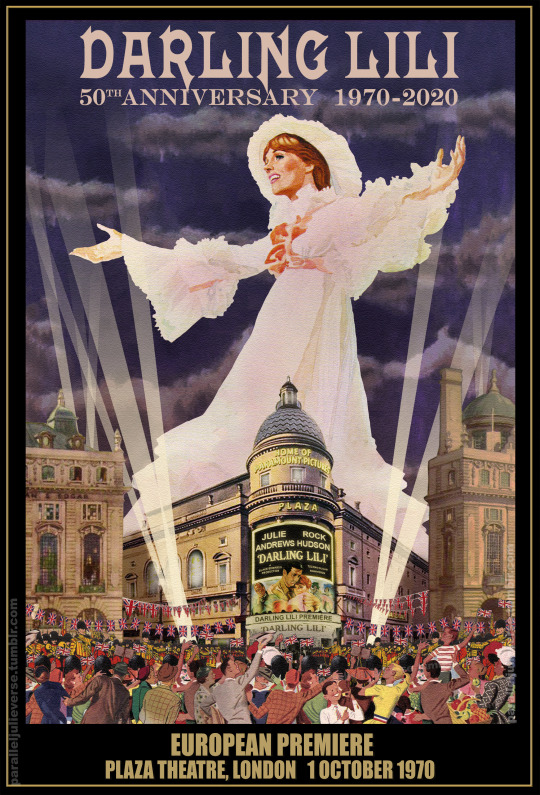
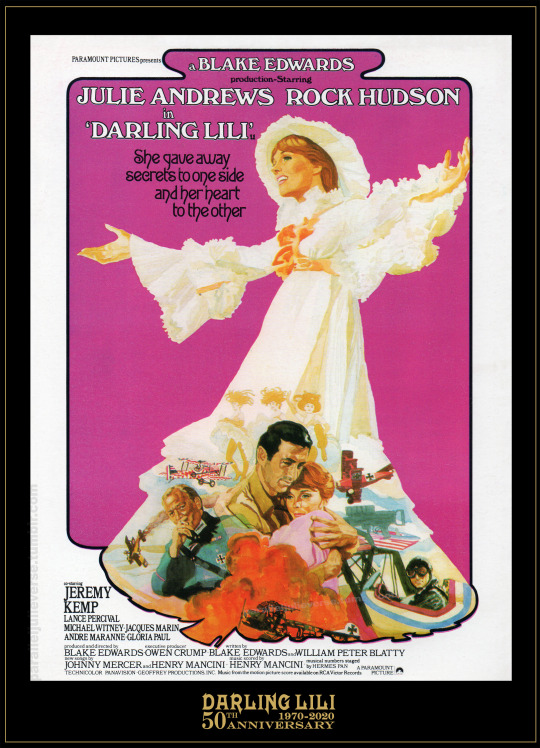
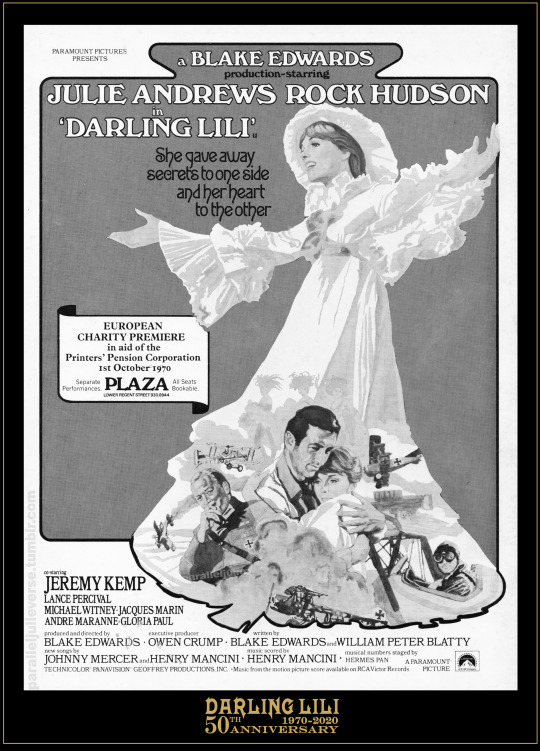
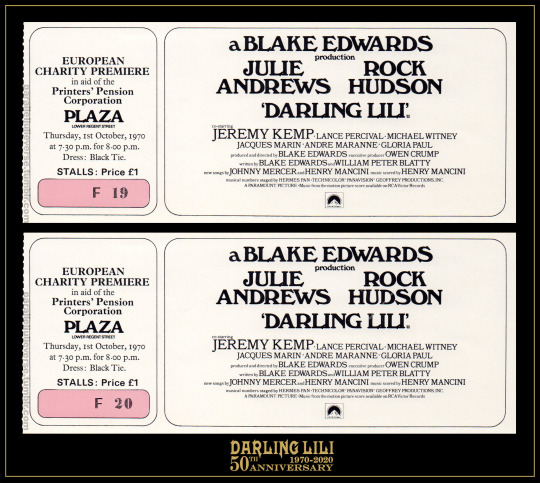
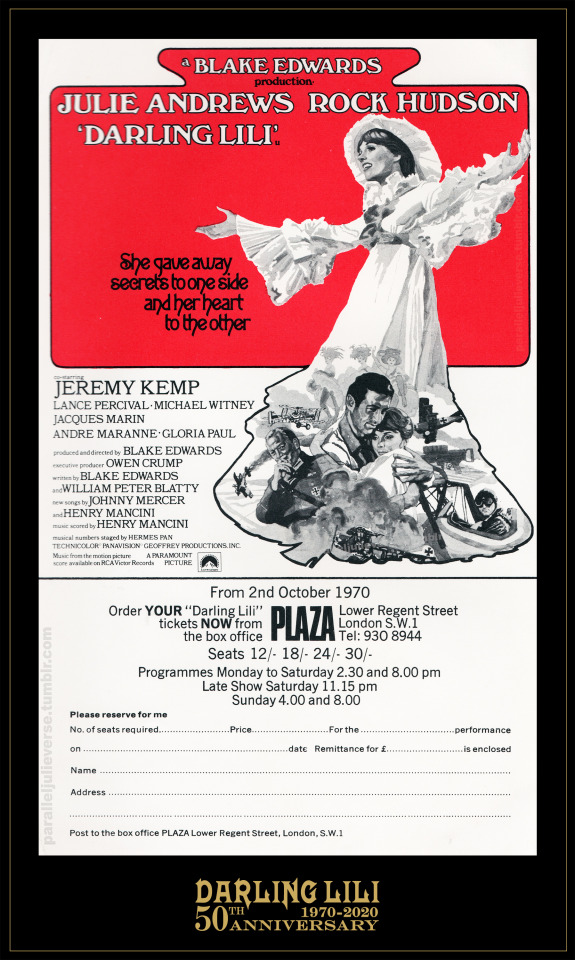
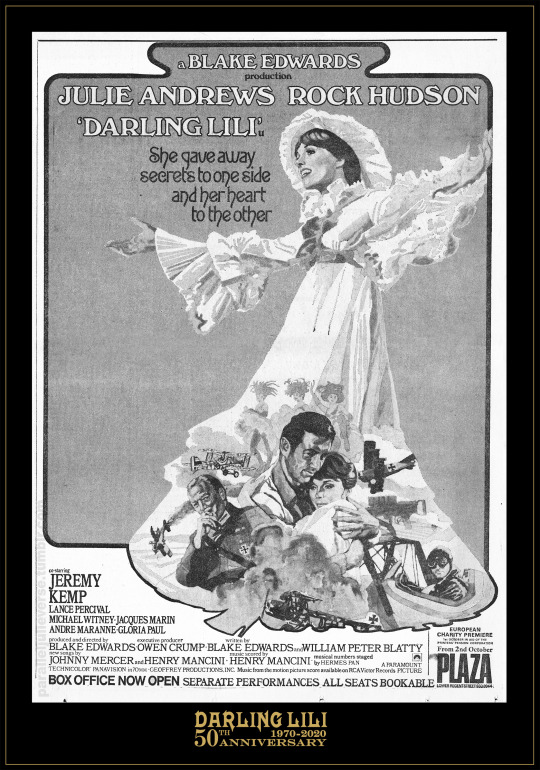
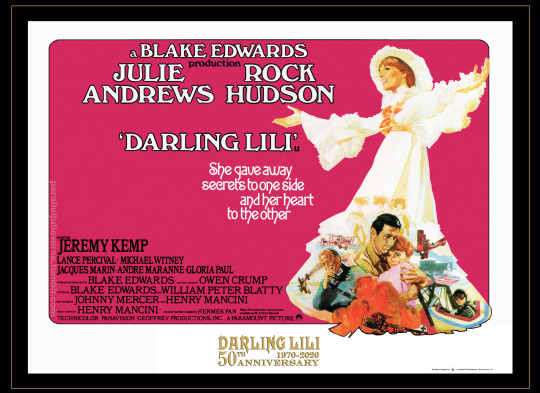
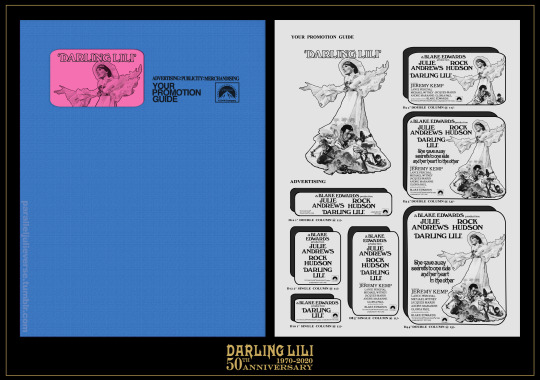
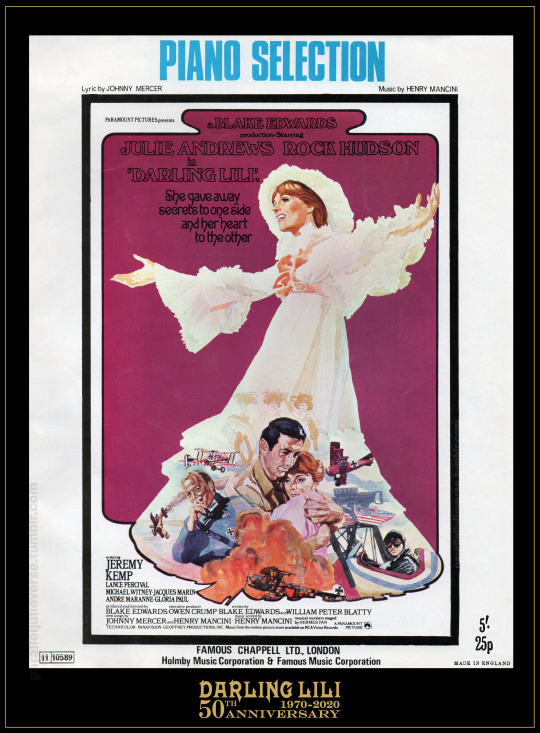
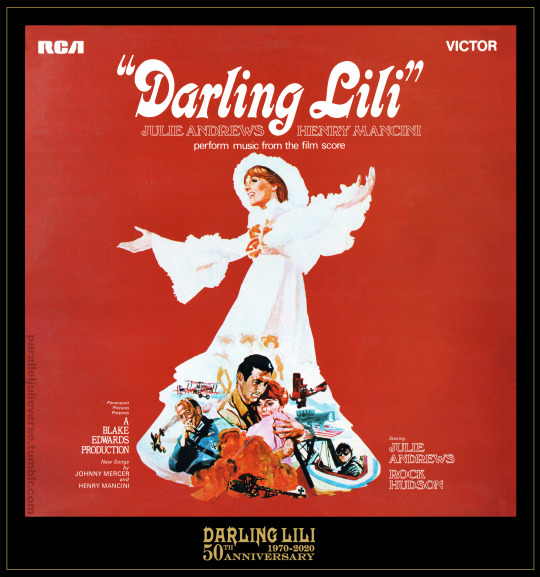
LILI IN LONDON: Darling Lili Makes Her European Bow
Fifty years ago this week, Darling Lili had its official European Premiere at the Plaza Cinema in London on 1 October, 1970. It wasn’t the film’s first international release -- that honour fell to Japan, where Darling Lili opened at the Cinerama Theatre Tokyo on 4 July, barely two weeks after the film’s US opening. However, the London premiere was a significant occasion in the film’s wider global rollout. It was, after all, Julie Andrews’ hometown and there was considerable hope local audiences would give the film a warmer reception than had been the case in North America.
Accordingly, the UK branch of Paramount Pictures afforded Darling Lili a high profile release. They exhibited the film as a full roadshow attraction, complete with widescreen 70mm print, overture and exit music, and a 24-page souvenir programme (Klar 1970). In keeping with the era’s norms of variegated international film marketing, completely new promotional artwork was commissioned for the UK release. Featuring a central image of Julie/Lili bursting into song with her arms outstretched -- a clear nod to The Sound of Music -- with a cloudburst of narrative scenes from the film fanning across the bottom of her billowing skirt, it was an arresting design that served as a ready-made marketing logo for the campaign that could be emblazoned across the full range of advertising and merchandising (Paramount 1970).
The gala premiere took place on Thursday, 1 October -- Julie’s 35th birthday, incidentally — at the Plaza Cinema in Lower Regent Street, just off Piccadilly Circus. Popularly dubbed the “Home of Paramount Pictures”, the Plaza had long been the London venue of choice for the studio’s biggest film premieres (Eyles, 26-28). Though not an official Royal Performance, the European Premiere of Darling Lili was a major society charity event with proceeds going to the Printer’s Pension Corporation, one of the oldest royally-sponsored occupational charities in the UK. Tickets were available from £1 to £5 in the stalls and £10 to £20 in the Circle with the event raising over £6000 for the charity (”Darling Lili Aids”, 12).
Official patrons of the Printer’s Pension Corporation, Lord and Lady Hartwell presided over the evening, welcoming a line of society notables and assorted local celebrities including Sue Lloyd, Judy Geeson, Clodagh Rogers and Julie Ege (“Darling Lili Has”, 32). Neither Julie nor Blake was able to make the premiere, though Julie’s parents were in attendance as honorary guests. Representing the cast, Lance Percival, who plays the comic support role of T.C. Carstairs in the film, “arrived at the Plaza in a vintage white Rolls Royce driven by a female chauffeur” (ibid.). Press reports noted that the “premiere drew large numbers of films fans to the theatre” and “the capacity audience...repeatedly applauded during the presentation of the film” (ibid.)
Following the premiere, Darling Lili opened the next day on 2 October to the general public. In a way that paralleled the experience at New York’s Radio City Music Hall, the decision to stage the film as a special event prestige picture worked well. Lili ran in roadshow release at the Plaza for over three months till 6 January 1971. It then continued to play in general release at various venues throughout London such as the ABC Cinema-Edgeware Rd well into late-1971.
Critical responses to Darling Lili in the London press ran the gamut. The film garnered several positive notices. Patrick Gibbs of the Daily Telegraph rated it “a very amiable and romantic comedy-thriller” (P14). The film “offers many pleasures,” declared the Daily Mail, with “Miss Andrews singing, dancing, delighting...with some very pretty songs...and amusing performances” (Cable, 9). The critic for the Evening Post opined:
“It is fashionable to sneer at Julie Andrews’ films as being sickly-sweet and 20 years out of date--but I can only say I enjoyed this one...Darling Lili is an enjoyable, emotional, light-hearted love story with a strong comedy element” (Watson, 7).
Other reviewers were less enthusiastic. The critic for the Daily Mirror was unsure “what kind of film Darling Lili was supposed to be”:
“Taken as a spy send-up, it’s harmless enough and drags only occasionally, but the comedy doesn’t always blend with the drama. The ending...is a cloyingly sentimental cop-out and a shade nauseating” (Richards, 19).
More than a few UK commentators baulked at the film’s irreverent treatment of World War 1--perhaps unsurprisingly given the enormous significance of the “Great War” to British history and national mythology. The critic for The Tablet, for example, called the film “a monstrous betrayal of the period.” Its “trivialisation of the issues is outrageous...I have no doubt it will be popular, but it shouldn’t be.” Still, he conceded, the film’s “photography...is very pretty and Miss Andrews’s voice is as pure as ever” (Burke, 959).
Critical concessions to “our Julie” were a notable feature of many London reviews. The all-important Times review declared:
“I wish I could like Darling Lili more. I love musicals and remain unrepentantly devoted to Julie Andrews, but this lavish new vehicle for her talents is the most upsetting sort of misfire--the sort which could so easily have been put right, with a little more thought (or a little less worry), a little more confidence in hitting the right tone and sticking to it...a disappointing waste of all the talent and money so evidently lavished on it” (Taylor, 13)
It was a sentiment echoed in The Illustrated London News:
“Miss Andrews sings well, acts decently, and even does a strip number that reveals a new side to her talent as well as a gorgeous, long-concealed, pair of legs. But, alas, not even she can save this ponderous film with its strange blend of old-and-new songs, its heavyweight prankishness, and its inordinate length” (Billington, 31).
Or again the review in The People:
“Julie has charm, grace, plus a good singing voice and Henry Mancini’s music is haunting. But the character she portrays...is hardly endearing. The story...is improbable too, even for a musical. But there are some smashing flying sequences and I like Julie’s style--so I wish it well” (Nunn, 7).
While Darling Lili opened with a splash and did decent enough business in London, it faced very different prospects elsewhere in the UK where the film became something of an inadvertent hostage in an ongoing industrial dispute. At issue was an attempt by US distributors to loosen the stranglehold and perceived old-fashioned exhibition practices of the two big regional UK chains: ABC and Odeon (“Elvin Raps”, 196; “Compromise Ends”, 24). Unable to agree on new terms, the distributors withheld several big features, including Lili, from release to these chains. As a result, Lili’s broader UK rollout was held up for months and, in some cases, years. The film didn’t get a Midlands release, for example, till April 1971 when it opened for a fixed season at the Regal Cinema in Leamington, “an independent theatre whose booking agents were able to come to terms with the distributors” (“Regal Breaks,” 2). The film then popped up intermittently at other independent theatres across the UK: Margate in September, Liverpool in October, and Belfast in January 1972.
Many major provincial markets missed out on the film completely. In a disgruntled letter to the local newspaper in early-1972, one Birmingham fan wondered if “there is a particular antipathy to musicals in our city. We have yet to see Darling Lili (Julie Andrews) and On a Clear Day You Can See Forever (Barbra Streisand), both of which have been shown in London” (Krober, 6). In a similar vein, a Reading filmgoer complained that his local ABC cinema was screening endless reissues while many new films “have yet to play in Reading..that are certainly worth a showing” such as “Julie Andrews and Rock Hudson in Darling Lili” (Suter, 10).
The UK distribution dispute was eventually resolved and Darling Lili managed to make its way out to a broader range of provincial centres including Birmingham, where it opened at the Odeon in April 1973. But by this stage the film was hardly new and whatever marketing impetus was there from the London campaign had well and truly evaporated. It was an unfortunate fizzling out for what could have otherwise been an effective national release for the film. Still, UK filmgoers who missed Darling Lili in theatres didn’t have to wait too long to catch it on the small screen. It made its British television debut as the ‘Film of the Week’ on BBC-1 on 2 April 1976 (“Film of the Week”, 22).
Sources:
Billington, Michael. “Cinema: An Ode to Lost Innocence.” The Illustrated London News. 3 October 1970: 31.
Burke, J.A.V. “Darling Lili.” The Tablet. 3 October 1970: 959.
Cable, Michael. “The Sweet English Rose is Among the Guns.” Daily Mail. 30 September 1970: 9.
“Compromise Ends US Majors’ Fight Vs. UK Circuits Over Sunday Rentals.” Variety, 13 October 1971: 24.
“‘Darling Lili’ Aids Printers’ Charity.” The Daily Telegraph. 2 October 1970: 12.
���‘Darling Lili’ Has Glittering London Bow.” The Calgary-Herald. 10 October 1970: 32.
“Elvin Raps ‘Oldfashioned Methods’ of UK Pic Biz, Hits Chains’ Bookings.” Variety. 29 April 1970: 196.
Eyles, Allen. London's West End Cinemas. Swindon : English Heritage, 2014.
“Film of the Week: ‘Darling Lili’.” Radio Times, 1 April 1976: 22.
Gibbs, Patrick. “Films: Spying With a Song.” Daily Telegraph. 2 October 1970: P14.
Harmsworth, Madeleine. “New Film.” Sunday Mirror. 4 October 1970: 29.
Klar, Arthur. Darling Lili [Souvenir Book], London: National Publishers, Inc, 1970.
Krober, Kenneth S. “Letters to the Editor: Antipathy To Musicals.” Birmingham Daily Post, 7 February 1972: 6.
Mallett, Richard. “Cinema.” Punch. No. 6787, 7 October 1970: 510.
Nunn, Ray. “But Will Lili Keep ‘Em Singing?” The People. 4 October 1970: 7.
Paramount Pictures (UK). Your Promotion Guide: Darling Lili [Advertising Campaign Manual], Chiswick, 1970.
“Picture.” Daily Telegraph. 2 October 1970: P17.
“Regal Breaks Stranglehold.” Birmingham Daily Post. 27 April 1971: 2.
Richards, Dick. “I Spy a Send-Up.” Daily Mirror. 1 October 1970: 19.
Suter, Les. “Letters to the Editor: Old Films.” Reading Evening Post. 15 June 1972: 10.
Taylor, John Russell. “Purple Passages in Paris.” The Times. 2 October 1970: 13.
Watson, Albert. “At the Cinema: Yes, I Enjoyed Julie Andrews!” Evening Post. 10 October 1970: 7.
Copyright © Brett Farmer 2020
#Darling Lili#julie andrews#european premiere#film premiere#london#plaza theatre#paramount#blake edwards#rock hudson#film history#classic film#old hollywood
11 notes
·
View notes
Text
Episode 5: Is a Woman’s Place Really in the Kitchen?
Sources:
Amelia Simmons
The Atlantic
Connecticut History
Michigan State University Libraries
Smithsonian Magazine
Further Viewing: Amelia Simmons’ Thanksgiving Dinner – YouTube
Buwei Yang Chao
“Chinese linguist, phonologist, composer and author: oral history transcript / and related material, 1974-1977”
Chowhound
Brown University
Brown University (YouTube)
Open Recipes Openly Arrived At: Mrs Chao’s How to Cook and Eat in Chinese (1945) and the Translation of Chinese Food
Chow Chop Suey: Food and Chinese American Journey (book by Anne Mendleson)
New York Times
Mary Mallon
Annals of Gastroenterology
History Channel
National Geographic
Smithsonian Magazine
Discover Magazine
Attributions:
Drum Roll
Stove Clicks
Food Vectors
Click below for a full text transcript of the episode!
Alana: I hit my step count for the first time in quarantine today because I was walking all up and down northwest Washington DC looking for brisket five days before Rosh Hashanah. By the time this comes out we’ll be well past Rosh Hashanah, we’ll be like into Yom Kippur kind of area.
Lexi: Yeah. We will.
Alana: But oh my god. I'm so tired. I'm not used to doing that much walking… but… all over… But I found one! I found one.
Lexi: Where’d you find it?
Alana: Trader Joe’s.
Lexi: Of course!
Alana: Trader Joe's, man. I looked at the farmer’s market but they were sold out and that was really sad because obviously…
Lexi: People probably preordered to the farmer’s market.
Alana: That's the thing I only thought about it like Thursday, and the preorders needed to be in by Wednesday.
Lexi: Ooooh.
Alana: So… walking all around northwest Washington. I checked the farmer’s market stand to be like oh maybe they brought extra and I went early like I get there at 10:30 now and they were sold out.
Haley: It’s kind of like Thanksgiving for it, like where you have to preorder your turkey or ham. And I'm kind of terrified for that moment because I'm hosting Thanksgiving. But I need like an eight to ten pound turkey, nothing like– I’ve seen thirty pound turkeys when I was researching this. Like how big is a brisket?
Alana: It depends. The brisket that I got was three pounds. Three point one pounds.
Haley: And that's it for you or for like others?
Alana: It's for me and for my extended quarantine household. Shout out to Maureen and Paul, I don't know if they're listening to this episode but they said they were gonna listen to the first two, so…
Lexi: But you can make a lot of brisket if you want to.
Alana: Oh yeah, I'm gonna make all of it. It reheats really well.
[INTRO MUSIC]
Alana: Hello and welcome to Lady History; the good the bad and the ugly ladies you missed in history class. I'm in the virtual studio with my spice wife Lexi. Lexi, do you want to explain how we got spice married?
Lexi: Well for one we're both really spicy people, um, so that's got to be the first reason. When you put two spicy people together equals a spicy marriage. But no what happened was I was moving out of DC and I had a collection of spices because I love spices and I needed someone to take my spices so Alana took them. And then the other day Alana was cooking and talking about all the spices she uses and it happened to be a combination of the spices from both spice cabinets so it was a spice marriage.
Alana: We shared our spice assets.
Lexi: And hopefully someday we will live together, and our spices can stay together forever.
Alana: Someday.
Lexi: Or they'll expire. But spices last a long time.
Alana: Spices last a while. Also here, “here” in air quotes is Haley. Haley, do you have a favorite dish to cook?
Haley: I love making anything with mashed potatoes. I really like find it just calming to peel potatoes and then chop them up and then watch them boil. I like those like specific steps I can go through.
Alana: I’m inviting you to help me make latkes because that's the worst part. This has been a very Alana is Jewish episode already but I'm inviting you to make latkes with me so that you can peel all the potatoes because I hate doing that.
Haley: I've never had a latke before so I don't know how much help I’ll be.
Alana: Didn’t you live in New York?
Haley: Latkes have eggs. I've never had a latke sans eggs, so.
Alana: I’ll find a way. For you I will find a way to make latkes sans eggs. And I'm Alana and my friends call me a Trader Ho because I grocery shop almost exclusively at Trader Joe's.
(Haley laughing)
Lexi: Which friends are that?
Alana: My internet friends. My sunshines.
Haley: I was like… we don't call you that. You have other friends?
Lexi: You have friends that aren’t us?
Lexi: Okay so the theme today is cooking and because of this theme I would like to dedicate this episode to my great grandmother Eleanor Delucia, who we called Nana most of us call Nana. But the reason I would like to dedicate it to her is because she spent a hundred years of life cooking and living through history and so I think it's very fitting that this episode would be dedicated to her. And because of that I want to ask you guys if there's any family recipes that are weird or unique to your family.
Alana: Yes I do have a very special recipe, actually I have a couple, from my Grandma Louise. I recently started– oh my god Alana’s going to be Jewish on main again– I started making challah every week from scratch and I'm using my grandmother's recipe that is so incredibly complicated. And like you– you have to boil water, but you can't boil water too much, like it has to be exactly 110 degrees when you use it. And then you have to rise the bread– like rise the dough at exactly 90 degrees, and it's so complicated and so I've started using that recipe and I'm crushing it. I’m crushing it. It was my first time making challah by myself and I used this recipe that was super complicated and I nailed it. I nailed it. And then the other one is, I started making a potato zucchini soup and– like when I was a teenager. And I made it for my grandparents at their house once and my grandmother was like “you know what would give this a really beautiful green color is if you left–” like you peel the zucchini but if you leave the peel in the bowl– not in the bowl, in the pot while all of the vegetables are cooking together, the soup will be more green. And it'll be like– the color will be more pronounced and– oh my god, she was so right. And so now that's like how I make it. So those are my fun family stories.
Lexi: That's so beautiful.
Haley: I don't think we have like a distinct recipe or sets of recipes. We will cook Cuban or Persian food. And I've noticed with my mom and myself since we're both like lazy, lazy beans, we’ll take the complicated recipe, like Alana was saying, with all the ingredients, all the different measurements, what you have it, and just make it into a Crockpot friendly, or like one pot friendly recipe, versus making it a three hour long process. Because so many times I’m like I really want Persian food and it wasn't until a few months ago where a Persian restaurant opened down the street from me. And every time I open like one of my marked Pinterest tabs it would be like eight to ten different ingredients that I could not get at my local supermarket. And then thirty plus steps, culminating into three to four hours of cooking, which I just do not have, especially writing a thesis at the moment.
Lexi: I think for my family it's a dessert heavy situation, like on both sides. My mom's family has these German rollout cookies that we make for Christmas, sometimes other holidays– we made little George Washingtons for my graduation party, which was cute, but they're just flat cookies. And then on my Italian family’s side, the thing that we do at weddings as we have a table where all the aunties bring cookies and then it's like a place of privilege or pride to be the best auntie with the best cookies for the wedding, which is really cute. So I think cookies are a big deal in my family.
Alana: Cookies are– are a big deal in my family too, and I find it– like, my grandmother died three years ago… just over three years ago– and I find like, making cookies so spiritual. That I'm like this is something that we used to do together. It's one of my favorite pictures of like little baby Alana and Grandma Louise and she's teaching me how to use a cookie cutter and it’s so cute.
Haley: Okay I have to amend mine because we've brought up desserts. Like I just said probably five minutes ago I'm real allergic to eggs so my Christmas like cookies all egg free, or like before we could do the– the substitutes were oreos like dipped in chocolate. But my birthday cake was a homemade Rice Krispies treat like cake. My mom would just make like a ginormous one and like decorate it. So all my– just because like what were you gonna do with a child that couldn’t eat her own birthday cake? That's just sad and depressing. So my mom basically was like we're gonna have a Rice Krispy treat or we're going to have ice cream cake. So that– I guess that is heavily unique for my family.
Lexi: So cookbooks emerged as a status symbol, and in 15th and 16th century Europe, cookbooks were filled with recipes from palaces and courts and they were favored by kings and queens. And the wealthy loyal followers acquired these cookbooks as a sign of their devotion, eating like royalty… it brought them closer to being royalty. Gradually, as access to print books became more common and literacy rates rose, cookbooks became a staple in households all around Europe. But one cookbook in particular changed the way a nation ate. And that’s the cookbook we're gonna talk about today. In the year 1796, Amelia Simmons wrote the United States of America's first ever cookbook. In doing so, she forever changed cookbooks, shaping a future in which cookbooks were used by people from all walks of life. Amelia’s book was called “American Cookery, or, The Art of Dressing Viands, Fish, Poultry, and Vegetables.”
Alana: Can you spell that?
Lexi: V-I-A-N-D-S.
Alana: I hate French.
Lexi: It was published by Hudson and Goodwin in Hartford, Connecticut. While it was not the first cookbook printed in America, it was the first one written by an American. It was a unique cookbook. It was distinguished from its British counterparts for its attention to more practical methods of cooking and it provided recipes that can make large quantities of food for families on tight budgets. When I say large quantities, I mean the ingredients were prepared in huge, huge quantities. One of her cake recipes called for two pounds of butter. Amelia also believed in saving time, and one of her recipes called for the person making the recipe to milk a cow directly into the mixture. Amelia's cookbook resonated so successfully with America's home cooks that it was reprinted for thirty five years after its initial publication. Amelia's recipes may not be as commonplace in American households as they were during her lifetime, but they are a great resource for analyzing and understanding how food and language are related in history. Some of them you use terms became commonplace in American language such as calling pancakes slapjacks, referring to lard and butter as shortening, coining the Americanization of the Dutch word “Koekje”– I might have said that wrong– which would eventually become the word “cookie.” She actually spelled it like C-O-O-K-Y not I-E like we spell it today. Her legacy continues in her home state of Connecticut, where her recipe for “Election Cake”– a floury bread cake baked in large quantities– became a common after-voting snack for Connecticut's residents and remains relevant today. Plus, Amelia’s recipes let historical chefs recreate and taste recipes, experiencing the history of America through the flavor of food people the past preferred. And, so I guess in summary, Amelia kind of started the whole trend of American cookbook culture. She established the means by which American women make their food– and American people in general I guess not just women– but at the time she definitely was writing as a woman for other women because the recipes were so practical and focused on how a mother might cook for their kids or wife might cook for their husband or how you might cook for a family so definitely she was a woman writing for women but I really think it’s an interesting and fascinating story that she created the first cookbook, and it was a woman who did it, and that's really really cool.
Alana: I like how you said like cookbooks were status symbols and I'm thinking about cleaning out my grandmother's kitchen and there were just like cabinets full of cookbooks and I'm like oh, hello, yes, I am the aristocracy.
Haley: I actually have a question about the cookbooks, Lex, cuz I couldn’t find this in my research. But could you find like what constitutes as a long time for being an in-print cookbook.
Lexi: So, nothing I read said like thirty five– because because thirty five years was how long hers was printed for.
Haley: Right.
Lexi: Nothing said that that was the longest or that that was normal. It was notable but it wasn't a record. So…
Haley: Right.
Lexi: You know. I don't know exactly how long recipes last, but when you think about how trends change so much and how we don’t really eat things today that my grandma used to cook at dinner parties in the seventies. I'm sure cookbooks don't last that long and when we think about Amelia's methods and then we think about what people ate even in the mid-1800s it was totally different already, so even fifty sixty years later so. Yeah.
Haley: That’s the exact train of thought I was using because I've noticed when I was just researching different women to see who I wanted to dive into, a lot of the cookbooks if they weren’t out for those like thirty year chunks, it was revisions. Every few years here's a revised copy. And that's like a thing in our academic world as well where new trends happen, new events happen. And recipes and also just work needs to be updated. So I like that like the thirty years but also that she's just still relevant.
Lexi: Yeah. So we don't know that much about her. Like, all we know is that she was an orphan and that's literally it. We don't know about her personal life, we just know that she wrote this book. There's no other records of her in any way. Yeah, and there's actually a Youtuber I'd like to shout out named I believe it's Townsend's I think that's how you say it– it's like the word “town” and the word “end”– who does these recipes that Amelia put in the book. And he does other historical recipes too, and other historical videos but if you want to see an entire playlist of Amelia's Thanksgiving dinner recipes check out that channel.
Haley: Well that's a great segue into my gal because we're gonna keep going on the cookbook train and also kind of I want to say revolutionizing the American kitchen, in a sense, but we're going to do with Chinese food now. Not necessarily like the American food, which I got from Amelia, sensing it’s more of a not necessarily British take but American classics.
Lexi: Establishing American classics.
Haley: There we go. Yep, that's awesome. So I'm going to preface this, I calling–
Lexi: Something I forgot to say on that, she used like corn and stuff which was not available in Britain so…
Haley: Oh, I love that. That's. So good for what I'm gonna be talking about. So she is Dr. Buwei Yang Chao. And I'm gonna do a little side note: I’m not going to be pronouncing these Chinese words, phrases, whatchahaveits, correctly because I do not speak Chinese. And yes, you heard it, Doctor. But don't worry we'll get into that. Born in 1889 in Nanjing, China Buwei was a Chinese-American physician and writer but most recognizable as a person who brought us, as Americans, potstickers, stir fry, and essentially the first cookbook of Chinese-American food. Before we begin, I just want to go over what potstickers are because I didn't know what potstickers were and I'll get into that more but potstickers are type of Chinese dumpling usually with a crescent shape, pan fried on one side, simmered in some sort of broth. And full disclosure part of the reason why I didn't know what potstickers were because I've only had them from Trader Joe's. I.E. that whole egg thing coming back in. So back to Dr. Buwei. As a female doctor in China, she did have a Japanese training as a surgeon and gynecologist and she actually pioneered the use of birth control for women in China which blew my mind. I was reading like a New York Times article and got into a whole wormhole of this doctor’s just life and bam, coming out with pioneering in birth control and medicine of that nature. And she definitely had a mix of Chinese medicine and then also like Western school medicine because a lot of the Western schools were in Asia so she got the mix of both. And she was credited with that sense of bringing Western medicine to China as one of like the first females to do it. And a lot of the time, her medical like knowledge was noted as quote “new style” and also as a side note I believe that in her entry exam essay it was about women's education, which I thought was really cool. Like how educating women was a good and powerful thing. And I only found that only one article so it might not be true, but I'm praying that it is true because I was just so baller to go into med school with your entry essay being about women's education and like the right that women have to be educated at such a professional level. So why did I bring this all up, because come on Haley we're here to talk about food. Well, while she was in Japan and studying at Tokyo Women's Medical College, she started cooking her own meals because she didn't enjoy the Japanese cuisine. It just didn't sit right with her. Totally different, she wanted the comfort of home and since Japan didn't have–
Alana: Raw fish? I’m with her. I’m with her. I don’t do the raw fish.
Haley: Exactly. Like if we went to Italy and for me, the eggs in all those pastas, I would be going out, buying my own pasta, making my own carbonara, sans eggs. Totally natural. But Japan, kind of like what Lexi was getting to, Japan didn’t have all the traditional ingredients, so she would modify her traditional Chinese recipes to fit in with what she could get from the Japanese markets. And when she returned to China in 1919, she opened the Sen Ren Hospital, and after a few more years, marriage, blossoming career, she was offered to teach at Harvard University in Cambridge, Massachusetts. Thus we get into her time in the U.S. And her and her husband like there are a couple of years where they go back and forth teaching, practicing medicine, living their life. So when she was writing or just before she was writing her first cookbook which is “How to Cook and Eat in Chinese” and that came out in 1945. She would try and test out her food. This was also often in the U. S. so with ingredients that her readers would have, and she added these elements to her everyday cooking. So this wasn't like “I'm going to write this cookbook for people to buy it and make money off of it but not use it myself.” She fully invested, saying “look, if I'm gonna produce something for people to read, I have to use it in my everyday cooking. I have to live by this.” which I really respect. So in a history perspective, 1945 was the tail end of World War II, and for writing cookbooks– writing cookbooks takes years to do. If you saw the movie “Julie and Julia” you kind of get a glimpse of that, where you first write about the outline, what you want to cook. You want to have appetizers, mains, and desserts. And then you get it to the publisher, they say “cool, do these work?” You test and test and test, just years and years and honestly I could be totally getting this timeline wrong. This is just my preliminary knowledge. So 1940s, we’re in World War II, it was also a difficult time for cooking and food in general in the United States because not just having the native Chinese cultural food that she was used to, and now she had to supplement in the U. S., they’re are also going through food shortages and kind of restrictions from food stamps and just what was available during World War II. So she really used some innovative and creative thinking when writing this masterpiece of hers. And a lot of it also came from, just the New York World's Fair happened in 1939, and I don't think this had a direct impact on her writing the cookbook but I think it had an impact on her selling a cookbook and becoming like this wide sensation because that World's Fair was about showcasing food from around the world and pushing having new cuisine in US culture. And then a few years later, we have this cookbook about Chinese food. And on overall note, Buwei’s cookbook was not the first Chinese cookbook in the U. S. in terms of being published in English, but it was more the first that was universally understood in the sense of getting the food, understanding the writing and measurements, it was very comprehensive and accessible to a wide audience. This OG cookbook in 1945 “How to Cook and Eat in Chinese” also had expanded editions in 1949, 1956, and 1968. So what I was asking Lexi before, she kind of kept up with the words, terms, recipes, and just… I tried to find some of the cookbooks but all of them are out of print at this point. Regardless, it brought new terms and techniques to US kitchens and over two hundred different recipes which included terms, ingredients, techniques, tools, but also like etiquette. So how to use chopsticks, what are the polite ways you should be eating dumplings vs fried rice; which I thought was really cool, and I tried to look through like the two cookbooks I had in my apartment and I couldn't find anything where it was like “here's the etiquette you should use.” Granted, they were more US based cookbooks, it wasn't one targeted for a certain cuisine. And she also acknowledged the help from her husband and daughter, Rulan. She would cook and her daughter would write down in English, usually translated from Chinese to English. So if I may dazzle you with a quote from– I believe this is from The New York Times– and also just culmination of an audio source that I found. It was like an interview and I saw– there's just so many, so many things of her using like this quote and a mo– mashup of this quote: “I am ashamed to have written this book. First, because I am a doctor and ought to be practicing instead of cooking. Secondly, because I didn’t write this book. The way I didn’t was like this. I speak little English and write less. So I cooked my dishes in Chinese, my daughter Rulan put my Chinese into English.” And this quote has so many variations, but it's basically saying that she can't take full credit because she was still a doctor, she couldn't necessarily write in English the way that US publications wanted her to, and she needed a lot of help, which is so fair for any cookbook or any writing source. And I just thought that was amazing. Like I kept finding clips and even when people were kind of telling her story years later, we're saying like she was ashamed to like have written this cookbook and taken away from her medical studies. But also values how great of an impact this cookbook had on the U.S. Now you know how I said that she coined the term stir fry and potstickers. Well it's because “cha’ao” and “guotie”– again, we don't speak Chinese, please don't come after me– really didn't have English translations. Like the term Chinese food is really just like a US word. It's not something that's used in China. You can't– you won't go to China and just be like “I want the Chinese food. I'm going to Chinese food restaurant it's because the way Chinese food is broken up in China is regionally so they they don't group it up as one whole country as we do and how someone of this cookbook does it's very specific to where you are in China and it's not a representation of the country as a whole like unit but for this cookbook and us as Americans we just say Chinese food and that's again coming back to what is available in each region so for the US and for this cookbook this is what's available in the U. S. not what's in available in northern versus southern China and there are a ton of other words that were in this book that didn't even stick in our English macular so like that's what is really interesting trying to find a copy but alas I couldn't find one online because I feel like if we re read this we wouldn't understand as shafts not just like with the vernacular but just the way it was written and the way some of the food kind of was presented she also just to wrap everything up she wrote two more books afterwards of how to order in each Chinese and then another autobiography called an autobiography of Chinese women put into English by her husband your friend child so she still just fantastic amazing woman like this blew my mind especially being in San Francisco that's my story of Dr. Buwei.
Alana: So I am going to be talking about Mary Mallon, and there has been a lot of talk about her recently and we'll get to why she's been in the news. So she was born on September 23rd, which is my mom's birthday and also yesterday on the day this comes out, in 1869 in a poor area of Ireland called the Cookstown in County Tyrone. And I am like a little bit familiar with Irish geography, like I know the names of some counties in the Republic of Ireland. Like we've talked about County Mayo, we talked about County Cork, County Kildare, if you know it then you know it. And I was like I've never heard of County Tyrone and I know there are like twenty-eight counties in the Republic of Ireland but– so I was curious, I was like where is that. It's actually in Northern Ireland so it's technically in the U.K. So Mary Mallon immigrated to New York City as a teenager in 1883 or 1884, about then. And she starts working as a cook, around the turn of the twentieth century and she is famous for her peach ice cream. In 1906, she was hired as a chef for the family of Charles Warren, who was a banker in 1906 so they have cash cash. And they go on vacation in Oyster Bay and Mary comes with them to be their chef. Several members of the Warren family contract typhoid over those couple weeks. And typhoid is considered at the time a poor people's disease, because you contract it mostly from contaminated water. Imagine thinking that like, only rich people deserve clean water. Like call me a socialist, but I really think that everyone should have access to clean water. And Warren’s landlord is concerned about being able to rent the property the next summer because there was this outbreak. And so he has hired a sanitation engineer named George Soper, and he's been an expert in tracing the outbreaks, and he tests all the pipes, and he tests everything. There's nothing. So he focuses on Mary. Turns out, several other families that Mary had worked for have also had typhoid outbreaks. And this is where, listeners if you haven't guessed, Mary Mallon becomes… Lexi put in a drum roll here please…
(Drum roll)
Speaker 1: Typhoid Mary. I can see Haley like laughing in her Zoom but they’re on mute so that's fun. So George Soper goes after her. Asks for samples of everything and she chases him out of her kitchen with a fork. Like a– like a barbecue, two pronged fork. Not like a… like a dinner fork.
Lexi: I have a tiny fork are you scared of me?
Alana: Like a FORK. So he returns with cops to have her arrested. And Mary hides under a floor board, but some of her dress is caught. And so they find her, and they arrest her and they force her into quarantine for three years on North Brother Island, which is a quarantine facility– a little dot of an island in the East River near the Bronx. She is tested up and down for typhoid and they all come back positive for salmonella typhi, which is the bacteria that causes typhoid. But she has no symptoms. She's the picture of health. She is released in 1910 on the condition to never cook again. In 1915, there is a typhoid outbreak at Sloan Maternity Hospital in Manhattan. And the health department is called, and the hospital is just like how– like, we’re a hospital, everything is so sanitary, how did this happen? And the health department says who… who's doing your cooking? And the nurse– the nurses are just like “oh, this lovely Irish immigrant. Her name is Mary Brown.” She had changed her name to keep working as a cook. And that sounds kind of like irresponsible, but what else could she do? She had no other skills, she's not married, she originally immigrated with her aunt and uncle but they've died, and she's an Irish immigrant during a time of very high anti-Irish sentiments. She really didn't have another choice. But they catch her, and they forced her back into quarantine for the rest of her life. They’re… say that she could have had a gallbladder removal surgery and they would have let her go, but she didn't want it. And I was like why wouldn’t she want it? But also, the doctors imprisoned her, essentially. And she even referred to herself in a letter to her lawyer as “the kidnapped woman”. So I do kind of understand why she'd say no. And then she died in 1938 of a stroke. And only nine people attended her funeral, which– this is another like Alana’s Jewish kind of thing but I'm like “that's not even a Minyan how are you going to do anything??” Lexi is rolling her eyes at me. But in pop culture she is demonized, she's the butt of jokes and cartoons. But there are other asymptomatic carriers at this point, all over the country and even in New York. So I think she is demonized particularly because she's a woman, particularly because she is unmarried, and particularly because she's an Irish immigrant at a time of anti-Irish-ism. I don't know if that's a word. But she's been in the news recently. A lot of my sources are from like June. People talking about Typhoid Mary because… talking about asymptomatic carriers and being super spreaders.
Lexi: I think that's so fascinating how people are tying her story into our current situation.
Lexi: You can find this podcast on Twitter and Instagram at leading history pond our show notes and a transcript of this episode will be on lady history pot dot tumblr dot com if you like the show leave us a review or tell your friends and if you don't like the show keep yourself our logo is by Alexia Ibarra you can find her on Instagram and Twitter at LexiBDraws. Our theme music is by me garage band and Amelia Earhart; Lexi is doing the editing. You will not see us, and we will not see you, but you will hear us, next time, on Lady History.
Haley: Next week on Lady History, we're talking about our suffragists. Women's right to vote and remember everyone, register to vote please and thank you.
[OUTRO MUSIC]
Haley: I really don't understand eggs on a fundamental level.
1 note
·
View note
Link
He doesn’t bother explaining why he’s here.
This is early on, late May, a few months into the race, but he is already of the belief that he is doing something extraordinary with his presidential campaign — something that’s never been done before. The trouble is describing it. There’s no word for this in modern politics. It is, he believes, “a new way to communicate with the American people” — though he won’t say this until later, and only when asked. Even now, long after he’s put this work at the center of his campaign — at his events, in ads, on Twitter, Facebook, and YouTube — he won’t talk about it much. He isn’t sure it’ll work, or if people are “picking up on what we’re trying to do here.” The media, he believes, has always believed, can’t fathom what’s at the heart of this.
So when he arrives at the house, a small mobile home 40 miles outside Montgomery, Alabama, over the Lowndes County line, in one of the poorest places in the country, with five reporters and his own camera crew, he steps through the front door, greets his host, and begins with no clear mention of what he hopes to accomplish here or how it will help him become president.
Pamela Rush, a 49-year-old mother of two, is showing him the problems with her home: the floor tilting visibly to one side, the sheets of plaster peeling off the wall, the broken pipes, the broken cabinetry. He stops in the room where her daughter sleeps. “Do you guys wanna…?” He motions for everyone to come closer. His videographer shuffles forward. On the bedside table, there’s a ventilation machine, the kind used for sleep apnea. A tube of ribbed plastic connects the device to a mask resting on the bedspread, which is patterned cheerily with tiny elephants. Because of mold in the house, Pamela’s daughter needs the device to breathe in her sleep. “How old is she?” the candidate asks. She’s 10. Pamela holds up the mask so he can see up close.
“Show them, not me,” he says, gesturing toward the camera.
She shows the camera the mask.
The visit continues like this. “Show them,” he keeps saying. “Show them.” He speaks only to ask questions, prompting Pamela to “explain” this or that, pointing her to an unseen audience on the other end of his camera lens. It’s like he’s directing his own video — except the video isn’t about him or his campaign or his policy agenda. He is, it seems, somewhere offscreen, an omniscient narrator, felt maybe, but not seen or heard. This is not a public event. There is no crowd. There is no podium, no speech. Mostly, there is silence. The leader of the political revolution — a man who has spent 50 years of his life trying to talk about his ideas — is not saying much at all.
In his first campaign, a third-party bid for US Senate in 1972, he lugged around a 2,000-page, two-volume study by the House Banking and Currency Committee, liberally quoting its findings to the people of Vermont. He spent that year telling anyone who would listen about the fact that a mere 49 banks were trustees of $135 billion and held 768 “interlocking directorships” with 286 of the country’s largest 500 industrial corporations. To him, the phenomenon of interlocking directorships was not arcane or irrelevant to daily life in Vermont. It was an urgent outrage.
In Congress, he developed “the oligarchy speech,” a bleak overview of income inequality in America. The speech became the basis of his public events, his lengthy posts on Facebook, of an entire book — title: The Speech — consisting solely of the transcript of an eight-hour speech he delivered on the floor of the Senate.
And in 2016 — the rallies? The arenas? He had 2,600 in Iowa’s hulking Mid-America Center — largest crowd of the caucus season. He hit every city he could: 5,000 people in Houston, 8,000 in Dallas, 10,000 in Madison, 11,000 in Phoenix, 15,000 in Seattle, 27,500 in Los Angeles, 28,000 in Portland — plus overflow! All those people showing up to hear an hourlong speech they already knew by heart: wages down, median income stalled, one family with more wealth than the bottom 130 million… As he spoke, they’d mouth along to their favorite lines: “Congress does not regulate Wall Street—” “WALL STREET REGULATES CONGRESS,” the crowd would shout back. “Enough is—” “ENOUGH!” they roared. The succession of grim facts — “but let me tell you what is even worse!” he’d say — became a ritual. When a small bird, later identified as a common house finch, once landed on his lectern, an entire stadium full of people cheered wildly, mouths open, their arms raised to the sky, eyes turned upward — not to God, but to the image of the bird and their candidate on the Jumbotron. There was power in the speech. He believed, aides have said, that he was literally changing a generation, person by person, line by line, with every rally.
That was the whole thing — Bernie Sanders, talking.
This is something different.
“Pamela,” he says gently, “why don’t you explain it.”
“And be loud so everyone can hear you…”
Bernie Sanders is sorry for your troubles, but that’s not the reason he’s asking you to talk about them — which he is, everywhere he goes. He wants you to talk about your medical bill — the one you can’t pay. He wants you to talk about losing your house because you got sick. He wants you to talk about the payday loans you took out to keep your kid in school. About the six-figure student debt that’s always on your mind. About living off credit cards, or losing your pension, or working multiple jobs for wages that won’t be enough to support your family.
He would like you to talk about this publicly, in detail, and on camera. He will ask you to do this in front of reporters, or in a room full of strangers at one of his town halls. Of course, the Bernie Digital Team will be there — they are always there — taping your story on camera, or streaming it in real-time to his own mass broadcast system on YouTube, Facebook, and Twitter. On any given day, he is capable of reaching millions of people.
“Who wants to share their story?” he’ll say. “Don’t be embarrassed. Millions of people are in your boat.”
He has, it turns out, built an entire presidential campaign around an open invitation to speak — to talk plainly about the “reality of life” in this country — to be “loud so everyone can hear.”
His suggestion, by asking you to speak up about your private anxieties, many of them financial, is that you and the millions of people in the proverbial audience will begin to see your struggles not as personal failings, but systemic ones. He is less interested in explicitly presenting solutions than naming the problem — that “we have millions of people in the richest country in the history of the world who are struggling every single day,” which is a phrase he repeats daily, almost like an exhortation, as if to grab the American working class by its shoulders. He doesn’t deal in pity or reassurance. Yes, he’ll give hugs — one arm, from the side, other hand still clutching the mic. But mostly he’ll just listen and nod, gaze lowered. Or he’ll shake his head at the crowd, like can you believe this? And then, from the gut, a clipped scoff, like of course you can believe it. That’s the point. He has heard your story before, because it’s all part of the same story: a broken system, driven by profit and greed, built to reinforce the notion that if you’re bright enough, if you work hard enough, then you can travel the path to the middle class. And if you don’t make it there…well, maybe you’re the problem. And who wants to talk about that?
He believes his presidential campaign can, he says, help people “feel less alone.”
He is trying to change the way people interact with private hardship in this country, which is to say, silently and with self-loathing. He is trying, in as literal a sense as you could imagine, to excise “shame” and “guilt” from the American people. These are not words you hear often in politics, but in interviews this year with the candidate, his wife, and his top advisers, they are central to his strategy to win. He is imagining a presidential campaign that brings people out of alienation and into the political process simply by presenting stories where you might recognize some of your own struggles. He is imagining a voter, he says, who thinks, “I thought it was just me who was struggling to put food on the table. I thought I was the only person. I thought it was all my fault. You mean to say there are millions of people?”
He still has his rallies, but “it’s a different campaign, and we do things differently,” he says. “I can give the greatest speech in the history of the world, but it will not have the significance and the impact that the real-life experience of ordinary Americans will have.” At many of his events, the antiseptic macro focus of the “oligarchy speech” — the anonymous actors on Wall Street, the greed of the American corporation, the rigged system — has been replaced by the most intimate details of someone’s life. The outrage in his voice, a booming rasp amplified across three tiers of an NBA-size venue, is softer now. The arena itself has morphed into a digital platform for one voter’s story.
Show them, he says. Show them, not me.
We understand presidential campaigns, in their most basic form, as a conversation between a candidate and the American people. The conversation is happening all the time, in person and online, directly, indirectly, at every possible scale: It’s a handshake, a speech, a television ad, a sponsored post on Facebook. It’s a policy rollout. It’s the signage at a rally, the way an American flag is steamed and hung just so on a stage. Every dollar of every campaign is spent on shaping or beautifying or amplifying some message from the candidate. Bernie’s first presidential bid, in a sense, was the unprocessed, stripped-down version of that conversation: It was the speech. In terms of the mechanics of the thing, as he put it in late 2016, he wasn’t “reinventing the wheel.”
Four years later, he is attempting to run a presidential campaign that facilitates an entirely different conversation — one between people like Pamela and the American people. The stories he collects and broadcasts across the internet aren’t just voter testimonials produced to validate the campaign or its policies — they’re aimed, in Bernie’s mind, at people validating one another.
After 50 years, this is an unlikely place for the political revolution to land. It’s more human. More empathetic. More personal than what you’d expect from a man who’s willingly played along with his persona as a perma-“outsider” and, as he put it in 2015, “grumpy old guy.”
There’s this idea that Bernie Sanders is “a man of the people who doesn’t like people” — just issues. That’s not exactly right, though the precise balance between the two can be difficult to pin down. “Policy, policy, policy,” says his wife, Jane, who is a strategic partner on her husband’s campaign. “Fight, fight, fight — which is true, but he’s also about people.”
He arrived in Vermont in 1968, full of ideas about movement politics, and began his career by raising his hand at a local third-party meeting. He settled in Stannard, a remote town with no paved roads, populated by fewer than 2o0 people, where he learned to live in isolation. But in politics, he also discovered that he liked talking to strangers about the issues of the day. In the ’80s, he hosted his own public broadcast show as mayor of Burlington. In the footage, unearthed by Politico earlier this year, he can be warm and dryly funny. On the campaign trail in Vermont, he liked to take impromptu walks and kept a pair of trunks in the car in case he passed a swimming hole. In Washington, he kept more to himself. Interviewed in 1991, fellow members of Congress described him as a “homeless waif” with a “holier-than-thou” attitude who “alienates” his potential allies, who “screams and hollers,” one said, “but he is all alone.”
Part of the problem, of course, is that Bernie Sanders is not an open book. He will snap at reporters when they ask him to talk about himself or, god forbid, how he’s changed as a person, because what does that have to do with Medicare for All? “You’re asking about me, and I’M not important,” he once said in an interview. “What’s important are the kinds of policies we need to transform this country. OK?” The conversation was over after six minutes. His interior life, to the extent that it is acknowledged among his campaign staff, is a subject only a few people can address with any authority. A simple question on the subject — have you ever seen him cry? — recently reduced senior aides to various forms of lawyer-speak. “I’ve seen him emotionally affected,” one said after a long pause. Another, as if the question had been unclear and possibly even sinister, said only: “What do you mean?” With Jane, he’ll call from the road to talk about his day, but questions like “How did that make you feel?” are not a part of the discussion. “Oooh, no,” she laughs at the suggestion. “Oh no, no. Yeah, no. He doesn’t do that. No. No. Neeevver.”
He can be harsh with staff — short-tempered and demanding and sometimes rude. “Some people say I am very hard to work with. They say I can be a real son of a bitch. They say I can be nasty, I don't know how to get along with people,” Bernie told his press secretary in 1990, according to a memoir by the former staffer. “Well, maybe there's some truth to it.”
His mood is under careful observation. Aides are always noting things like “He’s in a good mood today.” When he is happy, everyone is happy. When he’s not, everyone is quiet, especially in the SUV, where he will ride shotgun with his iPad, a red Vitaminwater at his side, scrolling through tweets from @BernieSanders, maybe only speaking up to dispassionately observe that people must really care about education in this country because a tweet about education is getting a lot of engagement today. Everyone knows which staffers make him feel most at ease — a special currency on the campaign. Small signs of interpersonal comfort — watching an aide make him laugh, watching another gently brush dandruff from his navy blue blazer — can feel like extraordinary acts of intimacy. In 2016, when discussing the campaign at a bar, some staffers got in the habit of referring to him as “Earl” or “the old man,” because at the end of the day, he is 78 years old. And who would have expected this — the most emotionally driven, intimate, borderline touchy-feely campaign of the 2020 election — from “a real son of a bitch”?
Correction.
“I don’t like the word ‘touchy-feely,’” Bernie Sanders says curtly.
Everyone is sensitive about how to describe this. There’s been a lot of “experimentation” with this, one of his advisers will start to explain — before doubling back to say that, actually, “I think ‘experimentation’ is the wrong word.” There’s no precedent for it. Joe Biden and Elizabeth Warren often invite you to consider your story through the lens of their own. Bill Clinton said “I feel your pain,” but he never asked people to reorient the way they feel about their own pain.
Bernie says he is trying to “redefine our value system.” Jane talks about breaking down decades of societal muscle memory: “It seems to be the American way,” she says. “That we all think it’s our fault — instead of recognizing there is a system that is making it unfair for them.” They are, as they see it, trying to dismantle the ideal of “rugged individualism,” an entire era of political thought. Ari Rabin-Havt, a top adviser who travels with the candidate every day, puts it more tangibly: The campaign is a “megaphone” for working people, he says. Briahna Joy Gray, his national press secretary, has likened the effect to “catharsis” from nationwide “gaslighting.” On the podcast she hosts for the campaign, she compares her boss to Robin Williams in Good Will Hunting: the therapist who tells Matt Damon, a young man who was abused by his foster parent, “It’s not your fault. Look at me, son. It’s not your fault… no, no, no, it’s not your fault.”
It really started late this spring, around the time he went to Alabama. The campaign YouTube page started pushing out stories like Pamela’s: a family living without clean drinking water in South Carolina; a family with inadequate low-income housing in San Francisco; workers at Walmart. On Twitter, he asked people to reply with stories of “their most absurd” medical bill. He got 50,000 responses in a week. By the fall, he was holding more town halls than rallies. In rooms from Iowa to Nevada, one person would raise their hand to speak, then another, and another, and another. “Don’t be nervous,” he’d tell the crowd. “You really are among friends.” Not every event has been as affecting as the next. On one trip, he visited a woman’s home in Des Moines to document her problems with contaminated well water. His host happened to be a fan and prepared two trays of homemade brownies for the occasion. Bernie, already late for his next event, declined to eat a brownie and left after 15 minutes. But more often than not, he is an attentive and genuine listener. At one event last month, a woman stood to say that people are “embarrassed if they don’t think they make enough money.” Bernie told her this had been “instilled” by “the system.” The campaign posted footage of the exchange on Instagram. As you watch the video, bold capital lettering runs across the top and bottom of the screen like an emergency weather alert: “THE SYSTEM WANTS YOU TO BE ASHAMED.”
“What we are doing,” he says, “is really speaking to the working class of this country in a way I’m not quite sure any candidate has ever done before.”
Eventually, when asked, he comes to describe this as core to his strategy to win.
“Here’s the gamble,” Bernie says. The gamble is there are millions of working people who don’t vote or consider politics to be relevant to their lives. “And it is a gamble to see whether we can bring those people into the political process,” he says. “One way you do it is to say, ‘You see that guy? He’s YOU. You’re workin’ for $12 an hour, you can’t afford health insurance — so is he. Listen to what he has to say. It’s not Bernie Sanders talking, you know? It’s that guy. Join us.”
And yet, on a Tuesday night, in one moment, the full force of the political revolution, all 50 years of it, came grinding so unquestioningly to a halt by one blocked artery. He will spend two and a half days in the hospital — and he will lie there hooked up to their beeping machines, and he will yell at the doctors when they try to ask him stupid questions, and he will quiz them about health care policy and obsess over what all this would cost without insurance — and there will be a crisis over what to say in the press release and when to say it and if it can wait until Jane is able to deliver the news in person to the seven grandkids before they see it on CNN, and there will be reporters stalking him outside the building, and all sorts of people will want to visit — and for days, he will say over and over again, “I can’t believe I had a heart attack… I can’t imagine how I had a heart attack… I can’t imagine…” like this is a fact he simply cannot accept, because he feels fine as soon as they finish the procedure and because he’s always had terrific “endurance”... Never thought it’d be his heart to cause him problems… Ran a 4:37 mile in high school...!
But not once, in all that chaos and frustration, will he consider dropping out.
ii.
Here is what Pamela explains to Bernie Sanders: that her family bought this mobile home in the ’90s for a trumped-up price of $114,000; that she lives on $1,000 a month; that she still owes $15,000 on the house; the house she fears will harm her daughter’s health; the house where her mother caught pneumonia and died; the house where, “when a storm comes,” she says, “we have to stay in the mobile home and just pray.” He learns that Pamela’s sister was arrested because she couldn’t afford to pay for the county garbage service. Another sister was arrested because she couldn’t afford to buy into the sanitation system. He turns to a reporter in the Alabama heat. “Really something, isn’t it?” he says. He is frowning, jowls gathered slightly at the neck, but there is no shock or judgment in his face. It will become a familiar expression over the summer and fall. He is not always an obviously comforting presence, but there is never judgment.
“So this is where the waste goes?”
Everyone is outside now, around back. Sanders wants to see where the waste goes.
He learns that Pamela, like many residents in Lowndes County, is also “straight-piping” her untreated sewage from the bathroom to her yard. She is here with Catherine Flowers, an activist who has worked with Congress on the pernicious tangle of issues facing Lowndes County: criminalized poverty, environmental degradation, inadequate infrastructure.
He peers down at a line of dark, matted grass where, a few paces from his feet, inches from the base of the trailer, sewage flows via exposed PVC pipes into a shallow open-air trench. “Is this uncommon in this part of the world?” he asks, steering the conversation for his unseen audience, and the cameras swing back to Pamela and Catherine.
The sun is beating down. Bernie rolls up his sleeves and starts talking gravely about how this is the richest country in the history of the world... “Today we’re in Lowndes County, Alabama, in an African-American community,” he is saying. “Tomorrow we’ll be in California in a Latino community, or in West Virginia in a white community, and the stories will be the same.” You can see his bald head turning shades of pink and red. Everyone is sweating. Pamela is talking about her mother’s death. It is not an easy conversation. “This is America,” he is saying.
Back in his Washington headquarters, the digital team is waiting for the footage.
In the supercharged world Bernie inhabits, the decision to stay in the race was considered not only reasonable, but obvious. Here, there is no confusion about “what we’re trying to do here.” The candidate moves amid a swirl of people you would classify uncynically as “true believers.” It’s a lot of passion in one place. The stakes always feel high. But the hard and fast question of whether they can win the nomination is, to a certain extent, supplanted by the general sense that the movement is a just and right cause and, therefore, in the end, the cause will prevail, likely in a shocking fashion when no one anticipates it or believes it can be done, à la Alexandria Ocasio-Cortez. And so they are always on guard against outside forces — people who will doubt them, or underestimate them, or try to actively destroy them.
This is how things go in “a politics of struggle.”
In “a politics of struggle,” as Sanders explains it in a 2015 foreword to his first memoir, setbacks are expected. There will be defeats before there can be the “breakthroughs” few people imagine possible. In a politics of struggle, the goals are “transforming a city, a state, a nation, and maybe the world.” It is already understood that this is “about more than winning an election.”
It’s in this environment that the advent of the heart attack became another motivational “setback.” Ocasio-Cortez decided to endorse. Supporters only hung on tighter. Campaign staffers spoke in grave tones about the “sheer terror” of a world without Bernie. “What is happening right now,” Briahna Joy Gray told her subscribers on the campaign podcast, “is that an old man is carrying the most colossal imaginable weight on his shoulders.” By the time he is back on the trail, the mission of the campaign takes on newly urgent, almost philosophical importance.
He’s in Iowa — a town called Toledo, Tama County, population 2,341 — coaxing people to talk to him about how they feel. “What about health care?” he says at a local civic center, roaming out from behind the podium. “Don’t tell me what I wanna hear! — I want YOU to think about it. Should health care be a human right?” The crowd, not quite warmed up yet, signals a yes. “WHY?” he replies, voice booming. “Who wants to tell me why? Don’t be shy…”
This is his first campaign swing since the heart attack. Five events in 24 hours.
He has to address the age question, of course, so he does. “I've been criticized for being old. I plead guilty. I am old!” he says at his first stop of the trip. Reporters ask him about it. Pundits analyze why it matters. Dr. Oz, the heart surgeon and television host, provides his unsolicited opinion that Bernie’s “protoplasm is strong,” a you-know-it-when-you-see-it term in the medical community for physiological sturdiness. Voters also weigh in, as if to offer reassurance. “Seniors rock!” a woman says at a town hall in Marshalltown, Iowa. Moments later, a middle-aged man raises his hand to tell the candidate that, by age 39, he’d had three heart attacks, a stroke, and a triple-bypass surgery — “and it doesn’t have to get in the way of living, all right?” Bernie takes these remarks in stride, smiling back gamely. He is in a good mood. Though you get the distinct impression that he would rather not be discussing the state of his protoplasm, or himself, at all.
During the town hall in Toledo, Jane and a few staffers can hear Bernie speaking through the walls of an adjacent hold room. She and Ari Rabin-Havt, the deputy who was with Bernie in the hospital through the whole ordeal, are sitting at a small table talking about the heart attack like family members who, maybe years later, are finally able to look back at the whole thing and laugh. Except here, it’s been days, not years. Jane is going into her own Bernie impression: “He’s like, ‘I feel fine. I don’t understand… You’ah tellin’ me I had a heart attack?? I don’t — I, I don’t understand.’”
The thing that bothered him so much about it was the relative smallness of it — like this was needlessly, stupidly about him, “and I’M not important,” remember? What did his aging body, in his mind a vessel of little consequence, have anything to do with the reality that “millions of people in the richest country in the history of the world are struggling every single day”? The answer, of course, is everything: This, like any endeavor in electoral politics, hinges on the will and presence and personality of its leader. The political revolution is no less human or fallible.
And there he was, having to ask for a chair during an event in Las Vegas — he rarely sits on stage — because of chest pains. “Ari, can you do me a favor?” he looked around the room for Rabin-Havt. “Where’s Ari? Get me a chair up here for a moment. I’m going to sit down here.” Staffers found their jobs suddenly transformed. They were dealing with the questions of a health crisis: Should they take him to the hospital? And which hospital? The closer one, or the one with the better cardiology center? But this was Bernie. Everyone knows Bernie. There would be a scene. People would ask for selfies in the waiting room. Reporters would hear about it. They did not want that. It was Rabin-Havt, in the end, who approached the front desk at the urgent care center behind the MGM Grand and discretely flashed his boss’s driver’s license — 09/08/1941, SANDERS, BERNARD — so the nurses would usher him into the back quietly and without delay.
“They're like, ‘Look, we're gonna have to put him in the cath lab,’” Rabin-Havt says. Jane, seated to his right, hasn’t even heard this part of the story yet. So they got him in the cath lab. The doctor asked, how much pain are you in on a scale of 1 to 10, which Bernie rebuffed as a useless question. Then they asked him to please remove his wedding ring. “Really?” he growled, removing the ring. Then they asked for his glasses. And that’s where he drew the line. “JESUS CHRIST! I'm not gonna do that,” he said. That night, Rabin-Havt and another staffer took turns wearing the wedding ring so they wouldn’t lose it. “Oh my god,” Rabin-Havt says. “It was the scariest part.”
The next morning, when Jane arrived from Vermont, she found her husband unchanged. He was talking about how someone without insurance maybe wouldn’t have gone to urgent care at all because of how much it would cost. “That’s his brain,” Jane says. She turns to Rabin-Havt. “Did he say anything to you?” “Not during,” Rabin-Havt says. “The next day when he woke up, he was like, ‘What do you think this is going to cost?’”
His room became the center of activity in the hospital. He held policy discussions with the nurses. He asked the doctors about the hospital's finances. That was a relief, Jane says — to see “the same old Bernie.” Back in Washington, the press team kept obsessive watch over the news coverage, demanding corrections from reporters who described the stent procedure as a “surgery.” There was no surgery, they said breathlessly. It was a procedure! “I’m talking to the doctors,” Jane recalls, “and they’re saying ‘procedure,’ not surgery. It was not a surgery.” Rabin-Havt nods: Not a surgery. Once they finally got the diagnosis — “heart attack” — they needed a statement. So they hunkered down in a hospital break room. The doctors (multiple) started dictating to Rabin-Havt, who tapped out notes on his iPhone. Their first draft was a bit medical — too much jargon. One of the physicians, an English major in college, cut in: “No, no, no — we can do this so the press understands.” So then that doctor tinkered. Once they had their finished product, Rabin-Havt emailed it to the doctors and asked for a formal reply affirming the statement as their own. Proof in writing, presumably, in case of conspiracy theories.
“Yeah, it was fun,” Jane says, laughing. “Well, it was — it was not fun.”
You might wonder, reasonably so, why a 78-year-old man would rather be here, back in Iowa, still doing this, likely at some risk to his health, when he could also just drop out, endorse Elizabeth Warren, and spend his days at the family home on Lake Champlain. Maybe this is especially true if you also believe that Bernie Sanders stands no real shot at winning the Democratic nomination and probably knows it — but will take his diehard supporters, his loyal 15%, a big enough chunk to influence the debate and stay relevant, as far as they can carry him. But then, of course, you would be ruining his good mood and missing the point entirely.
“Honestly,” his wife says, seated at the small table, “I think things are getting worse. Things are getting worse.” By which she means wages, costs, bills, just not knowing if you can keep a roof over your head. “And this is an opportunity. I don't know that the opportunity was there in 2016, where it was so widespread in the same way, the feeling among people of, ‘Wait a minute. We deserve better. This is not OK. The system is completely broken.’ There were some people who saw it in 2016, but it has gotten so much worse over the last two or three years.”
“We’re losing ground as a people. And that angers him,” she laughs dryly, and from the other room, you can hear that he does sound angry — angry about how people go bankrupt for getting “CANC-AH,” angry about our crumbling “IN-FER-STRUCHRR,” angry about his colleagues in Congress who say everyone “LOOOOVES” their private health insurance. “THAT TRUE?”
He is yelling, yes, but Bernie Sanders is “happiest and most comfortable in rooms like this,” Rabin-Havt says, gesturing to the event across the hall. “When you put him in a room full of political hacks — like, phonies — that’s not his room. He’s not going to like it.”
Jane nods. “And he’s going to be gruff.”
“He’s going to be gruff,” Rabin-Havt says, “and he’s not going to know how to deal with it. You put him in a room with real people telling their real stories and—”
“And he’s a different person,” Jane says. “If you have politicians and, uh, media personalities just trying to play gotcha politics or talk about the polls or other candidates — and never asking the real questions about what's affecting the people, he has no time. He has no time.”
Jane, like most everyone around her husband, is a true believer. The two grew up in the same area of Brooklyn — 10 blocks apart, where her father worked as a taxi driver — but they wouldn’t meet until 1980 in Burlington. She was a community organizer. He was running for mayor. She had never heard the name “Bernie Sanders” when she helped organize a debate for the candidates at a Unitarian church in town. “Nobody liked the incumbent mayor in the community groups. Being a good Catholic girl, I greeted him and made sure he was all set up. I didn't even talk to Bernie! But everybody was interested in Bernie. And then I sat in the second row, and I listened to him, and so did the entire Unitarian Church,” she pauses, then continues slowly, “and I felt that he embodied everything I believed in. The first time I heard him speak. And I knew I would be working with him from that moment on.”
There is a stunning intensity in the belief — one made very real by the heart attack, one held firmly by his staff, his wife, by the candidate himself — that if Bernie Sanders isn’t going to be telling the American people these stories, then no other candidate will.
“It was a gut check for a lot of people,” Jane says. “Everybody was thinking cerebrally, ‘well, you know, we'll see how it plays out. The polls don’t seem to be doing that well right now. Who knows whether it's gonna be Biden or Elizabeth or Bernie…’” She waves her hand in the air.
“And then when people — I mean, I felt it very strongly from so many people — when people heard that he had a heart attack, it was like, ‘Oh my god.’ And envisioning, OK, without Bernie's voice, oh my god, this would be a totally different race. It would be a totally…” her voice trails off. “People understand that he's the one that can affect real change…”
“This is not a, uh, an intellectual discussion.”
At some point, the sound of Bernie’s voice from the other room drops out.
Jane goes silent. The staffers go silent.
Everything is abruptly quiet, and there is an instant, a half of a split second, when the mind imagines that maybe something’s happened — and then there’s the sound of Bernie Sanders speaking again.
“Somebody was just asking a question,” Jane explains.
“Oh, OK,” Rabin-Havt says.
“OK.”
iii.
The video team is still rolling outside Pamela’s house.
After about 25 minutes, the visit is over. They are all standing in the front yard — Bernie, Pamela, and Catherine. Two campaign vans are idling silently in the driveway. Both women have dealt with politicians before: Catherine has worked on legislation with US senators, including another presidential candidate, Cory Booker, to address rural wastewater problems. Pamela has testified before a congressional forum on poverty convened by Elizabeth Warren.
“Thank you,” Pamela tells her guest.
“I want to thank YOU,” he replies. And suddenly, there are tears. Catherine is hugging him, and then Pamela is hugging him too and crying into his blue button-down shirt — and then they are all hugging together. “We won’t forget you,” he says. “This is just the beginning.”
After they leave the house, he turns to one of the political reporters with him. “Learning something?” he asks.
The visit is still heavy on his mind. There is some light conversation about the trip — and then you see his face turn to a grimace. The reporter asks about Joe Biden. At this particular juncture in the horserace, there is a thirst for conflict between the two candidates.
“One day at a time…” he responds.
The reporter tries again: “Do you think Biden’s message is resonating in the South?”
“We’ll take it one day at a time, I have no idea. Nor does anyone else.”
He is, of course, annoyed. “You have all heard me rant and rave,” he starts telling the group. “I don’t think that the media is the enemy of the people, that it’s fake news. God knows I don’t think that.”
“But I do think we have to do a better job in looking at issues that impact ordinary people.”
“There are millions of people in this country…”
Later in the day, he relays Pamela’s story to the crowd at his town hall. The following month, his campaign releases a two-and-a-half-minute video about the trip, titled “Trapped.” Eventually, it hits 750,000 views.
In the middle of an interview, he bats back a question to ask one of his own.
“Do you know what it’s like to live —”
He is about to say “paycheck to paycheck,” but he stops himself. As he sees it, the media doesn’t know anything about that. Reporters, even the well-meaning ones, he thinks, don’t have a clue. “I mean, I do,” he says. “I grew up in that family.” His father, a paint salesman, worked hard but never made much money. The family lived in a three-and-a-half-room, rent-controlled apartment in Brooklyn. Both parents died young. As a young politician in Vermont, Sanders had to borrow gas money to campaign. The windshield wipers on his Volkswagen bug didn’t work. He struggled to pay bills. After his swearing-in as mayor of Burlington, he bought his first suit at age 40. He was, in those days, the same voter he’s trying to reach now. His old notebooks, legal pads fished from the archives by a Mother Jones reporter earlier this year, include rambling notes on his inability to do better for himself and his young son. The internal commentary is scathing and unkind. “Not only do I not pay bills every month — ‘What, every month?’ — I am better now than I used to be,” he wrote, “but pretty poor…”
The secret, it turns out, is that in addition to taking this work very seriously, Bernie Sanders also takes it very personally. The secret is that a mostly solitary man — a man who has spent most of his political career on the outskirts, who’s never really fit into someone’s idea of a politician, who’s “cast some lonely votes, fought some lonely fights, mounted some lonely campaigns” — is now trying to win a presidential campaign, maybe his last, by making people feel less alone.
This is his campaign, his theory of change, though he’s done very little to explain it to a wider audience. “I care less about the coverage, in one sense,” he says. “What I care about is that someone turns on the TV, and there’s someone who works at Walmart, or someone from Disney, or McDonald's. And they say, you know, ‘that’s me.’” He wants those people to do the talking: the people who worry about their electric bill. The people who wonder if they can afford to have another kid. People for whom “the idea of taking vacation” — he scoffs as he says the word — “is not even in their imagination even though they work all the time.” In his mind, he was those people.
He is not among the politicians “whose mommies and daddies told them at the country club that they were born to be president,” as he put it last year. He suspects his parents were Democrats, but he isn’t sure — it’s not something they discussed. So he is not drawn to Washington in the usual ways. Which is not to say that he doesn’t have ego. In 2016, staffers watched him adjust with unexpected ease to his new power and popularity: The guy in the middle seat, coach class, was suddenly flying private and showing up to watch the Golden State Warriors play the Oklahoma City Thunder in Game 7. But he does not have what one former president called “that wretched mania, an itching for the White House.” He is driven by a different compulsion.
You get the sense, without exaggeration, that he will keep doing this for the rest of his life. That he would die before he stops. There are some signs, after the heart attack, that this is playing on his mind. “At the end of the day,” he told his supporters in a seven-minute video he recorded after his release from the hospital, “if you’re gonna look at yourself in the mirror, you’re gonna say, ‘Look, I go around once, I have one life to live. What role do I wanna play?’”
But for the most part, his mood is notably light. His return to the campaign trail, ever since the heart attack, aka “heart incident,” as senior aides refer to it in the press, has been a happy, bordering-on-joyous affair. He starts cracking jokes during his speech. He plays basketball. He hosts his staff at his house in Burlington, demonstrating the best way to build a fire in a tiny stove. He announces plans for his own New Year’s Eve party in Iowa with food, drinks, and live music: “Bernie’s Big New Year’s Bash.” Inexplicably, he ends up dancing at a labor solidarity dinner in New Hampshire. “Our revolution includes dancing!” he declares. And then, to the sound of ABBA’s “Dancing Queen” and The Temptations’ “The Way You Do the Things You Do,” he sways his hips from side to side, grinning, and twirls woman after woman across the banquet hall.
The major papers describe this period as a “renaissance” and “resurgence.” In polls conducted since the heart attack, he has either maintained his position or become even more competitive. He has a shot at Iowa. He looks good in Nevada and California. He remains the only candidate with more donations than Donald Trump. And he has some $1.67 million coming in each month from people who have signed up for automatic recurring donations.
On one afternoon in late October, he travels to Brooklyn to do a few interviews.
The plan is to walk up Henry Street to the Brooklyn Promenade, a pedestrian area overlooking the East River and downtown Manhattan, but he makes a turn onto Kane Street instead — spontaneous! — another indication of his good mood, which an aide quickly notes aloud.
He walks a few blocks, greeting passersby, before ducking into Francesco's Pizzeria & Trattoria, where he orders a slice of pepperoni. His staffers also order pepperoni. “See!” Bernie says. “Can’t think for themselves!” Jane shrugs. “Well, I got cheese,” she says.
The guys behind the counter open the oven and pull out a slice of pepperoni, wet and shimmering in its own hot oil. No one is concerned, apparently, about whether pizza is a wise choice three weeks after a stent procedure. Jane doesn’t blink. His staff doesn’t blink. No one blinks. Bernie takes his plate to a corner table, where he sits for a brief interview, giving polite but clipped answers about his decision to stay in the presidential race after the incident.
In one swift hand motion, as if to dispense with this line of inquiry entirely, he lifts the slice from its white paper plate, folds the crust lengthwise, takes a large bite, and swallows.
“This is my life,” he says.
The statement is, for Bernie, as straightforward and uncomplicated as it sounds. Everyone seems to understand this. Of course he should eat pizza. Of course he is still running for president.
“Well,” Jane says a few days later, “I mean, it would be kind of ridiculous if it didn't affect him in some way.”
“I think the way it affected him was, ‘OK, this… This is my mission in life. This is my purpose. I'm here for a reason.’”
On that long flight from Vermont to Las Vegas, she thought about what she should do when she saw him in the hospital. “If he wasn’t doing well,” she thought, she would put her foot down. She would tell him no. “If he was in danger, I would absolutely say, ‘I’m sorry. You can’t.’”
Jane pauses. “But honestly, I don’t know that he would have listened to me.”
#i totally didn't cry while i was reading this#not even a little bit#bernie 2020#bernie sanders#2020 us election#2020 democratic primary#political revolution
8 notes
·
View notes
Text
The Weekend Warrior February 21, 2020 – CALL OF THE WILD, BRAHMS: THE BOY II, THE IMPRACTICAL JOKERS MOVIE, EMMA and more!
After overestimating Birds of Prey… I mean, Harley Quinn: Birds of Prey… it looks like I underestimated Paramount’s Sonic the Hedgehog… I mean Jim Carrey’s Dr. Robotnik… with Sonic. It truly spanked my lowball prediction in the mid-$40 millions, but I wasn’t alone there at least. Hey, it’s a fun movie and my positive review wasn’t off-base with the critical world at large, so there’s that, too. (Apparently, I liked both Downhill and Fantasy Island more than most people, including CinemaScore voters who gave the movies a “D” and “C-“ respectively… ouch!)
This is likely to be another down week as neither of the two new movies are particularly strong, which gives me a chance to focus instead on this week’s FEATURED MOVIES! And we have four of ‘em this week, no less!
That’s right. I think it’s time I go back to my previous desire to use this column to focus on smaller movies that you may have missed since very few of the bigger outlets bother to cover them, and there’s a few worth pointing out this week. I’m gonna start with the two foreign films, because hopefully, you’ve listened to Bong Joon-ho and his translator and are not as fearful of subtitles…

First up, opening on Wednesday at New York’s Film Forumis Jan Komasa’s CORPUS CHRISTI (Film Movement), Poland’s selection for the Oscar International Feature category, which was actually nominated for an Oscar in the category in which everyone already knew Parasite was always gonna win! It’s a shame, cause this is a really amazing film with Bartosz Bielenia playing Daniel, a troubled youth just out of juvenile hall who steals the trappings and identity of the youth prison’s pastor and is therefore mistaken as an actual priest when he arrives at a small community village that has suffered a tragic loss. It’s an amazing film about faith and forgiveness and redemption, and how the script came to Komasa from screenwriter Mateusz Pacewic is an equally amazing story. Seriously, if you get a chance, definitely check this powerful drama out, since it’s another fantastic film from a country that has continually been delivering the goods in terms of original storytelling.
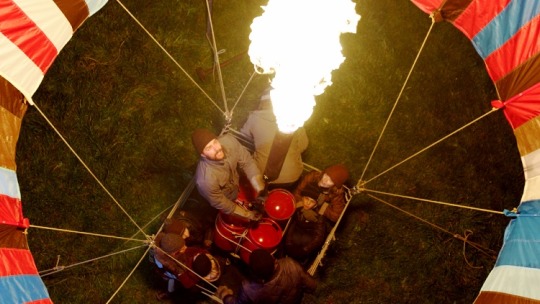
I was just going to do three featured movies this week, but a really good German thriller is finally hitting the States, opening at the Quad in New York Friday then in L.A. on March 13 before a nationwide rollout. Michael Bully Herbig’s incredibly suspenseful German thriller BALLOON (Distrib Films USA) is about two families from the GDR (aka East Germany) who try to cross over into West Germany in 1979 using a hot air balloon, over a decade before the fall of the Berlin Wall. Based on the actual events, their story previously was adapted into the Disney movie Night Crossing (which oddly, isn’t on Disney+ yet-- I checked, but it’s on Amazon Prime if you wanna compare the two movies). The movie doesn’t spend nearly as much time in the balloon as something like The Aeronauts, as the family’s first attempt fails miserably, so much of the film involves them working towards a second attempt, while trying not to be caught.
Balloon is a pretty heavy film (irony?), sometimes a little overwrought with drama but it keeps you on the edge of your seat as it cuts between the families trying to figure out their escape plan and the authorities trying to put together the clues to find these defectors. There’s a particularly amusing man in charge of the investigation, played by the always-amazing Thomas Kretschmann (The Pianist), who is constantly berating his men, something that helps lighten the otherwise heavy tone that permeates the film. This is another fairly low-key foreign film that’s worth seeking out.

Another movie people should make an effort to seek out is Rashaad Ernesto Green’s PREMATURE (IFC Films), an amazing film that follows the relationship between two young people in Harlem over the course of a summer. We first meet Zora Howard’s Ayanna as she’s hanging with her friends kibitzing about boys, as they begin their last summer before Ayanna heads to college. Shortly after, she meets Josh Boone’s Isaiah, and the two hit it off. The rest of the film follows the ups and downs of their relationship including incredibly intimate moments that lead up to Ayanna getting pregnant.
I won’t go through the plot play-by-play style, because it’s interesting to discover the twist and turns in their relationship in a similar way as we do our own relationships. Needless to say Green has a pretty amazing partner and lead in Howard, who co-wrote the screenplay, which is probably why it feels so authentic and real. Sure, there are a few scenes between Howard and Boone, both fantastic actors, that feel a bit too showy dramatically but otherwise, it’s a fantastic second feature from Green who has mainly been directing TV since his earlier film Gun Hill Road. I’ll definitely be very curious to see what Green and Howard get up to next either alone or working together.

Opening in New York and L.A. this Friday but in theaters nationwide on March 6 is the latest incarnation of Jane Austen’s novel EMMA. (Focus Features), this time starring the wonderful Anya Taylor-Joy (from The VVitchand Split/Glass) as the title character, Emma Woodhouse, a 28-year-old matchmaker who prides herself on the relationships she’s put together even while unable to find her own mate. The film follows as the latter starts coming in the way of the former as she infiltrates herself into things as an “expert on love” who can’t find it herself.
Maybe it’s not surprising that I haven’t read much of Austen’s work and have missed this one altogether, never having seen any of the other iterations, but it’s a fairly wild and witty ride. Much of that is due to the amazing and wonderful cast around the young actor, the most surprising behind Mia Goth, who is in fact three years older than Taylor-Joy, but plays the younger wide-eyed Harriet who looks up to Emma and elicits her advice. Emma basically steers Harriet from the farmer she likes to Josh O’Connor’s Mr. Elton, the wealthy local vicar who is more than a little bit of a dark. This leads to a bit of a revolving door of who is interested in whom, etc especially when Emma’s nemesis Jane Fairfax (Amber Anderson) returns to Hartfield.
Some of the other men in the mix are Johnny Flynn’s dashing George Knightley – the brother-in-law to Emma’s sister – and Callum Turner’s wealthy Frank Churchill, whose attentions lead to more misunderstandings. Both were great but I was more impressed with O’Connor who transforms into a completely other person when Emma spurns his affections and seems like a different person from the way first-time features director (and photographer) Autumn de Wilde shoots him. Of course, Bill Nighy is as great as always as Emma’s father, always feeling a slight draft, but even more impressive is the wonderfully hilarious Miranda Hart (from Spy) as Miss Bates, a woman who gabs at length about how wonderful Jane Fairfax is, much to Emma’s annoyance. As much as Emma. is Anya Taylor-Joy’s show, it’s the ensemble cast around her that makes the movie so infinitely enjoyable, getting better as it goes along.
This is a very good first feature from de Wilde, who has directed quite a number of music videos for Beck, and Emma. seems very different from the movies we normally get from video directors, much of that to do with Austen’s source material and the cast. Either way, how things develop over the course of the film makes it more enjoyable as it goes along. (Although I have never read the book, the film seems fairly faithful to the book’s Wikipedia page, so Austen fans should enjoy it, too.)
I guess we can now get to the wide and semi-wide releases and the rest of the movies – merging my two columns into one means you get more 5,000-word columns, you lucky ducks!

The higher-profile of the two new wide releases is probably CALL OF THE WILD (20thCentury Studios), a PG adaptation of Jack London’s classic novel starring Harrison Ford and the most adorable CG dog (i.e. not real, so back off PETA!) you’ve ever met named Buck! Sure, dog lovers might say, “Why would we want to watch a movie with a CG dog when clearly, a movie with actors in green suits turned into dogs using CG would suffice?” But no, it’s actually a very heavily CG movie directed by Chris Sanders, who directed Lilo & Sitch, the first How to Train Your Dragon and The Croods before giving a go at live action. (Sanders also provided quite a few voices in earlier animated films like Disney’s Mulan and Tarzan.)
A film that already was well into production when Disney bought Fox (now 20thCentury Studios), Call of the Wild also stars Omar Sy (returning for next year’s “Jurassic World” finale), Karen Gillan, Dan Stevens, Bradley Whitford but the real star of the movie is the dog Buck, which is performed by the immensely talented Terry Notary, who you’ll know for his work on the “Apes” movies with Andy Serkis, Kong: Skull Island and some of the characters in the last couple “Avengers” movies.
Of course, opening the weekend after Paramount’s Sonic the Hedgehog, which has turned out to be a bigger hit than anyone imagined, certainly won’t help The Call of the Wild.
In many ways, this reminds me of the 2002 Disney movie Snow Dogs, which opened with $17.8 million over the 4-day MLK weekend. The combination of Ford (who appears in very few movies) and the adorable dog antics might be enough for the movie to make $15 to 17 million this weekend, maybe a little more, although it only has two weeks to do business before Disney’s next Pixar movie, Onward, takes over, not giving it much time to make bank.
Mini-Review: It’s pretty evident that this exceedingly faithful take on Jack London’s book will not be for everyone. While I personally was mixed, I expect this to be one of the rare positive reviews just ‘cause. Surprisingly, it’s also the most “Disneyfied” movie that could possibly come from the newly-renamed 21stCentury Studios as it’s a movie clearly made for kids and animal lovers even if never the ‘twain shall meet, in some cases.
The story follows a large St. Bernard named Buck (portrayed by Terry Notary – but we’ll get back to that), who begins his life as the spoiled and pampered pet of a wealthy judge in California but is sold to a man who trains Buck with his club sending the dog on a wild journey across the Yukon as part of a dog sled for a pair of Canadian postal workers (played by Omar Sy and Cara Gee from “The Expanse”). Eventually, he’s paired with an alcoholic frontiersman (Harrison Ford) and he finds true love, as the two of them go off looking (and finding) gold.
Some might be surprised that director Chris Sanders (who has an extensive animation background) decided to go for straight-up CG when depicting the animals and some of the environments in Call of the Wild. In fact, it feels almost necessary to make Buck as expressive as he needs to be to carry this film, and that’s where Terry Notary (Andy Serkis’ partner-in-performance-capture from the “Apes” movies) and the CG team comes in handy. Buck is already lovable but being able to make him so expressive doesn’t hurt, and the scenes where he’s interacting with other animals are pretty amazing.
We do have to discuss the negatives, and one of them is the episodic nature of Buck’s story that means that Harrison Ford, other than the narration and a brief appearance, doesn’t play a large part in Buck’s story until about the 45-minute mark. I didn’t think much of the performances by Sy and Gee or Dan Steven and Karen Gillan as the spoiled rich people who buy Buck to drive their dog sled off to find gold. Buck’s experiences as part of the first dog sled is far more positive even though it’s rigorous and it puts him at odd with the dog pack leader. The problem is that most of the human actors don’t come close to delivering what Notary does as Buck, the exception being Ford, but it’s still one of those odd CG-live action amalgations that doesn’t always work.
If you’re fond of Jack London’s Arctic adventures (as I generally am), Call of the Wild offers as much good as it does bad, but it’s worthwhile more for the amazing vistas and terrific use of CG (and Terry Notary’s performance as Buck) than anything else.
Rating: 6.5/10
I won’t have a chance to see the horror sequel BRAHMS: THE BOY II (STXfilms), but I never got around to seeing the first movie either, although this one, starring Katie Holmes, does look kind of fun. 2020 has not been a great year for horror so far with almost a new horror every weekend and few doing particularly well – The Grudge tops the heap with just $21 million and that opened almost two months ago!
I really don’t have a lot to say about this other than the fact that the original The Boy(not to be confused with The Boy, The Boy or The Boy, which are also movies about a different “Boy”), also directed by William Brent Bell, opened in January 2016 to $10.8 million on its way to $35.8 million domestic but it also opened at a time when there were no strong horror films in theaters. Some could argue that there are still no strong horror films in theaters, especially since so many of them quickly lost theaters after bombing. Still, there have been a lot this year already and the most recent one, Blumhouse’s Fantasy Island underperformed this past weekend, so why would anyone want more?
STXfilms’ marketing has been solid even as this moved from its December release to now, but I still think it will be tough for this to make more than $10 million this weekend and probably will end up closer to $8 million or less.
Opening in limited release but also sure to be exciting to the fans of the TruTV hidden camera prank show is IMPRACTICAL JOKERS: THE MOVIE, which brings the hilarious Tenderloins comedy troop – Q, Murr, Sal and Joe -- to the big screen as they go off on a cross-country adventure to attend a party in Florida, playing their usual prank-filled games to see which three get to attend. At this writing, I have no idea how many theaters it’s opening – I’m assuming 150 to 200 maybe? – so no idea how it might do although there are already some sold out showings in my general area (NYC) where the guys are from.
Mini-Review: It feels like there need to be two reviews for this movie – one for those who already know and love the show and find the Tenderloins hysterical (this includes me) —and then one for everyone else. The former can probably skip the next paragraph.
The Tenderloins are a group of four Staten Island friends (names above) whose antics led to a successful TruTV hidden camera show where they pull pranks and challenge each other to say and do whatever they’re told. The show has run eight seasons, and it’s made the Tenderloins such big stars they regularly sell out enormous venues (like Radio City Music Hall) to perform live for their fans. Considering the success Johnny Knoxville’s “Jackass” show has had in movie theaters where it can take advantage of an R-rating, there’s little reason why the “Impractical Jokers” shouldn’t be able to do the same. (For some context, I watched this movie with a theater full of the group’s friends, crew as well as Q’s firehouse buddies, in other words, 75% of Staten Island.)
The movie, directed by Chris Henchy, long time McKay and Ferrell collaborator – the film is presented by their “Funny or Die” brand –opens with one of a number of scripted/staged scenes to frame the road trip the Tenderloins to attend a party in Miami being held by Paula Abdul. Since they only have three passes, they need to compete in their usual challenges to determine who misses out.
If you are a fan of the show, I’m not going to spoil any of the challenges or pranks they plan on each other, but they generally get better and funnier as the movie goes along, to the point that when it returns to the “story” and the scripted stuff, the movie does falter a little. Although the Tenderloins aren’t the greatest actors, they are great improvisers and you can tell when they’re coming up with lines by the seat of their pants.
The majority of the movie is basically what we see on the show without all of the commercial breaks cutting in just as things start to get outrageous, and as someone who watches more of the show than I probably should admit, I find it hard to believe no one watching the movie will at least get one good snicker out of the movie. There are a few recurring gags throughout the movie as well as a follow-up to a memorable punishment from an earlier season. (Like with the show, you’re likely to feel bad for Murr and Sal, the nicer half of the group who always get the most abuse because of it.)
If you’re already a fan of the Impractical Jokers, you’ll probably like the movie, but if not, you might not get it and there’s just no real use trying. In other words, not a great intro to the “Impractical Jokers” but a fine bit of fun for the already-converted.
Rating: 6.5/10
This week’s Top 10 should look something like this…
1. Sonic the Hedgehog (Paramount) - $29 million -50% (up $1.5 million)**
2. Call of the Wild (20th Century) - $17 million N/A (up .3 million)**
3. Harley Quinn: Birds of Prey (Warner Bros) - $9 million -48%
4. Brahms: The Boy II (STXfilms) - $7 million N/A (down .6 million)**
5. Bad Boys for Life (Sony) - $6 million -48% (down .1 million)**
6. The Photograph (Universal) – $5.5 million -55% (down .6 million)**
7. Blumhouse’s Fantasy Island (Sony) - $5.3 million -57%
8. 1917 (Universal) - $5 million -38%
9. Parasite (NEON) - $3.6 million -35%
10. Jumanji: The Next Level (Sony) - $3.3 million -42%
-- The Impractical Jokers Movie (TruTV) - $1.8 million*
-- Las Pildoras de mi Novio (Pantelion/Lionsgate) - $1.3 million*
* These last two projections are made without much info on either movie, including theater counts for the former.
**A few minor tweaks as we go into weekends with actual theater counts, although this weekend will still mostly be about Sonic the Hedgehog. I still don’t have any theater counts for Impractical Jokers on Thursday night so I guess we’ll just have to see if the theaters playing it report to Rentrak and it gets some sort of placement, presumably outside the top 10, on Sunday.
LIMITED RELEASES
There are lots of other new limited releases this weekend beyond the ones I mentioned above.

On Wednesday night, Fathom Events is releasing Masaaki Yuasa’s new movie RIDE YOUR WAVE (GKIDS) across the nation for one night only in some places, although it will get a limited release on Friday at New York’s Village East and maybe other places, as well. If you’ve seen any of Yuasa’s other films like 2017’s The Night is Short, Walk on Girl or Lu Over the Wall or Mind Game, then you can probably expect this to be another wild ride, except this time it’s on a surfboard. It follows the story of a surfer and a firefighter who fall in love. You can learn more about how to get tickets here.
Like Portrait of a Lady on Fire last week, Una director Benedict Andrews’ SEBERG (Amazon) received a one-week release in 2019 but it’s getting a legit limited release this Friday. It stars Kristen Stewart as French New Wave icon Jean Seberg who came to the States in the late ‘60s and began a relationship with civil rights leader Hakim Jamal (Anthony Mackie), putting her in the sights of the FBI who were hoping to use her to bust the Black Panthers. The film also stars Jack O’Connell, Margaret Qualley, Vince Vaughn, and Stephen Root, and it’s a pretty solid historical drama, although I haven’t seen it so long I’m not sure I can say much more about that.
I was never a huge fan of Bob Dylan or the Band but I found Daniel Roher’s doc ONCE WERE BROTHERS: ROBBIE ROBERTSON AND THE BAND (Magnolia) (about the latter) to be quite compelling as the story is told by various people who were there, including the film’s exec. producer Martin Scorsese who directed the band’s legendary concert film The Last Waltz. This is also produced by Ron Howard and Brian SGrazer of Imagine, so you know it’s gonna be a quality music doc, and it certainly is, although I’m not sure it will be of that much interest to people who aren’t already fans of The Band.
Opening in roughly 350 theaters this weekend is LAS PILDORAS DE MI NOVIO (Pantelion), translated as “My Boyfriend’s Meds,” a comedy about a woman (Sandra Echeverria) who falls for a mattress store owner who suffers from multiple personality disorder and when they go on vacation… he forgets to bring along his meds! Humor abounds. As usual, this won’t screen in advance for critics.
Tye Sheridan stars with Knives Out’s Ana De Armas in Michael Cristofer’s thriller The Night Clerk (Saban Films), Sheridan plays a hotel clerk with Asperger’s Syndrome who witnesses a murder in one of the rooms but ends up as the main suspect by the lead detective, played by John Leguizamo. The film also stars Helen Hunt and it will be released in select theaters (including New York’s Cinema Village), on demand and digitally this Friday. Just couldn’t into this one, having at least one good friend with Asperger’s, due to the way Sheridan played this often-debilitating disease. (Think Rain Man without the talent of Dustin Hoffman.)
Opening exclusively at theMetrographFriday with an expansion on March 3 is Portugese filmmaker Bruno de Almeida’s Cabaret Maxime (Giant Pictures), starring Michael Imperioli as Bennie Gaza, the owner and manager of the title nightclub specializing in a mix of burlesque, striptease, music and comedy. Bennie is fairly old-fashioned so when a modern day (translation: trashy and demeaning to women) strip club opens across the way, Bennie finds himself pressure to make changes to stay in line as he starts getting pressure from his mobster financer to change. I was kinda mixed on this movie, which delivers another typically great performance from Imperioli but the way it cuts between various acts and disparate scenes that do very little to move the story forward (including the far-more-interesting subplot about Bennie’s wife Stella, a performer suffering from depression, as played by the amazing Ana Padrão). I think one of the reasons I just couldn’t get into the movie is cause a friend of mine attempted a similar film based out of a nightclub and the film never got much traction. De Almeida should have paid more attention developing the storytelling than showing off his talented musical singing/dancing friends.
A second Portugese filmmaker, Pedro Costa, also releases a new film this week. Vitalina Varela (Grasshopper Film) will open at New York’s Film at Lincoln Center on Friday. The title of the film is also the name of the non-actor who returns from Costa’s Horse Moneyto play a woman from Cape Verdean who comes to Fontainhas for her estranged husband’s funeral and sets up a new life there.
Also opening at the Quad Friday is the latest from the Dardenne Brothers, Young Ahmed (Kino Lorber) about a 13-year-old (Idir ben Addi) who has come under the grips of radical jihadism in his Belgian town, putting him at odds with various factions. When he carries out an act of violence, he ends up in a juvenile detention facility. The Dardennes won the Best Director award at last year’s Cannes Film Festival, where their films have been honored with the Palme d’Or twice. I’ve never been much of a fan but what do I know?
Opening at the IFC Center Wednesday is Nicolas Champeaux, Gilles Porte’s documentary The State Against Mandela and the Others, which is built around recently recovered audio recordings of the 1963-4 Rivona trial in which Nelson Mandela and eight others faced death sentences for challenging Apartheid. The film mixes animation showing the trails with contemporary interviews with the survivors including Winnie Mandela, about their fight against the country’s corrupt system.
Another doc I know little about is Andrew Goldberg’s Viral: Antisemitism in Four Mutations, which will open at the Village East Friday but it includes the likes of Julianna Margulies, Tony Blair and Bill Clinton as anti-semitism rears its ugly head over 70 years after the end of World War II and the Holocaust.
Also opening at Cinema Village is Matt Ratner’s Standing Up, Falling Down (Shout! Studios) starring Billy Crystal and Ben Schwartz (the voice of Sonic the Hedgehog!), the latter playing a stand-up comic whose L.A. dreams have crashed and burned leaving him with little money, forcing him to return to Long Island. Once there, he pines over his ex (Eloise Mumford) and becomes friends with an eccentric dermatologist (Crystal) as they help each other deal with their respective failures.
Playing at the Roxy for a one-week run starting Friday is Sam De Jong’s Goldie (Film Movement), starring actress/model Slick Woods as the title character, a teenager in a family shelter pursuing her dreams of being a dancer while trying to keep her sisters together. This premiered at the Tribeca Film Festivallast year.
Oscilloscope (the distributor that brought you the cat doc Kedi) is doing something called “Cat Video Fest 2020,” which will take place at the Alamo in Brooklyn (although the Saturday screening is sold out there) and the Village East Cinema. This screening of pre-selected cat videos is also taking place at other cities throughout the country, and you can find out where right here.
REPERTORY
METROGRAPH (NYC):
This Friday, the Metrograph will debut its newest series “Climate Crisis Parabels,” a series of varied future shock films, this weekend with Robert Bresson’s The Devil, Probably (1977), Steven Spielberg’s 2001 film A.I.: Artificial Intelligence, Miyazaki’s Princess Mononoke (1999) (hosted by Naomi Klein Sunday afternoon, but also playing as part of the Playtime Family Matinees”) and Ridley Scott’s Blade Runner: The Final Cu ton Sunday night. “To Hong Kong with Love” also continues with screenings of Stanley Kwan’s Rouge (1987) and the 2016 film Raise the Umbrellas. The ongoing Welcome To Metrograph: Redux also continues with HarunFarocki’sdocumentary Before Your Eyes: Vietnam (1981). This week’s Late Nites at Metrograph is another Japanese thriller, Hiroshi Teshigahara’s 1966 thriller The Face of Another, and the Metrograph’s Japanese love continues as Playtime: Family Matinees will also show Miyazaki’s Princess Mononoke from 1999.
ALAMO DRAFTHOUSE BROOKLYN (NYC)
Tonight’s “Weird Wednesday” is Ken Russell’s 1987 film Gothic, and this week’s “Kids Camp” offering is the 2006 animated Curious George with a special “pick your own price.” In preparation for the release of Emma. On Friday, the Alamo is doing a “Champagne Cinema” screening of the 2005 Pride and Prejudice, starring Keira Knightley, which unfortunately, is sold out already. (Waugh Waugh) Monday’s “Out of Tune” is the Prince film Under the Cherry Moon from 1986, which is also sold out. (Hey, Jeremy Wein, why don’t you tell me these things are going on sale so I can go!?!) Next week’s “Terror Tuesday” is the horror classic Candyman (1992), which is ALSO almost sold out and then we’re back to “Weird Wednesday” with next week’s offering, 1985’s soft-core actioneer Gwendoline.
If you’re one of those poor souls living in L.A., you can also go to see Don Coscarelli’s 2002 film Bubba Ho-Tep, starring Bruce Campbell, on Wednesday night or the 1986 Little Shop of Horrors on Thursday at the grand, new(ish) Alamo Drafthouse Cinema Downtown Los Angeles. Saturday afternoon is a matinee of Steven Soderbergh’s Out of Sight (1998), starring George Clooney and J-Lo and Saturday night, you can see Cassavetes’ Minnie and Moskowitz (1971), starring Seymour Cassel and Gena Rowlands. Monday night is Juliet Bashore’s 1986 Kamikaze Hearts, which looked into the X-rated SF underground of the ‘80s. The West Coast “Terror Tuesday” is Francis Ford Coppola’s 1992 film Bram Stoker’s Dracula, starring Keanu Reeves, Gary Oldman and Winona Rider!
THE NEW BEVERLY (L.A.):
Wednesday’s afternoon matinee is the classical musical The Sound of Music (1965) and then Weds and Thurs night’s double feature is Robert Redford’sThe Hot Rock (1972) and Cops and Robber (1973). Friday’s matinee is the late Tony Scott’s The Hunger (1983) and then the Tarantino-pennedTrue Romance (1993, also directed by Scott), will play Friday midnight and Saturday’s midnight movie is the 1967 film Carmen, Baby. This weekend’s Kiddee Mattine is Harry Potter and the Goblet of Fire (2005). Monday’s matinee is Terrence Malick’s Badlands (1973) and the Monday night double feature is A Man for All Seasons(1966) and The Mission (1986). Tuesday’s Grindhouse double feature is 1980’s Super Fuzz and 1977’s Death Promise, both in 35mm, of course.
EGYPTIAN THEATRE (LA):
Weds’ “Black Voices” movie is William Greaves’ 1968 film Symbiopsychotaxiplasm, and then on Friday night in the Spielberg Theater, you can see the 1913 film Traffic in Souls with live music as well as a couple shorts. The Japanese horror film Kwaidan(1965) will play in the normal theater. On Saturday, the Egyptian is presenting “Leigh Whannell’s Thrill-A-thon” a series of four films that helped to inspire Leigh Whannell’s The Invisible Man, which comes out next week with some great options worth seeing, including 1987’s Fatal Attraction, David Fincher’s 2014 film Gone Girl, Rob Reiner’s Stephen King adaptation Misery(1990) and the classic Aussie thriller Dead Calm(1989) starring Nicole Kidman … all for just 15 bucks!
AERO (LA):
The AERO’s “Black Voices” film for Weds. is the great Stir Crazy, starring Gene Wilder and Richard Pryor, and then on Thursday afternoon, you can see Stanley Kubrick’s 1964 classicDr. Strangelove or: How I Learned to Stop Worrying and Love the Bomb for $8 (free to Cinemateque members!) New restoration of the Russian film Come and See (also opening at the Film Forum in New York) will play on Saturday evening as part of the “Antiwar Cinema” series. Sunday’s double feature in that series is Kubrick’s Paths of Glory (1957) and the Russian film The Ascent (1977). Tuesday’s “Black Voices” matinee is Julie Dash’s Daughters of the Dust (1991) and then Greg Proops will screen the 1996 film Ridicule as part of his Film Club podcast which precedes the film.
MOMA (NYC):
Modern Matinees: Jack Lemmon continues through the end of the month with Mister Roberts (1955) on Weds., Billly Wilder’s Avanti (1972) and the classic (and one of my all-time faves) Some Like it Hot (1959) on Friday. This weekend also sees movies in the continuing “Theater of Operations” series, which will include Kathryn Bigelow’s Oscar-winning The Hurt Locker (2009) on Saturday afternoon and a bunch of docs including Werner Herzog’s 1992 film Lessons of Darkness on Sunday. Weds also kicks off “Television Movies: Big Pictures on the Small Screen” – pretty self-explanatory, I think – with 1953’s The Trip to Bountiful and 1955’s Tosca on Weds. and Sunday, 1967’s Present Laughter Thursday and Tuesday and more. (Click on the link for full schedule!) Following Film Forum’s focus on black actresses (for February, Black History Month, get it?) MOMA begins a “It’s All in Me: Black Heroines” series with All By Myself: The Eartha Kitt Story and Julie Dash’s Illusions, both from 1982, on Thursday and many more running through March 5.
ANTHOLOGY FILM ARCHIVES (NYC):
The Anthology still has a few more films in its “Devil Probably: A Century of Satanic Panic” including Eric Weston’s Evilspeak (1981) tonight in 35mm, but also David Van Taylor will be at tonight’s screening of his 1991 film Dream Deceivers. I’ve never seen either of these, by the way. Robert Eggers’ The VVitch and Alan Parker’s Angel Heart screen one more time on Thursday night, as well. This weekend also begins a new series, “Dream Dance: The Films of Ed Emshwiller” but since I have no idea who that is, I have nothing further to add. (Sorry!)
NITEHAWK CINEMA (NYC):
Williamsburgis showing David Lynch’s 1990 film Wild at Heart as part of its “Uncaged” series on Friday just after midnight and John Singleton’s Poetic Justice on Saturday morning as part of “California Love.” They’re also showing Rob Reiner’s The Princess Bride on Saturday morning for an “All-Ages Brunch Movie.”
FILM FORUM (NYC):
Elem Klimov’s 1985 Russian drama Come and See (Janus) will have a DCP restoration premiere at the Forum and Sunday afternoon will be a screening of the 1953 Mexican film El Corazon y La Espada in 3D. This weekend’s “Film Forum Jr.” is the 1953 pseudo-doc Little Fugitive. Monday night is a screening of David Rich’s Madame X (1966) introduced by actor/playwright Charles Busch.
IFC CENTER (NYC)
This weekend’s Weekend Classics: Luis Buñuel is the Mexican film The Exterminating Angel (1962), while Waverly Midnights: Hindsight is 2020s will screen Keanu Reeves’ Johnny Mnemonic and Late Night Favorites: Winter 2020is taking a surprising weekend off.
QUAD CINEMA (NYC):
Still waiting to see if Pandora and the Flying Dutchman continues through the weekend, as at this time (Monday), there is nothing repertory listed.
BAM CINEMATEK(NYC):
Horace Jenkins’ Cane River continues through Friday. Saturday night’s “Beyond the Canon” is a double feature of Ida Lupino’s The Hitch-Hiker(1953) and Malick’s Badlands (1973).
MUSEUM OF THE MOVING IMAGE (NYC):
This weekend’s “See It Big! Outer Space” offerings include1974’s Space is the Placeon Friday and 1924’s Aelita, Queen of Mars and the 1980 Flash Gordonscreening on Saturday and Sunday. As usual, 2001: A Space Odysseywill screen on Saturday afternoon as part of the ongoing exhibition.
ROXY CINEMA(NYC)
Weds’ Nicolas Cage movie is Martin Scorsese’s Bringing Out the Dead (1999) and then Thursday is a 35mm screening of Ghost Rider: Spirit of Vengeance (2012)!
LANDMARK THEATRES NUART (LA):
Friday’s midnight movie is Who Killed Roger Rabbit (1988).
STREAMING AND CABLE
Let’s see what’s going on in the world of streaming this week, shall we?
Netflix is debuting Dee (Mudbound) Rees’ new movie THE LAST THING HE WANTED on the streaming service Friday, even though apparently, it opened in select cities last week, including New York’s Paris Theater, although it got such terrible reviewsout of Sundance, maybe Netflix didn’t want any more bad reviews before it begins streaming. Regardless, it stars Anne Hathaway, Willem Dafoe, Ben Affleck and Rosie Perez, and it’s based on Joan Didion’s novel about a D.C. journalist named Elena (Hathaway) who abandons her work on the 1984 campaign trail to run an errand for her father (Dafoe). I guess I’ll watch it when it’s on Netflix just like everyone else but my expectations have been suitably lowered.
The Jordan Peele-produced series “Hunters,” starring Al Pacino, which is about a group of Nazi hunters will hit Amazon Prime this Friday as well, and a new season of the popular series“Star Wars: The Clone Wars” will debut on Friday on Disney+, adding to the amazing amount of content already available on that network.
Next week, Saw and Insidious co-creator Leigh Whannell revamps The Invisible Man for Universal with Elisabeth Moss, and there’s also (supposedly) a movie call The Ride, which I know nothing about. You can guess which movie I’ll be focusing on.
By the way, if you read this week’s column and have read this far down, feel free to drop me some thoughts at Edward dot Douglas at Gmail dot Com or send me a note on Twitter. I love hearing from readers!
2 notes
·
View notes
Text
Four Hangout: Recap
Oh, man, I know I “owe” this one, so I’m doing it, but I hate it for about 15 different reasons, 14 of those being Ben Winston, which means I’m gonna keep this fairly short. The Four Hangout (lmao, I will never stop laughing at the attempts to team up with Google’s shitty tech) predates my entry into this fandom, so I’m not as on top of every little thing that happened around it (and my god, there were some doozies). I’ve found other posts that do a better job of transcribing some key moments), but I’m sure lots of others are out there, and as ever, I recommend taking 35 minutes to stare at this work of art for yourself.
Whenever I’ve seen gifs from this, the read is that at least two people are coming off a coke bender as we all focus on Ben’s rather ham-fisted attempt to get Louis to admit that he hates people thinking he’s gay. But in rewatching it in full now and knowing more about the context around it, the true vibe is exhaustion mixed with some very real anger/mulishness aimed at management in general and Ben in particular. Because the point of the Four Hangout isn’t to promote Four, the album, but to exonerate the D’s management team, blow smoke up Ben’s ass, and “clear the air” about whatever rumors have been going around that the D’s team doesn’t like, all posed as questions theoretically from the fans, yet weirdly management focused.
I’ve found lots of good blog posts that summarize these 35 or so minutes, but here’s an executive summary of my comments coupled with others I’ve found:
Ben Winston is an insufferable dick
The D is so fucking TIRED at this point, everyone’s low energy, but Louis’s voice is the softest, raspiest, most enchanting thing
They regularly creep on social media and are up on pretty much everything fandom related
There are no rumors they need to dismiss except that they’re currently alive, go on, ask them twice!
Liam is great at delivering the corporate spiel
Harry really did get them sneezes out
The Louis/Ben feud is one thing; the Harry/Ben feud is a whole other
Louis reads fanfic (and has some faves!)
Narry are ride or die WMYB, except for when Harry needs to have a go at Ben
Zayn has somehow made himself look even more godlike
Louis has super cute socks
With that in mind, let’s jump into some key moments, but I’m paraphrasing a lot because it’s so hard to hear over all the cross-talk, asides, and inside jokes. More under the cut!
Shout out to Louis's collarbones and quiff combo...his voice is about to give out, but he’s so OPEN and present for this total shitshow, even when he defiantly refuses to take the path he’s being guided down. Also, please @ god let me play some poker while we enjoy a bacon butty over brunch, his face as Niall introduces Ben as a “very, very good friend of ours” (me as both Ziam and Harry):

One of the most subversive things this band does is effusive praise when they’re pissed off, and never is it clearer than here, when Niall gushes on about all the wonderful work Ben has done for them, and the other boys pick up on it and start whistling and clapping (Louis: “My hero”; Harry: “LOOK AT THOSE TEETH!”) until Ben gets extremely uncomfortable.
We’re off to a good start, with Ben being sure to preface that all of these questions are from the fans, and then Harry asking Ben if he’s wearing makeup (Ben, mildly affronted, “No, I’m not wearing any makeup, but you guys do, you wear a lot of makeup, don't you, Harry” [Harry: “Tons”; Ben: “Well, you need to”]).
The first question is about the difference between this album and their first one, and it’s such a stupid, easy question that I want to answer it for Niall because I can do it in my sleep. Ben then asks Louis if he likes visiting the X Factor, if it reminds him of the old days (you know, four years ago), and AGAIN, this is a dumb-ass question, and Louis’s a pro, so what do you think he’s gonna say? (Of course he likes visiting, it’s lovely to go down and relive it). Is Harry nervous about playing there again tonight? Nope, it’s fun!! He can enjoy it this time around! Simon Cowell doesn’t give him ANY anxiety!!
The next question is about the simplicity of the old days, and my god, does my heart break for Liam saying that they had to work really hard back then, so it’s nice that four years later, they get a few more vacation days. Louis agrees, adding that the first American promo trip was a grind where they did 10 things a day (multiple interviews, signings, radio appearances, rehearsals, and shows)
Ben asks if they ever go back and watch clips of themselves from their early days (this genuinely does seem like a fan ask), and wouldn’t you know, Niall was just chillin’ out last week, rewatching all the video diaries again. Louis admits that his red trousers and braces were loud, but they worked for the time, “Or do you disagree, Ben?” (Ben: “No, I loved it.” Louis: “Thank you.”) And I wish I could travel back in time both so I could kill Hitler AND witness Ben showing up somewhere in a pair of Toms, only to be faced by Louis Tomlinson telling him that he wore that style two years ago, and he wouldn’t anymore, which Ben says cut him down to size (I highly doubt that, but I would have love to see it).
All of this fashion talk is side-winding into a question about who tells them what to wear and whether they have control over their image now. They all note that they wouldn’t have dared to push back in year one, presumably because “experts” were telling them what to do, plus it was all free (which makes all the dragging on their old looks extra fun to watch). Then Ben asks whether they make their own decisions now, and Liam says yeah as Louis smirks, lmaooooo, which morphs into, well, we have much more input than we used to have. I’m here for Harry giving a slow, long-winded answer as a construction project starts up somewhere in the studio, and Louis yells, “Keep it down” into his mic.
Ben, I mean, the fans want to know what piece of advice they’d give the fetus versions of themselves, if they could go back in time, and Louis advises his younger self to have a second glance in the mirror and see if he’s really sure about that particular outfit. (Ben: “Is that…really?” Louis: “No, Ben, I’m just trying to make a joke.”). Liam would fight the haircuts, and Harry would burn the supras (I’m assuming; Louis: “They were outrageous”). Zayn would tell his younger self to have a bit more fun, to try and take it all in and enjoy it more. :(
“The fans” are curious about the negative side of social media, how the D just exploded on YouTube and Twitter after X Factor, and does it ever go too far? Liam channels my inbox and says that people forget there’s a person on the other side of an anon message, that these guys see all the things that are said about them, and they’re self-conscious with cameras and comments, but it’s okay, they put up with it. Louis’s addicted to Twitter, and says that there are negative people there, but you’ll find negative people on every social media platform and in real life, too, it is what it is.
Of course, “the fans” are curious about how all this social media shit affects their girlfriends, and I would kill to hear more about what Narry, the two singles on this couch, keep giggling about in this ridick convo that I’m not even gonna bother to sum up.
Ben’s curious how the fans always manage to leak everything the band does, and yes, Louis, tell us more! How does it make you feel? Liam thinks it’s anticlimactic, Niall’s only beef is when something is leaked a week before it’s out, and everyone else just gets annoyed if it breaks the structure of a rollout, but nobody talks about songs that are leaked that were never meant for official release (cough cough, "Home”), and Harry’s just happy people get a sneak peek and then still buy the album, so all is good. Me as this exchange: Ben, incredulously, “It’s amazing they’re able to constantly do it”; Liam: “Lots of high-tech people out there.”
Probably my favorite part of this is the fanfic discussion, which kicks off with Ben’s “I've noticed, not that I’ve read it, but there's been a lot of fanfiction published about you boys, books published, have you any read it?”

Zayn avoids it at all costs, but Louis’s aware of a fic writer’s book deal (who????) and says that he’s come across some of it on twitter (!!!). He finds some of it utterly bizarre (looking at you, self-inserts), but he’s read some nice little stories, and he’s seen some that go very deep and very, very weird. Liam acknowledges that it’s a whole different world, that he gets the idea of it, of fans putting themselves in situations with them (and Jesus Christ, it kills me that they’ve had to read self-insert wattpad fics), but some of it blows his mind. Niall doesn’t know where to go looking for it, but don’t worry friend, Ben’s gonna hook you up with his favorites! Harry is noticeably quiet during ALL of this.
With a horrible segue, Ben says, “Speaking of things that are made up, what’s the biggest rumor you’ve heard about yourself, this is a question lots of fans are asking” (SURE THING), and Harry never gets enough credit for his dry delivery, such as the way he says, “We’ve all been dead a couple of times.” But Ben can’t let it go, and that’s when Louis does his whole, “No”….dramatic pause (he might be saying “Go,” but the point is, he lets this bit drop where it lands). Zayn jumps in with the rumor that Niall used to be a jockey, and god bless him, honestly.
Ben realizes he’s not getting anywhere with this, so it’s time to move on to the actual album, why is it called Four, etc. It’s not really all that interesting, tbh, nor is the name they didn’t go with as a band (Liam’s dad’s suggestion, which was USP, if you’re curious). Liam figures USP will flourish one day, and this whole section proves how funny Liam actually is. I’m curious about all the One Direction tribute bands they’re mentioning, and I’m totally down to check one out if they’re ever in my area, just fwiw.
Anyway, moving on! What song are they most proud of? Zayn loves “Where Do Broken Hearts Go,” and Louis is WAY into “Fireproof,” which Liam’s down with, too. The part that’s interesting gets glossed over because Ben’s an idiot, but they talk about how many songs they’ve written that don’t make it to the album, like, Liam has a tattoo that says “somewhere is a place that nobody knows” from a song we’ll never hear called “Man on a Mission,” and how many others are stored in this vault (23 or 24 were in the final running for this album, where are they)? Harry suggests those songs will be on USP’s first album, and I will absolutely buy it. His story about the Norway bus trip makes me want to dig deep (he was on a party bus in Norway and heard one of their songs, sung by them, that had never been released anywhere, and he was the only one who knew it).
Zayn hints a bit at what happens (voting), and Liam hints at all the meetings, but I would love to know so much more about this process, especially since Niall says that lots of people are in these meetings, with lots of opinions (Simon, label, other managers).
Ben says that another recurring question is about what “Stockholm Syndrome” means, and I love the Alex Turner-esque dodge we get on Harry literally describing what Stockholm Syndrome means, without any real insight into what the song’s about. Still, I live in the awkward that happens right after this drops, with Ben still somehow trying to get them to admit they don’t feel trapped, lmao:

Ben asks about which songs are about specific people, and god, I don’t care because all of this section is lies. Then he tries to get them to talk about songs they don’t like, and they aren’t here for that, like, Liam will say he can’t casually listen to WMYB, but he loves performing it, and the best part of this is Harry saying he’ll crank that song and mouth along, pretending that he’s Niall.
For their favorite songs, Liam goes with “Fireproof,” Louis goes with “Midnight Memories,” Niall goes with “Where Do Broken Hearts Go,” Zayn can’t pick one, and Harry says “Best Song Ever.” Ben likes “Through the Dark” because of course he does, and that’s when the needling from Harry starts about “Gotta Be You,” and I don’t understand, but I live for him on the attack, so geddit, son (also, Niall, with his “your boyfriend’s back, and you’re gonna be in trouble,” etc., YES).
Another question Ben kept getting from fans (got it!) is what would be the one thing they’d change in the past four years, and Louis starts with, “Why would you want to? It’s been great, there’s no point.” Liam agrees, and that’s that. Ben’s next question is what moment they’d relive in the past four years, and Niall says he was really nervous at MSG, although Zayn thinks it was a great gig BECAUSE they were nervous. Nothing’s really happening here, so Ben asks Harry what’s going on with his hair (I guess “the fans” want to know?), and Harry just says it tends to grow, that’s what hair does, and he’s letting it all hang out.
Another “fan” question that makes me laugh from Ben: “Who makes the decisions in One Direction? Is it always your call?” And they all say NO, but Liam jumps in with, “It’s totally us, people ask us now, ultimately we call the shots,” and there’s a LOT of back-chatter here, so draw what you see.
Ben tries to push how much they love the “Night Changes,” video, and AGAIN, Harry gets on his case about “Gotta Be You,” and someone else covers it better than I ever could, but this goading by Harry is wonderful. Ben’s creative process for video concepts is fascinating because he basically admits that it’s easy or it’s really hard (read: he steals it or just throws a shitty idea to a wall to see if it sticks).
Ben asks if they get nervous about people liking the album, and Louis says they care if critics like the album or not, but really, he’s out there on twitter searching different song titles to see the fan reaction. This is also when we learn they aren’t on ye olde social meeds that much anymore, but they all enjoy a good old-fashioned creep session (Zayn especially). Harry’s comment about feeling vulnerable when you release something you’ve been working on for a year feels especially poignant—he gets excited and nervous all at once—and I really don’t get this whole controlled leak promo thing they did for Four, but who am I to question Modest or Syco?? All I want to know is what Niall’s talking about on the side.
78 notes
·
View notes